WITH
3x ACM Award Winner TRACY LAWRENCE + ACM Award Winner MIDLAND + Independent Artist DREW BALDRIDGE

WITH
3x ACM Award Winner TRACY LAWRENCE + ACM Award Winner MIDLAND + Independent Artist DREW BALDRIDGE
ACM Triple Crown Recipient Reflects on a Whirlwind Year
ACM HONORS RETURNS TO NASHVILLE a Q&A WITH ACM LIFT EVERY VOICE HONOREE
SHANNON SANDERS a REMEMBERING KRIS KRISTOFFERSON



Generation after generation and mile after mile, Prevost has proven that industry-leading comfort, performance, style and technology can only come from one place: Experience. Since 1924, we have built a legacy of quality, constant improvement, safety and sustainability for everyone who calls the road home-including the performers and crews of the entertainment industry. We have designed for the future while refining what's brought us to where we are today, to create the ultimate touring motorcoach. This is what inspires us to set new standards of excellence. And it's what guides us as we look to the road ahead.
For more information, contact:
Steve Zeigler
Vice President.
Prevost Shell
Division
(800) 837-0895
prevostcar.com



An
The
52 | Q&A’S
Hear from ‘90s icon Tracy Lawrence, Bakersfield-style trio Midland, and hitmaker Drew Baldridge
66 | ADVOCATING INCLUSION
ACM Lift Every Voice honoree Shannon Sanders on fostering an equitable Country Music community for all
68 | REMEMBERING KRIS KRISTOFFERSON
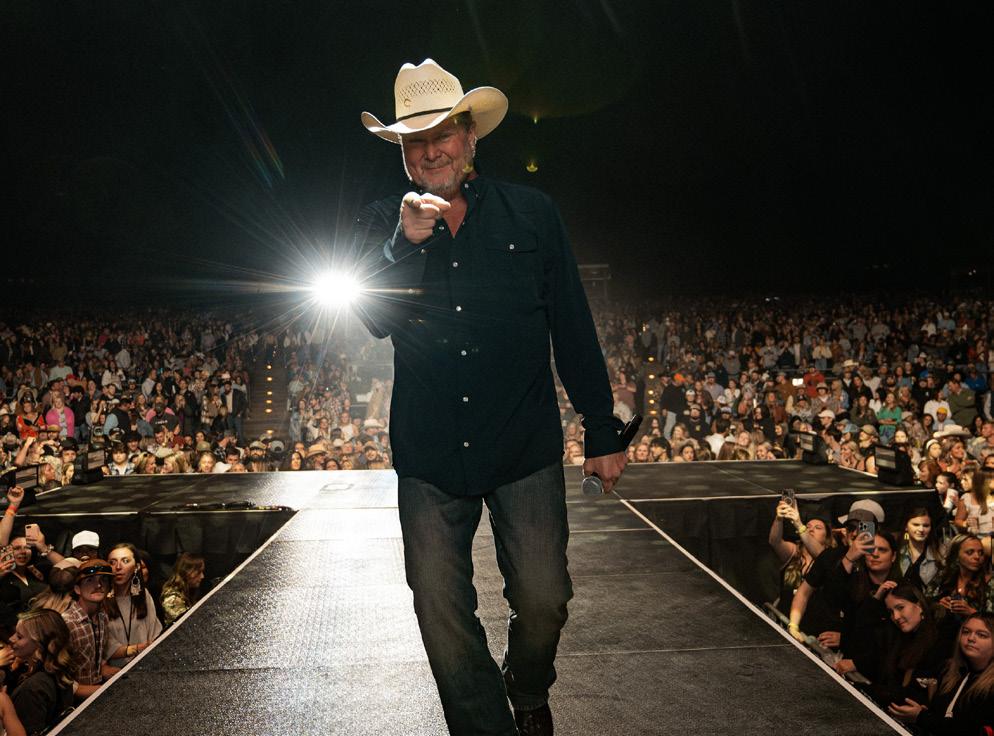
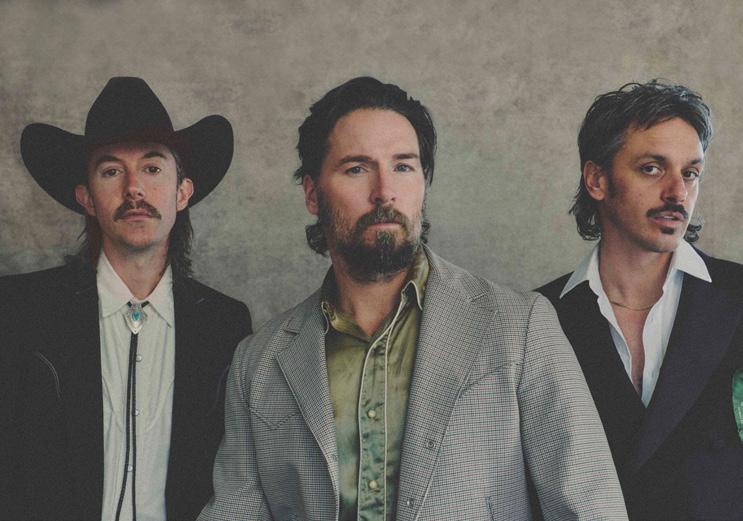
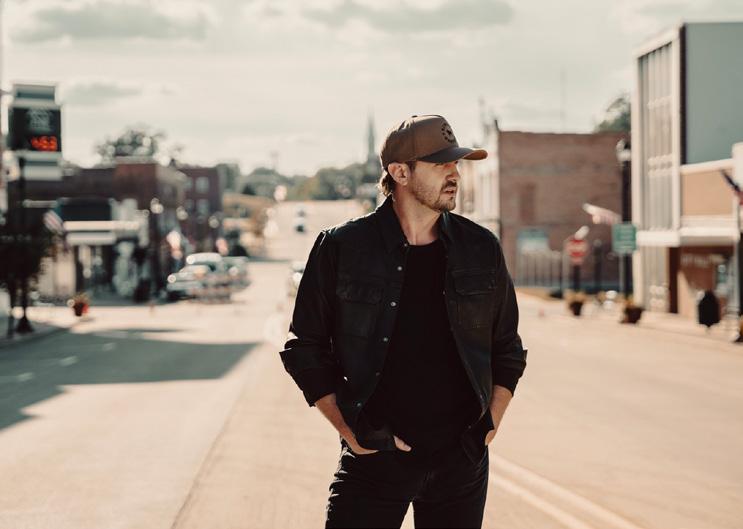
s we near the end of the year, it’s easy to overlook all the great things that have happened in Country Music over these past 10 months — not just for us at the Academy of Country Music®, but for the entire genre. We’ve seen remarkable growth, with boundaries that seem endless, and the sentiment that “Country’s cool again” has been almost religiously echoed.
This resurgence has been a long time coming, and it’s no accident. With artists from other genres, like Beyoncé and Post Malone, stepping into the Country Music spotlight, it’s safe to say the circle is expanding.
Lainey Wilson, the ACM Triple Crown and ACM Milestone Award recipient, graces the cover, and sums it up best when she says, “Nowadays, Country Music can just mean so many different things. But at the end of the day, it’s still all rooted in storytelling and making people feel at home and comfortable and welcome.” Hear more from Wilson on P. 20.
The same spirit could be found at ACM Honors™, where we celebrated some longtime legends in this industry like Alan Jackson and Luke Bryan, while also recognizing some trailblazers who have begun their ascent to stardom like Lainey Wilson. Read the recap on P. 26.
In this issue, we also hear from artists who have paved their own unique paths in Country Music, including ’90s superstar Tracy Lawrence (P. 62), Country-Western band Midland (P. 52), and independent artist Drew Baldridge (P. 56).
Country Music can, and should, be for everyone, but it starts with more than just the artists. It starts with us. So, let’s continue to keep it cool by spreading and sharing Country Music with the masses.
E ditor
Libby Gardner
A ssistA nt E ditor
Brittany Uhniat
C ontributors
Tricia Despres, Lydia Farthing, Craig Shelburne
d E sign
Randi Karabin Creative
Printing
Graphic Visions Commercial Printing
Photos
ACM, Erick Frost, Annelise Loughead, Katie Kauss, Riley Mays, Caylee Robillard, Harper Smith
ACADEMY STAFF:
CEo
Damon Whiteside
E
Lyndsay Cruz E
Gil Beverly
Tommy Moore
vi
Ben Carter
s
Kris Reyes
d
Matt Brum-Taylor
d ir EC tor/P ub L i C ity & M E di A r ELAtions
Jesse Knutson
d ir EC tor/ b r A nd M A rk E ting , C r EAtiv E & C ont E nt str At Egy, A nd Produ C tion
Steve Mekler
d ir EC tor/ i ndustry r ELAtions & AwA rds
Haley Montgomery
s E nior M A n Ag E r/C o MM uni CAtions
A nd str At Egi C i niti Ativ E s
Lexi Cothran
s E nior M A n Ag E r/Ev E nts
Jennifer Davis
s E nior M A n Ag E r/C ont E nt A nd E ditori AL
Libby Gardner
s E nior M A n Ag E r/ACM L ifting L iv E s
Taylor Wolf
M A n Ag E r/Progr AMM ing & C o MM unity E ng Ag EME nt
Kortney Toney
M A n Ag E r/C r EAtiv E & C ont E nt Produ C tion
Brittany Uhniat
C oordin Ator/Ev E nts
Alexis Bingham
C oordin Ator/ s o C i AL M E di A
Katie Casserly
C oordin Ator/ fin A n CE A nd o PE r Ations
Kendra Williams
A ssistA nt/ACM L ifting L iv E s

Cheers, Libby Gardner
ACM Tempo Editor
Brooke Boyd
A ssistA nt/M A rk E ting
Heather Howard
A ssistA nt/ i ndustry r ELAtions & AwA rds
Delaney Loughran
E x EC utiv E A ssistA nt to th E CEo Kristan Pridgen
M A n Ag E r/o ffi CE
Michael Stern
i nt E rns : Kennedy Brady: Media Archives
Kylyn Healy: Events
Karson Leighton: Finance and Operations
Gianna Thomas: Creative & Content Production


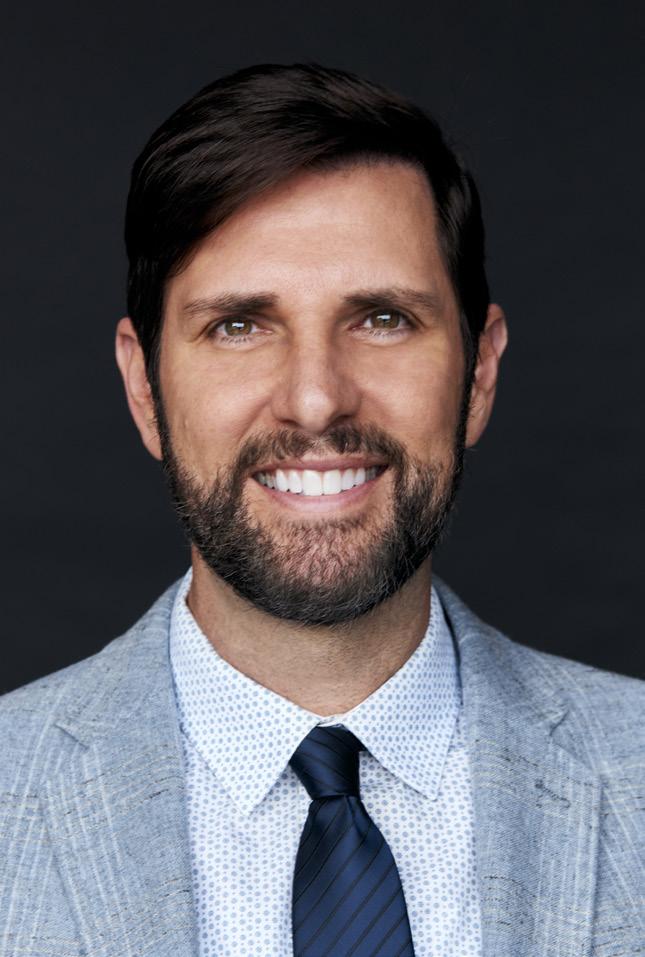
As we wrap up summer at the Academy and look forward to the holiday season, we have a lot to reflect on and be proud of over the past few months. The 59th ACM Awards is still being streamed on Prime Video, and the 17th ACM Honors is available on demand on Merit+.
This year’s ACM Honors, hosted by Carly Pearce and Jordan Davis, and with Studio Recording and Industry Awards presenter Tyler Hubbard, was one of the most poignant and memorable shows yet. On behalf of the ACM Staff, congratulations to all our esteemed Studio Recording and Industry Award winners as well as our Special Award honorees. I’m so thrilled we were able to share this night with both national and international audiences.
The night captured the essence of the Country Music industry — its creativity, community, and collaboration. From musical icons like Alan Jackson and Trisha Yearwood to legendary songwriters like Walt Aldridge to renowned music executives like Tony Brown to philanthropic heroes like Luke Bryan to genre-expanding leaders like Shannon Sanders, this is a show for everyone. It was also exciting to see our newer superstars recognized, like our cover story artist, Lainey Wilson, who earned the ACM Milestone Award and joined the exclusive ACM Triple Crown club with her recent Entertainer of the Year win at the 59th ACM Awards® making her only the 10th artist in history to achieve this feat. We are thrilled for her and her astounding and well-deserved success.
The Academy’s 2025 Membership application and renewal period is just about to close, and we are excited to welcome back all our returning Members as well as our new Members! The Academy is for all of you, and we continue to build programming, resources, and opportunities for our members, including the ability to vote in the coveted ACM Awards. This upcoming year will be a landmark one as we celebrate the 60th ACM Awards. We have special content and activities planned all year long, and we look forward to you celebrating along with us! Thank you for your membership and support of YOUR organization, the Academy of Country Music.
With appreciation,

Damon Whiteside Chief Executive Officer


The ACM and BMI Nashville partnered for a showcase featuring Hispanic/Latino artists to celebrate Hispanic Heritage Month. Co-hosted by three-time GRAMMY-winning producer and BMI Executive Director, Creative, Shannon Sanders and Jackie Martinez Marushka, founder of Hispanic Entertainment Alliance and CEO of Marushka Media, this intimate, inaugural event featured artists including MŌRIAH, Alejandro Sierra, Ana Cristina Cash, and Matt Castillo.
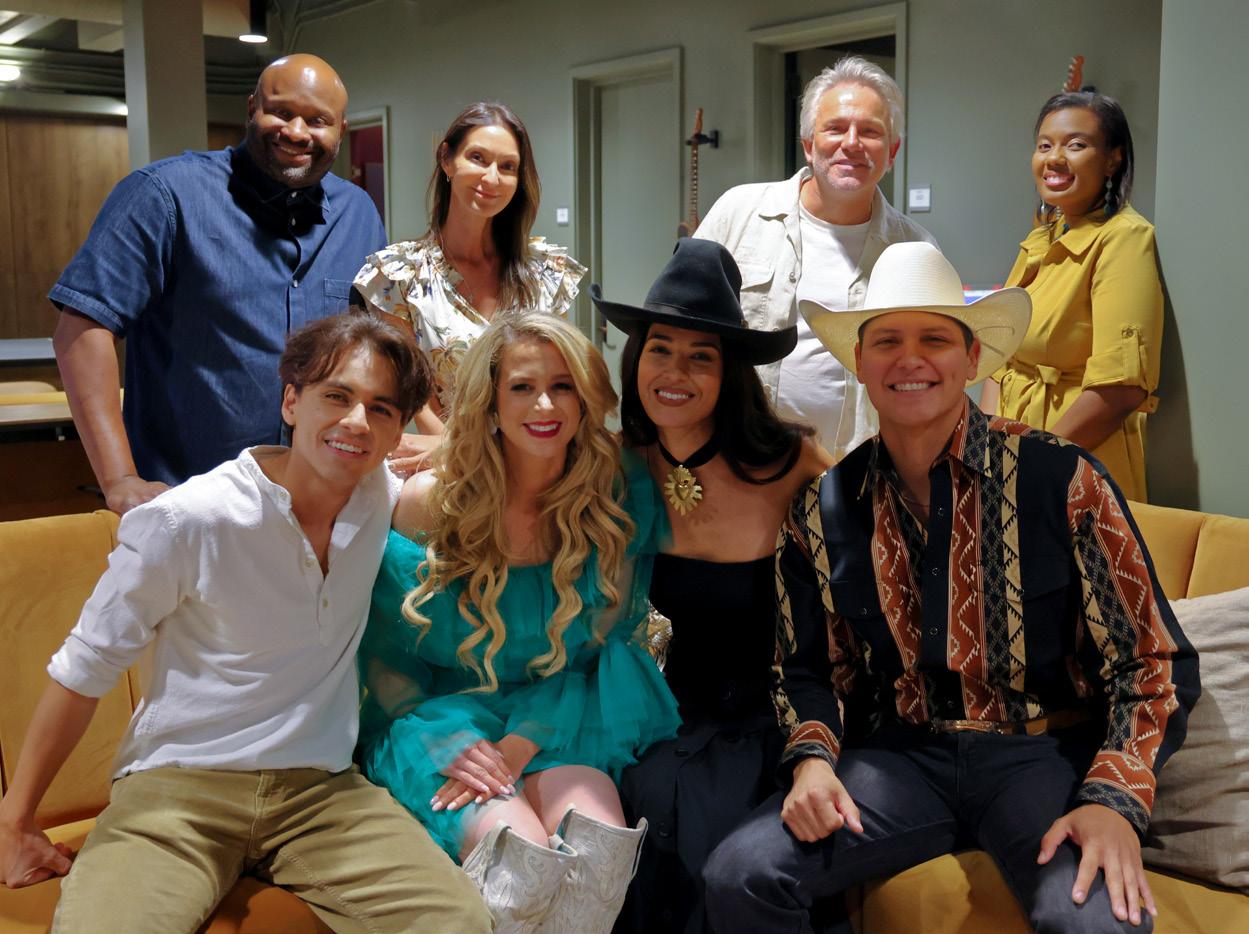
The 17th ACM Honors made its debut on Merit Street on September 24. This marked the first time the special aired on the network as part of a larger partnership between Merit Street Media and the ACM. In addition to ACM Honors this year, the Academy and Merit Street plan to explore programming development opportunities around Country Music performances, behind-the-scenes and lifestyle moments, documentaries, and other content.
This year’s ACM Honors recognized several special honorees, including ACM Lifting Lives Award recipient Luke Bryan, ACM Poet’s Award recipient Alan Jackson, ACM Triple Crown recipient Lainey Wilson, ACM Icon Award recipient Trisha Yearwood, and more. Read the recap on P. 26.
IT’S TIME TO RENEW YOUR MEMBERSHIP!
The window to become a Member or renew membership for the ACM leading into the landmark 60th year of the ACM Awards is now open and runs through Friday, November 15. You can submit an application for ACM Membership online and must do so during this membership window to qualify to obtain or maintain voting eligibility for the 60th ACM Awards in 2025. Additionally, accepted and active Academy Members gain access to a suite of benefits including early access to tickets for ACM events, discounts on industry partner events, industry data insights, monthly educational and networking events, and more.
For more information and to apply, visit acmcountry.com/become-amember.


The 2024 LEVel Up Cohort has been busy with their monthly programming. Their August session covered video and lighting production and was led by veteran industry heavyweights and ACM Board Members, Scott Scovill (CEO, MooTV) and Chris Lisle (CEO, CLLD LLC). They were joined by Brandi Simms (Director of Strategic Development at Moo TV, Moo Creative, The Steel Mill) to discuss their vast careers and accomplishments in the industry.
In September, the cohort participated in a special workshop session with Cristi Williams (Shading the Limelight Owner/Founder) and Britton Copeland, NLP, M.P. (Wellness Coach).
For more than 15 years, Shading the Limelight has pioneered the industry’s approach to preventive and proactive mental and emotional wellness. Their mission is to equip artists, entertainers, and industry executives with the necessary tools and skills to maintain emotional stability, prevent dysregulation and derailment, and manage the industry’s extreme highs and lows. The workshop gave the cohort the tools and information necessary to live in alignment with their core values in a personal and professional space. Learn more at shadingthelimelight.com.

ACM Lifting Lives® continues to extend its mental health initiatives with the launch of the ACM Lifting Lives Hope Line. Launched in October on World Mental Health Day, this concierge call line will offer immediate support and access to mental health assistance for all those working in the Country Music industry nationwide.
The ACM Lifting Lives Hope Line joins several existing resources provided by ACM Lifting Lives, including the organization’s notable emergency relief fund, which is available year-round and provides financial assistance to those in the Country Music industry experiencing sudden and unforeseen financial hardships for a multitude of reasons.
For more information, visit acmliftinglives.org/help.

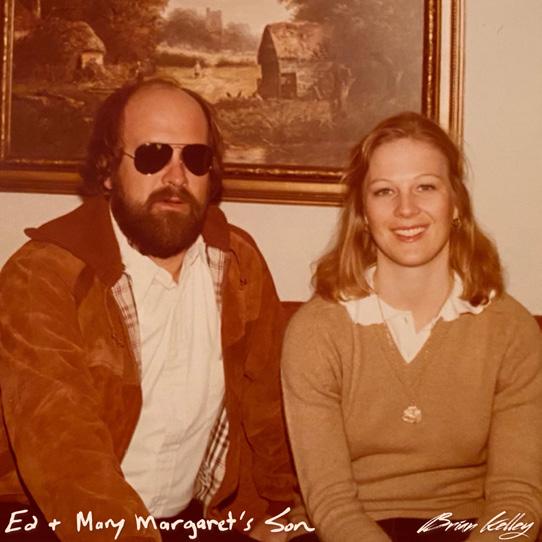
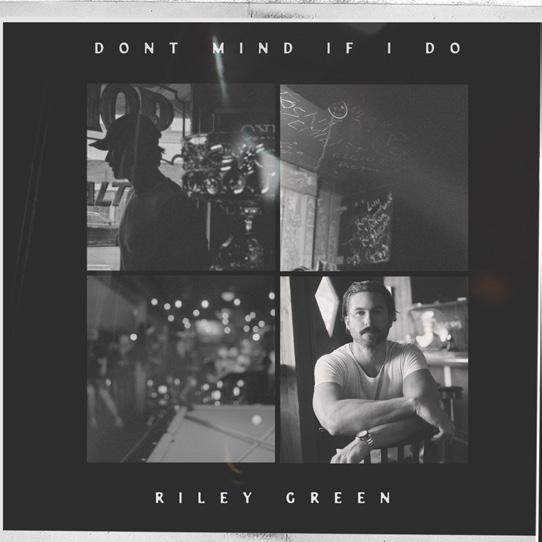
Riley Green
Don’t Mind If I Do OUT NOW
Brian Kelley
Ed & Mary
Margaret’s Son OUT NOW
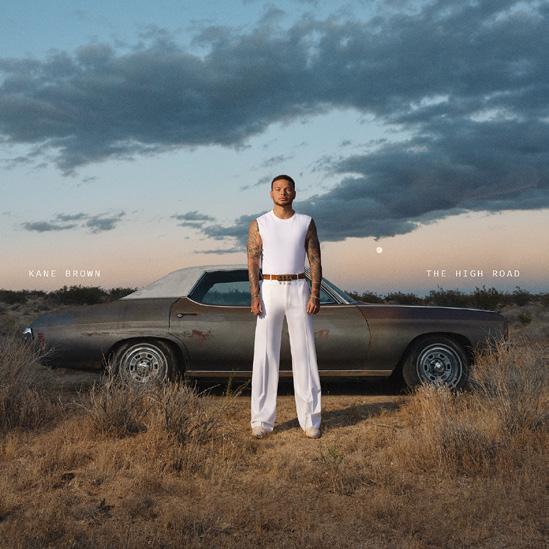

Kane Brown
The High Road
January 24, 2025
Megan Moroney

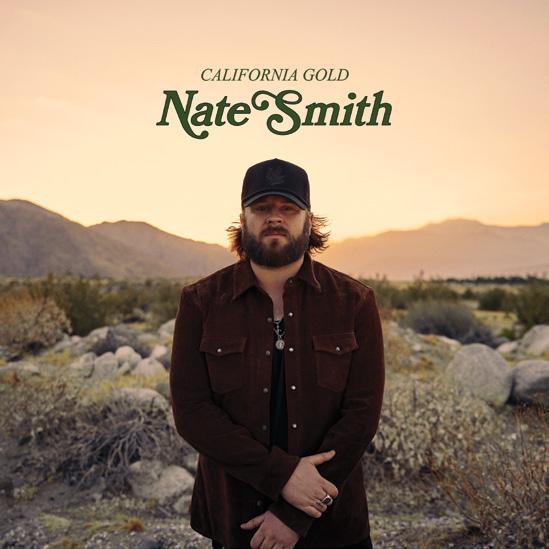

Am I Okay? (I’ll Be Fine) Limited Edition Deluxe OUT NOW
Reba McEntire Keep On Loving You (15th Anniversary Edition)
December 6
Nate Smith
California Gold OUT NOW
Anne Wilson
REBEL (Live From Lexington) OUT NOW
Hailey Benedict
“Things My Mama Says” OUT NOW
Priscilla Block
“He’s My Man“ OUT NOW
Mackenzie Carpenter “Boots On (Acoustic)”
November 15
Kashus Culpepper “Out Of My Mind” OUT NOW
“Would If I Could” OUT NOW
Dylan Gossett
“Tree Birds” OUT NOW
Ryan Hurd
“This Party Sucks” OUT NOW
LECADE
“Liquor and Cigarettes” November 1




Chase McDaniel “Made It This Far” OUT NOW
MacKenzie Porter featuring Owen Riegling
“Coming Home To You (Bigger Houses)” OUT NOW
Morgan Wallen “Love Somebody” OUT NOW
Jake Worthington featuring Miranda Lambert
“Hello Shitty Day” OUT NOW
Brett Young “Kiss to Forget” OUT NOW
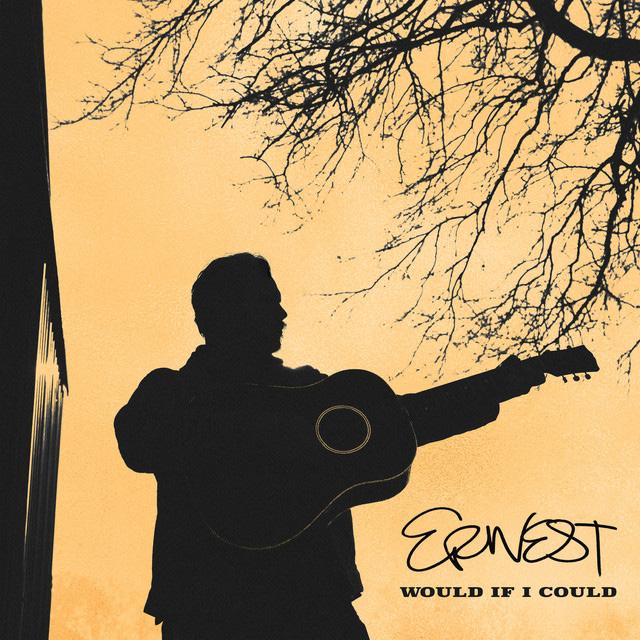
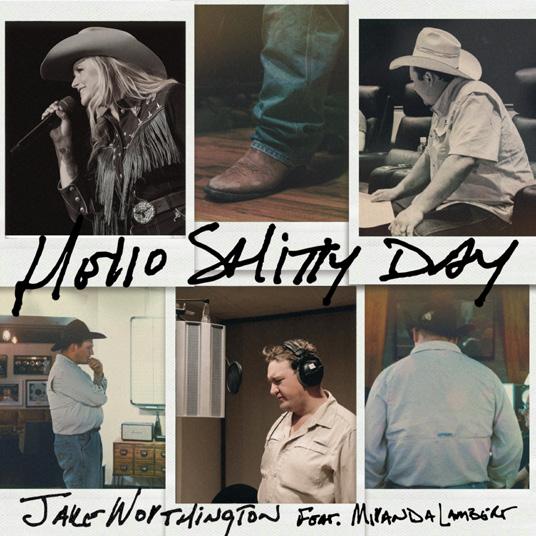
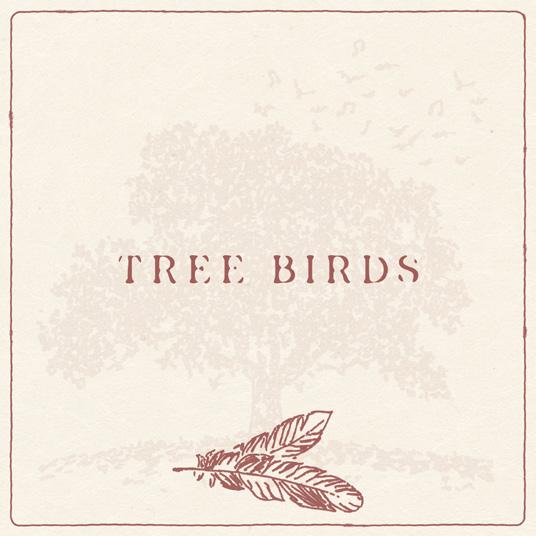

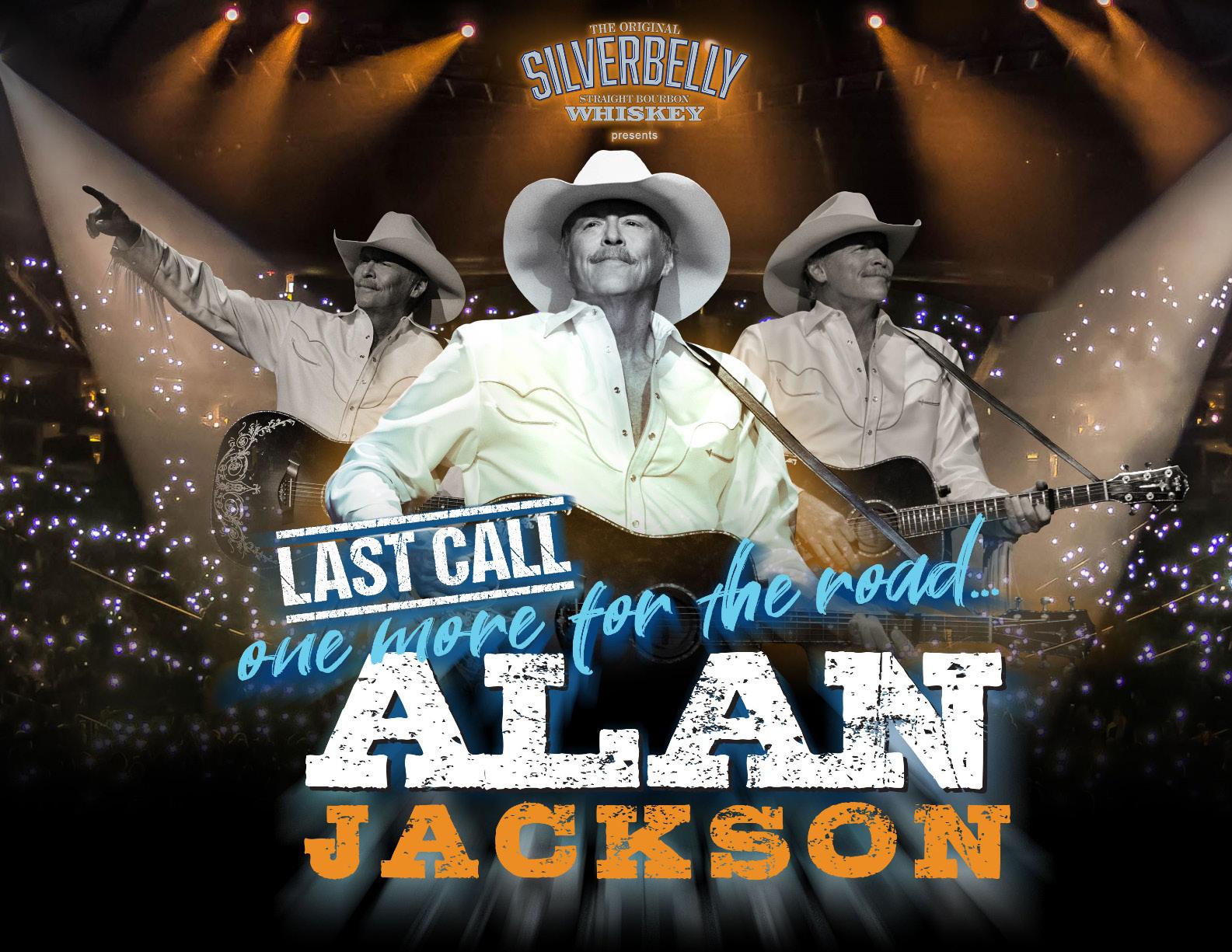
Priscilla Block
Direct Support for Jon Pardi’s
Mr. Saturday Night Tour
Now–November 2
Brothers Osborne
Might As Well Be Us Headline Tour
October 27–April 25
Jordan Davis
Direct Support for Luke Combs’ World Tour
January 17–February 8, 2025
Jackson Dean
Direct Support for Lainey Wilson’s Country’s Cool Again Tour
Now–November 8
Carter Faith
Direct Support for Luke Grimes’ Playin’ On The Tracks Tour
November 11–December 13
Riley Green
Damn Country Music Tour
March 27–August 23, 2025
Luke Grimes
Playin’ On The Tracks Headline Tour
November 11–December 14
Mickey Guyton
CMT On Tour Presents: Mickey Guyton
Now–November 9
Tyler Hubbard
STRONG World Headliner Tour
Now–November 21
Alan Jackson
Last Call: One More For The Road Tour
October 26–May 17, 2025
Chris Janson
Whatcha See Is Whatcha Get Tour
Now–November 23
Little Big Town Take Me Home
Headline Tour
October 24–December 13
Vincent Mason
Direct Support for Gavin Adcock’s Actin’ Up Again Tour
January 17–April 13, 2025
Maddie & Tae
Love & Light Headline Tour
April 10–May 15, 2025
Parker McCollum
Burn It Down Headline Tour
Now–October 26
Midland Get Lucky Tour
Now–December 20
Kacey Musgraves
Deeper Well World Headline Tour
November 6–December 7
Jon Pardi
Mr. Saturday Night Headline Tour
Now–November 2
Carly Pearce the hummingbird world tour Now–May 16, 2025
Rascal Flatts
Life Is A Highway Tour
February 13–April 5, 2025
Thomas Rhett Better In Boots Tour
June 5–September 26, 2025
Josh Ross
Single Again Headline Tour
Now–November 9
Conner Smith
The Storyteller Tour
October 8–December 7
Chris Stapleton
All American Road Show Headline Tour
Now–March 8, 2025
Josh Turner
The Greatest Hits Headline Tour
October 24–May 31, 2025
Keith Urban
High and Alive
Headline Tour
Now–August 28, 2025
Tucker Wetmore
Waves on a Sunset Headline Tour
Now–November 16
Direct Support for Thomas Rhett’s Better In Boots Tour
June 5–September 26, 2025
Anne Wilson
The REBEL Tour
Now–November 17
Brett Young Headline Tour
Now–November 16
If you are an ACM Member and would like your artists’ upcoming releases and tours featured in the next issue of ACM Tempo , please email brittany@acmcountry.com.


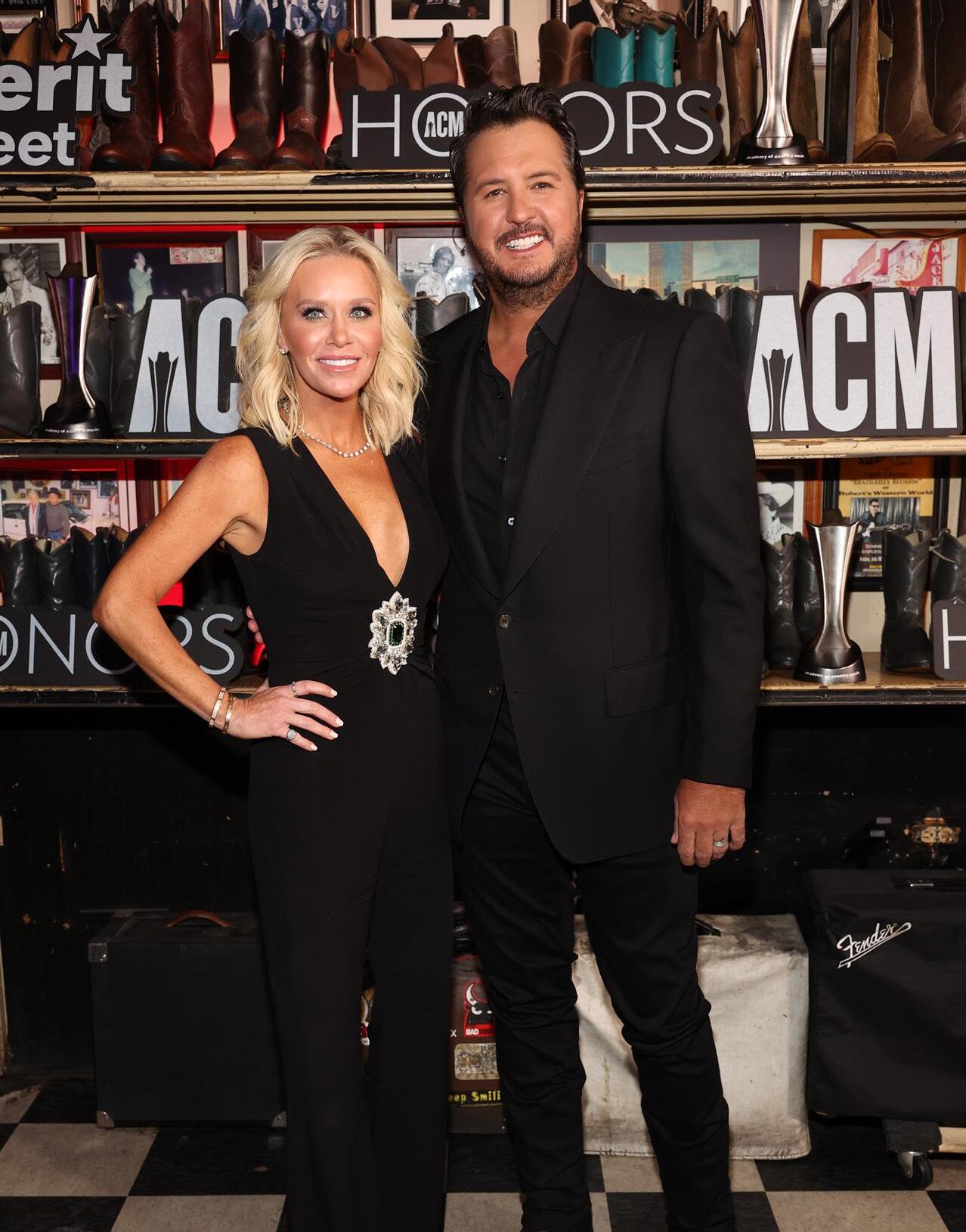
If the ACM Honors red carpet looked a little different this year, it's because it was. Honorees, performers, presenters, and more hit Robert's Western World on Broadway in Nashville, Tennessee dressed in style before the big night. The People photo studio was a huge hit, shot upstairs in Robert's by renowned photographer Katie Kauss.



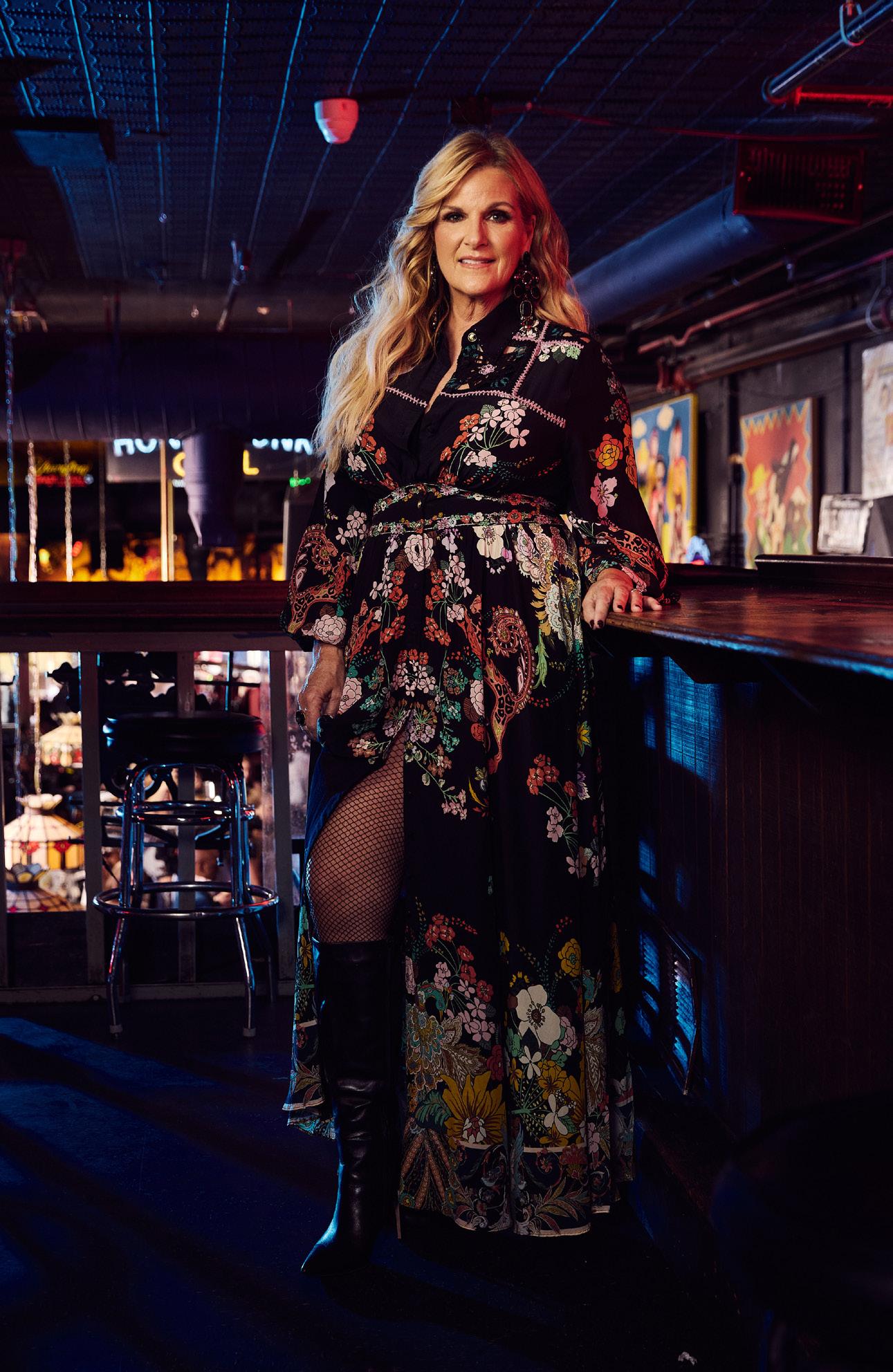

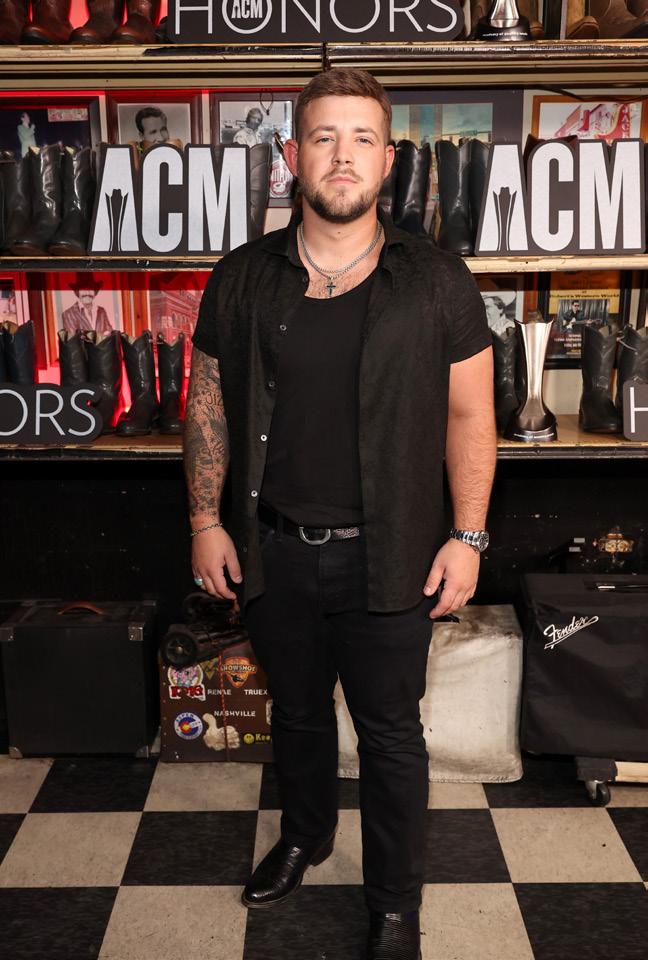


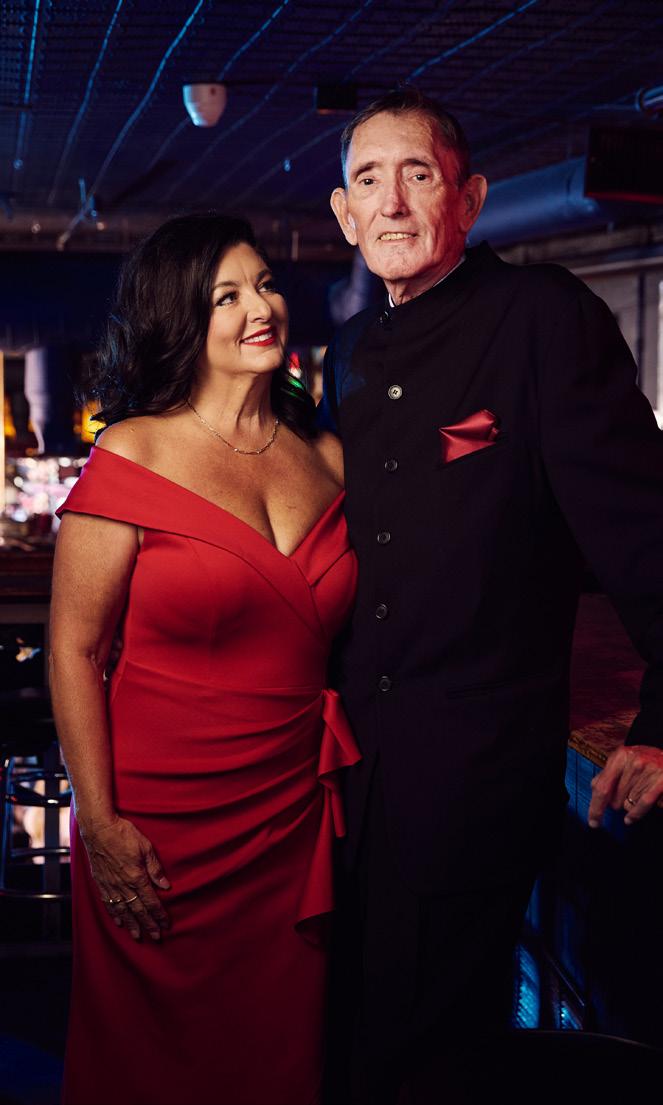











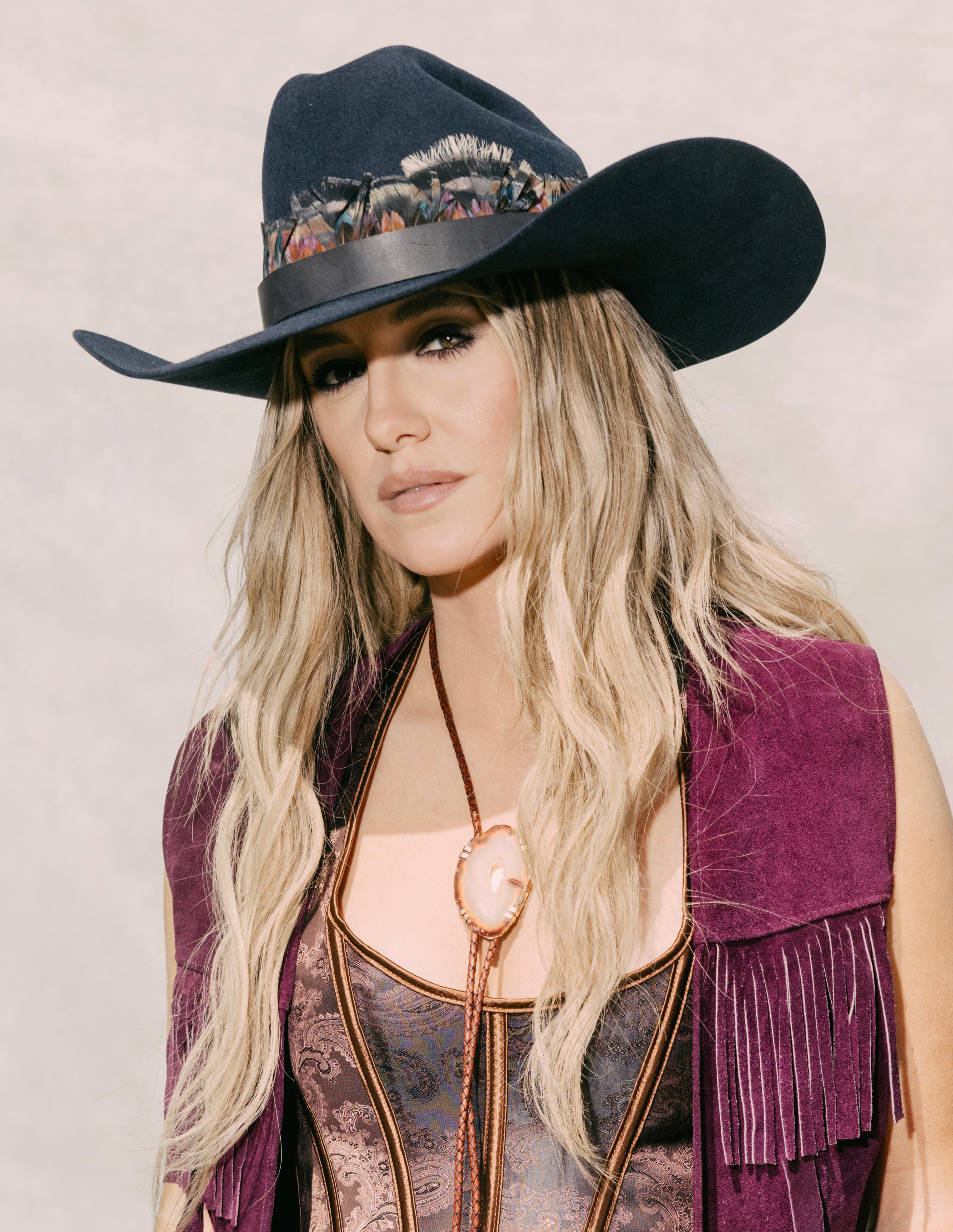

ACM Triple Crown Award recipient Lainey Wilson has found a place in and made her mark on a genre she’s always called home
BY LIBBY GARDNER
“
Not long ago, somebody asked me, ‘Can you believe it? Can you believe everything that’s happening?’” Lainey Wilson shared.
One might be quick to assume that Wilson just blew up overnight — and although these past three years have been quite the “Whirlwind ” (hence the name of her latest album) for the 12-time ACM Award recipient, she’s nowhere near a newcomer. She’ll be the first to tell you, as a 10-year towner, she’s put in the work.
“The truth is, in a weird kind of way, I can [believe it], because for a long time I was the only one that did. But I will tell you, I think it’s hard for me to wrap my head around the fact that we have done so much in a short amount of time. In the grand scheme of things, I’ve been at this my whole life. I’ve been living in Nashville for 13 years, but the past three, I feel like we have gotten to experience more than most people get to do in a whole lifetime. And it’s a lot, but it is in the best kind of way. I feel like I’m like right where I’m supposed to be.”

“There’s been moments where I was like, ‘Man, I wish this would happen a lot sooner ...’ But the truth is, I think I just needed to live a little bit more life to tell the kind of stories that I needed to tell to connect with my fans.”

Wilson has truly cemented herself into this genre. Talk to just about anyone in the Country Music industry about its growth and trajectory, and you’re bound to hear her name. This past August, Lainey was celebrated at ACM Honors amongst some of Country Music’s legends, receiving the ACM Triple Crown Award, after qualifying for the trophy in just three years when she was named ACM Entertainer of the Year in May, and the ACM Milestone Award for her monumental success this past year.
“It’s really strange for me to look around the room and realize that a lot of these people that I can’t believe I’m even in the same building as, have become my friends and people that I can call and go to and get advice from,” Wilson recalled about the night.
Wilson’s certainly learned from her heroes, but she’s also learned a lot over the years in the hustle — her hustle. In some ways, her journey might seem familiar, as she’s not Nashville’s first 10-year towner. Yet, from this quintessential dream, this success story, she’s created something unique.
“There’s been moments where I was like, ‘Man, I wish this would happen a lot sooner ...’ But the truth is, I think I just needed to live a little bit more life to tell the kind of stories that I needed to tell to connect with my fans.”
From the beginning, Wilson’s music has painted pictures of her truth. She credits her small town of 180 people, Baskin, Louisiana, for teaching her how to craft compelling stories. As she puts it, “Country Music is more than just a genre, it’s a way of life.” And while we might not know that exact same small-town lifestyle that peeks through in her music, we find familiarity in her detailed stories of love lost and love found, searching for freedom, and finding peace in religion.
“Whirlwind just kind of felt like it was those songs that helped me keep one foot on the ground during a time of my life that was constantly changing.”

Although her previous albums all centered around specific themes: Bell Bottom Country on songs that made Lainey, “Lainey” and Sayin’ What I’m Thinkin’ on songs of her deepest thoughts, the inspiration for Whirlwind was quite simple; she just “had to live it.”
“I ended up working on this record [ Whirlwind ] before Bell Bottom Country even came out,” said Wilson. “I had this collection of songs, and I knew that it was sharing a part of me that I had not shared with people before, because I had found it along the way. It was exciting for me to share songs about love and mean it ... Whirlwind just kind of felt like it was those songs that helped me keep one foot on the ground during a time of my life that was constantly changing.”
We dove deep into two of the 14 songs off Whirlwind , all of which Wilson co-wrote, which is by no means rare for her. She’s co-written every song across all four of her studio albums. I selfishly had to hear about my personal favorite, “Middle Of It,” written by Wilson, Trannie Anderson, and Dallas Wilson. It’s a song, at first listen, that felt like Wilson was speaking right to me. It happens to be one of her favorites, too, and one she never thought she’d share with the world.
“I kind of thought me and my buddies were just writing it to write it, and we were just going to set it up on a shelf, and that was what it was going to be,” Wilson remarked. “It was just another song to get us to the next one. The more that I played the song for people and opened up the floor to have a discussion just about life, the more I realized that everybody’s got something they feel like they are smack dab in the middle of, whether it is school or a marriage or any kind of relationship or any kind of heartache. Whatever it is, it’s that feeling of being able to zoom out and try to put your finger on where you started

and where you’re going to end up. But you can never really do that. You can try to all you want, but the truth is, that’s the beauty of it all.”
The album’s final track is a heavy one. “Whiskey Colored Crayon,” co-written by Wilson with Josh Kear and Wyatt McCubbin, juxtaposes a nostalgic, lullaby-like sound that evokes memories of childhood with a narrative centered on adult struggles, specifically addiction.
“The idea came from a word exercise that Josh Kear likes to do like every morning,” Wilson explained. “Before he writes music, he’ll write a random list of things, and he might write a list of things that he loves and a list of things that he hates and pair the words together. He ended up coming up with Whiskey Colored Crayon, and then we developed the story around it. I’m from a family of teachers. My mom is a teacher. My daddy even taught for a minute. Just from being around that kind of stuff, I know how important teachers are to kids and how they play such an important, vital role in a lot of their kids’ lives. And, for me, as we were writing it, it felt like a little bit of a ‘teacher appreciation’ song too, by just shining a light on something that happens behind closed doors. We wanted to give this story as much color as we possibly could. I wanted it to feel like you could see that sheet of paper and that little boy drawing those pictures. And when I think about story songs, the ones that I grew up listening to, like “Whiskey Lullaby,” I felt like I could see every little thing, even if it took you to a dark place for a minute. I felt like I could put myself there. Writing the song made me remember why I fell in love with Country Music to begin with.”
And as Wilson talked about how proud she is to be a part of this genre, a genre she loves, especially with where it’s headed, she reminisced on a conversation with her mom, one of her biggest supporters over these past 13 years.
“It’s so crazy because back in 2020 my mama said, ‘I’m telling you, in a few years from now, Country Music is gonna have a moment and you’re going to be a part of it.’ And it just feels good, especially because I feel like there’s a little something for everybody. Everybody looks different, sounds different, comes from different places. And nowadays, Country Music can just mean so many different things. But at the end of the day, it’s still all rooted in storytelling and making people feel at home and comfortable and welcome, and that’s the way Country Music has always made me feel.”
It’s clear from her music that Lainey doesn’t keep that feeling all to herself, but she does even more in

“...I think it’s important to make sure that you are passing along that wisdom. Don’t just keep it all close to your chest. You got to share it.”

sharing it with this next generation of strong, confident women. Each night on her “Country’s Cool Again” tour, she crowns a young lady, “Cowgirl of the Night.”
“My mama always encouraged me to be nice to myself, and it doesn’t mean that I always have,” Wilson recalled as part of the inspiration for the celebration. “And even at times when I’m on stage and I’m having these little girls recite, ‘I’m beautiful, I’m smart, I’m talented, I’m godly, I can do anything,’ for me, it’s also a reminder. You got to speak it and believe it and receive it from your mouth to God’s ears. I really am a firm believer in that. There’s been so much wisdom that has been shared with me ... I think it’s important to make sure that you are passing along that wisdom. Don’t just keep it all close to your chest. You got to share it.”
As an artist who spends a lot of time in the spotlight, to be able to continue sharing herself with the world, she needs a reset every now and then. Her family and friends seem to be the backbone of keeping her grounded.
“The things that make me feel like Lainey, the sister, the friend, the daughter, the dog mom, or the girlfriend, so whether that means a FaceTime with my nephews and hearing them making fun of me on the other line or chasing my dog around the yard or going for a ride with my boyfriend around the farm. Any of those things make me feel like they know me, like they really, really know me — the one with no makeup, and the girl who hasn’t brushed her hair all day long. It’s important to have those days so I can fill my cup to pour out. You can’t keep pouring from an empty cup.”
It may be “happening” for Wilson, but even if it weren’t, as she puts it, “When it comes to making music, it’s really the only thing I know how to do and so even if it wasn’t going the way that I wanted it to, I would still be doing it. That’s just the truth.”
But we’ll keep making sure your cup is full, Lainey. ●


BY CRAIG SHELBURNE

Through music, laughter, and inspiration, the 17th ACM Honors highlighted the community of artists, songwriters, musicians, and industry leaders who made an extraordinary impact on Country Music over the past 12 months. Luke Bryan, Alan Jackson, Lainey Wilson, and Trisha Yearwood were among the honorees taking the stage at the all-star event, held August 21 at Ryman Auditorium in Nashville.
Wilson collected one of Country Music’s most elite honors, the ACM Triple Crown Award, from special guest and “Nosedive” duet partner Post Malone. The distinction recognizes her ACM Award wins in the New Female Artist, Female Artist, and Entertainer of the Year categories. She offered a thoughtful acceptance speech after a performance of “Hang Tight Honey” by Terri Clark and a congratulatory video message from Dolly Parton.
In her speech, Wilson spoke about her early years in Nashville, when she lived in a camper van after moving from her tiny hometown of Baskin, Louisiana. She recounted her career milestones along the way and an important shift in her perspective after her early achievements. “I started to realize that maybe I don’t have so many people to prove wrong anymore. Maybe it’s about proving people right, who have given me opportunities and chances,” she noted.

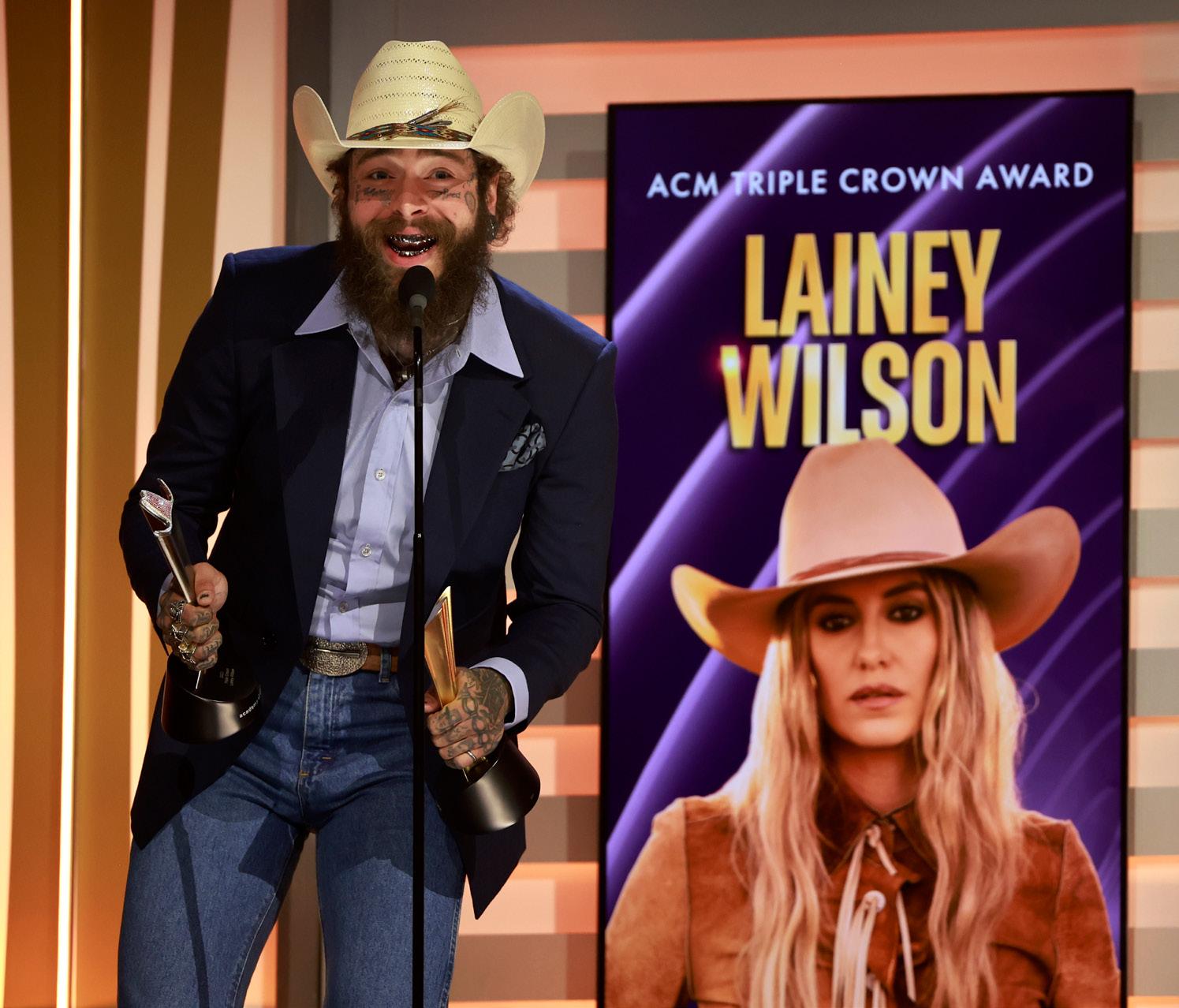


One of the trademarks of an ACM Honors show is putting songwriters in the spotlight. This year, audiences were treated to Country hits written by Walt Aldridge, Jessie Jo Dillon, Alan Jackson, and Chris Stapleton, as well as touching acceptance speeches from all four composers.
Dillon accepted her award for ACM Songwriter of the Year from her friend Brandy Clark, following Keith Urban’s stunning stripped-down performance of his recent No. 1 hit “MESSED UP AS ME ” co-written by Dillon. Dillon, whose father is songwriter Dean Dillon, thanked her friends and colleagues on Music Row. “You inspire me every single day, and I am so lucky to know and collaborate with each and every single one of you. It is special that we strive to cut to the heart of the matter and make real music for real people,” she said.
As the recipient of the ACM Artist-Songwriter of the Year, Stapleton submitted a video message personally thanking Jamey Johnson, who performed “Whiskey and You.” Stapleton observed, “I’ve always considered myself a songwriter first, and so to get an award like this is very meaningful. But it’s also meaningful that tonight, one of my favorite songwriters is there playing one of my songs.”
Aldridge and Jackson accepted their prestigious ACM Poet’s awards near the end of the evening. Kameron Marlowe sang Aldridge’s “Modern Day Bonnie and Clyde,” an up-tempo hit for Travis Tritt in 2002. Aldridge graciously acknowledged the support of the music industry, adding, “I know you share in this award, and I am so grateful to all of you, and especially the Country Music fans. You’ve been the best boss that anybody could have had for 50 years.”
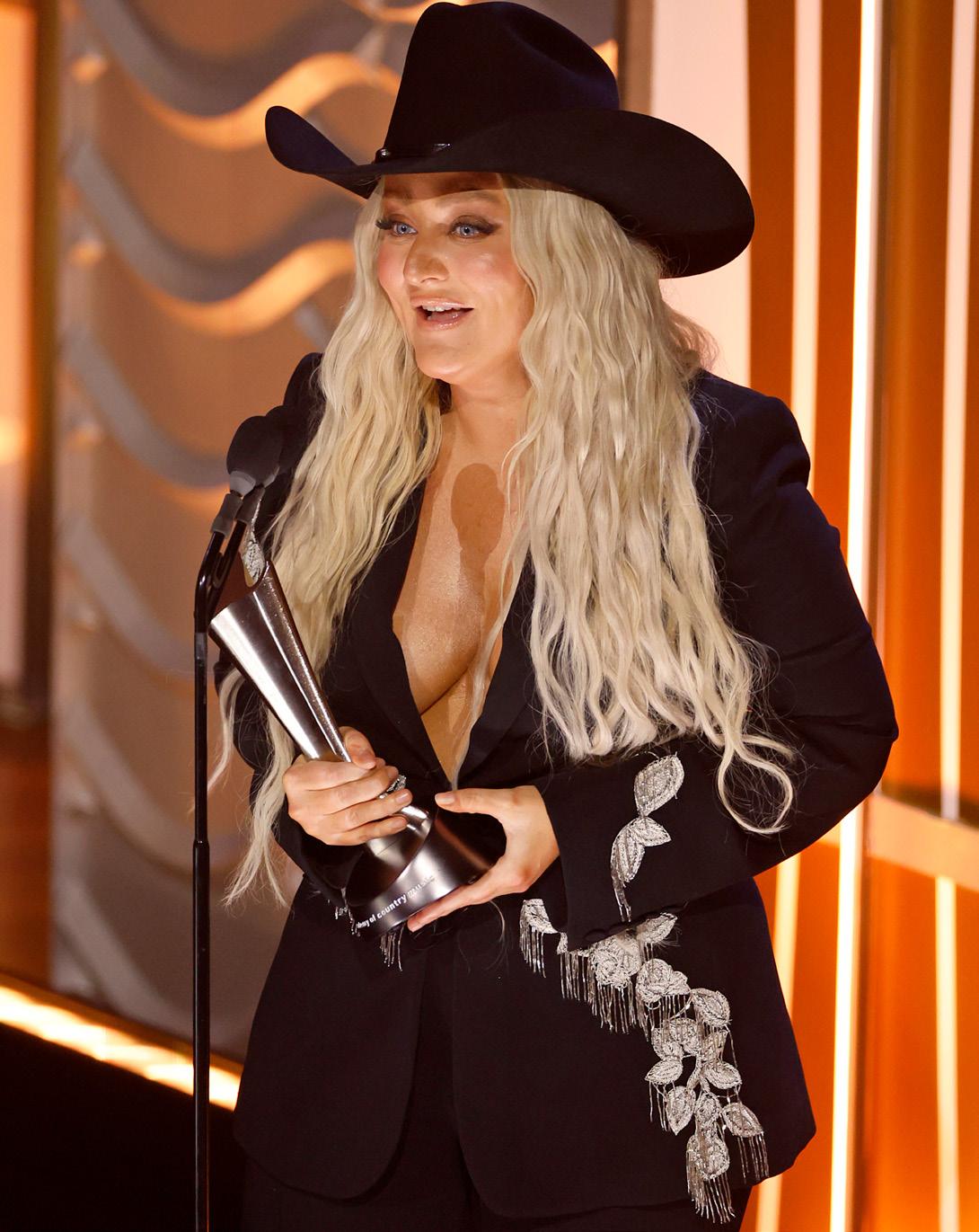
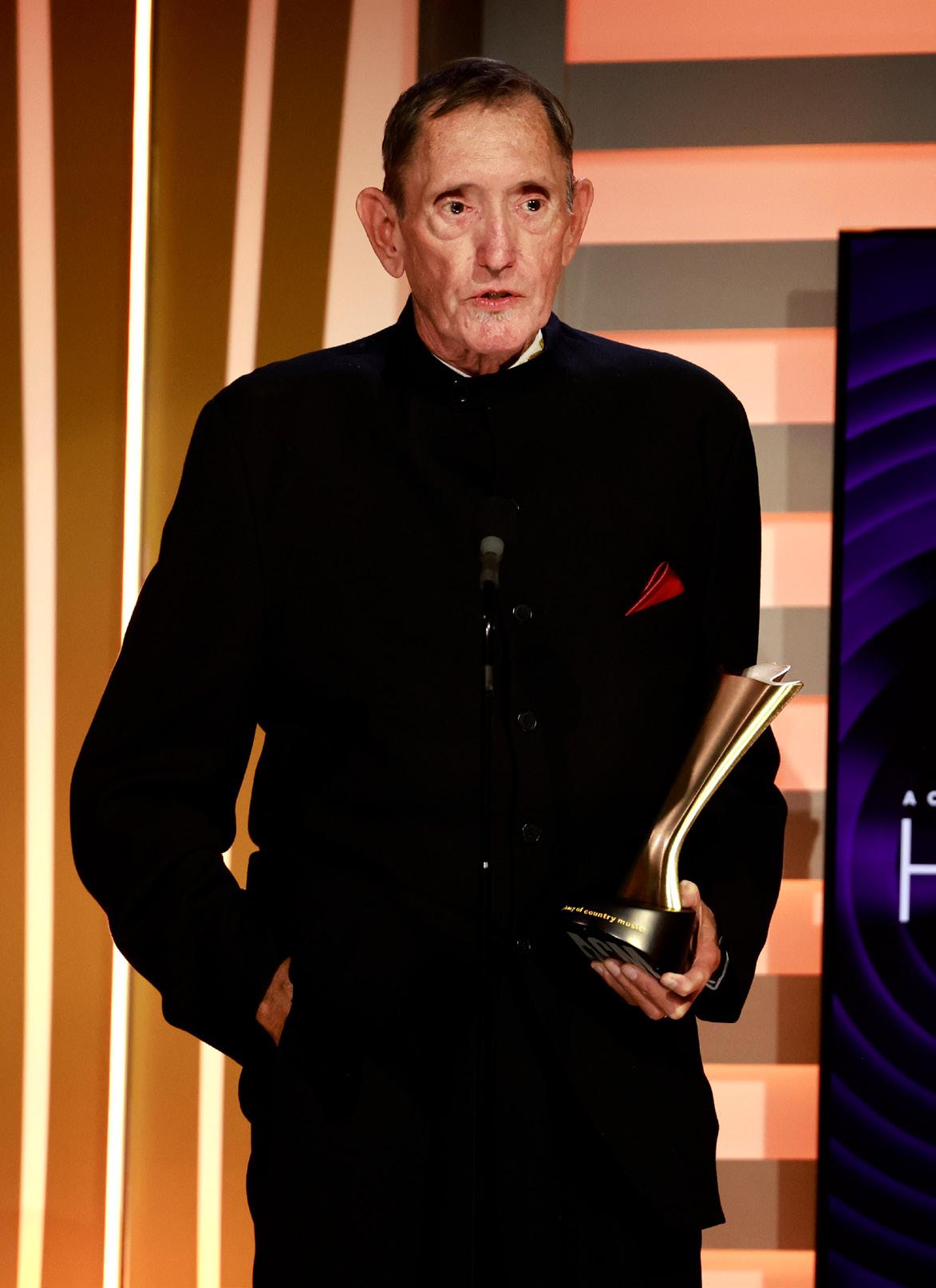





Eric Church dazzled the audience with a reimagined rendition of Jackson’s 1990 classic, “Chasin’ That Neon Rainbow.” Jackson told the audience that he wrote the song early in his career, after telling his co-writer Jim McBride about a radio that his father won in a contest. “I realized a long time ago that life gives you a lot of ingredients for songwriting, and that typically makes the best songs. I’ve been fortunate to pull a lot of stuff from my life and turn it into music over the years,” Jackson said, just before dedicating the award to his father.
A performance of Jackson’s feel-good hits, “Chattahoochee” and “Don’t Rock the Jukebox” opened the show, performed by ACM Honors co-hosts Carly Pearce and Jordan Davis. Other legends honored on the Ryman stage throughout the night included ACM Icon Award recipients Tony Brown and Trisha Yearwood and three-time ACM Entertainer of the Year Luke Bryan.
Tony Brown’s exceptional career as a producer was commemorated by a performance of “When I Call Your Name,” a 1989 hit produced by Brown and recorded by Vince Gill. Ashley McBryde stepped in with Patty Loveless’ beautiful harmony part from the original recording, while George Strait submitted a video message congratulating his friend and producer. Brown offered a quick anecdote recounting a late-night exchange in a grocery store parking lot, where somebody shouted at him, “Back in the day, you were really good!” After eliciting laughter from the crowd, Brown concluded his remarks by stating, “Hey, man, if you’re here tonight, you’re right!”

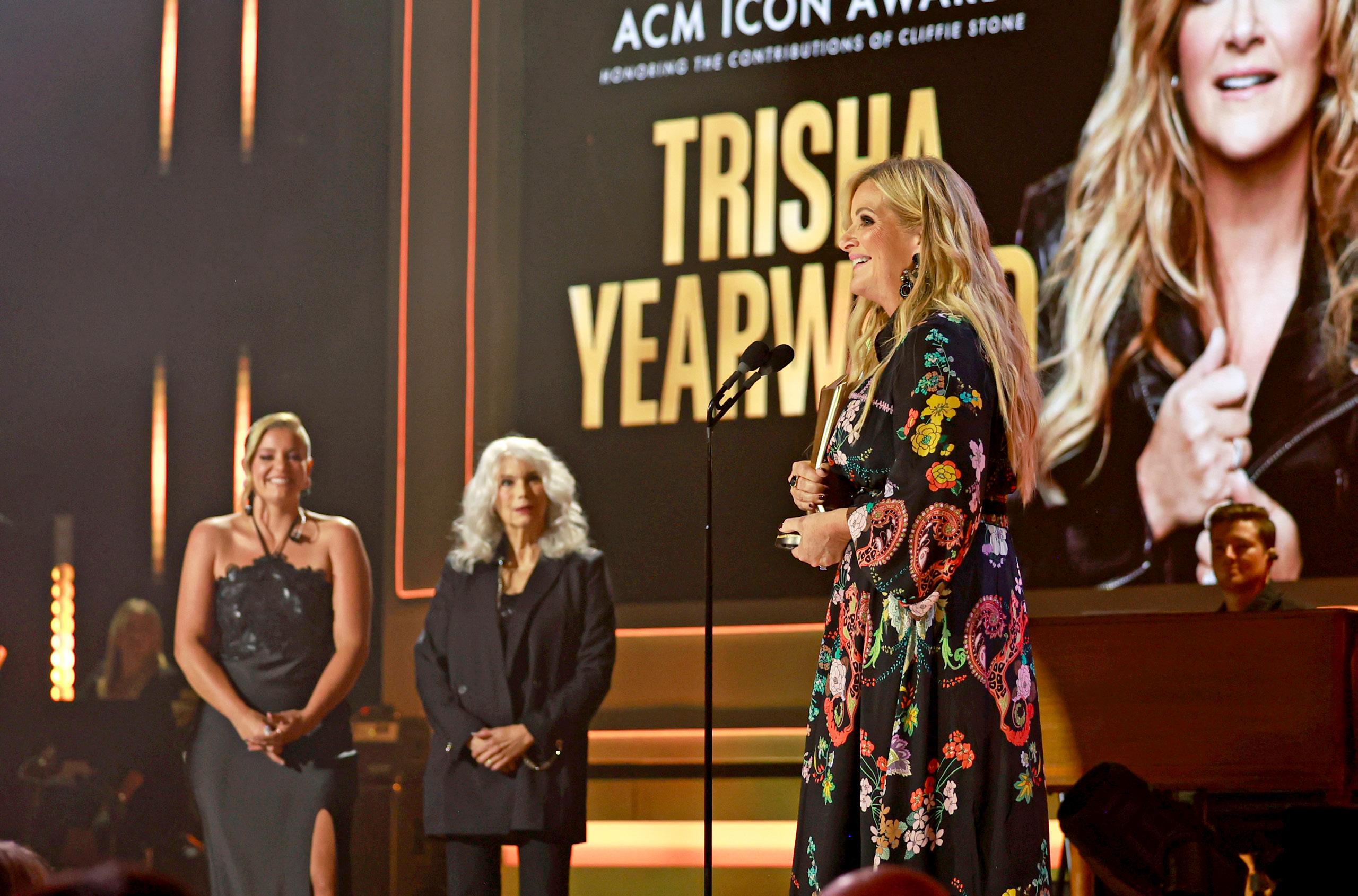
Trisha Yearwood savored the moment as two of her close friends, Lauren Alaina and Emmylou Harris, sang “The Song Remembers When” together. Overwhelmed and trying not to cry, Yearwood thanked her fans in the crowd and her husband, Garth Brooks, for “the grandest adventure of my life.” She also told the story of meeting Tony Brown on the night of her label showcase. As a key executive at MCA Nashville at the time, Brown approached Yearwood and her parents on the sidewalk in front of the venue, Douglas Corner Cafe, and simply told her, “Let’s do this.” Yearwood recalled, “I realized in that moment that I was going to have the chance. I had no idea how it would turn out, but I knew I was going to have that opportunity to be a part of this amazing family of Country Music. And that’s all I ever wanted to be.”

Luke Bryan beamed as Jason Aldean serenaded the crowd with “Someone Else Calling You Baby,” one of Bryan’s first hits. Aldean then welcomed Bryan to the stage to accept the ACM Lifting Lives Award, honoring his devotion to charitable initiatives. Bryan is well-known for his philanthropic endeavors, including his annual Farm Tour that funds scholarships for agricultural students. In his remarks, Bryan enthusiastically praised his wife, Caroline, and his management team for their encouragement and dedication to charitable work. “The heart of Country Music, the beauty of Country Music, is the people,” he said, “and I’m so blessed to be a part of this industry where, everywhere you look, people go the extra mile to help and do things.”
Joking around with the audience, he added, “I’m just honored to have this. It’s like winning an award for, as my parents said, ‘just doing what you ought to be damn doing,’ right?”


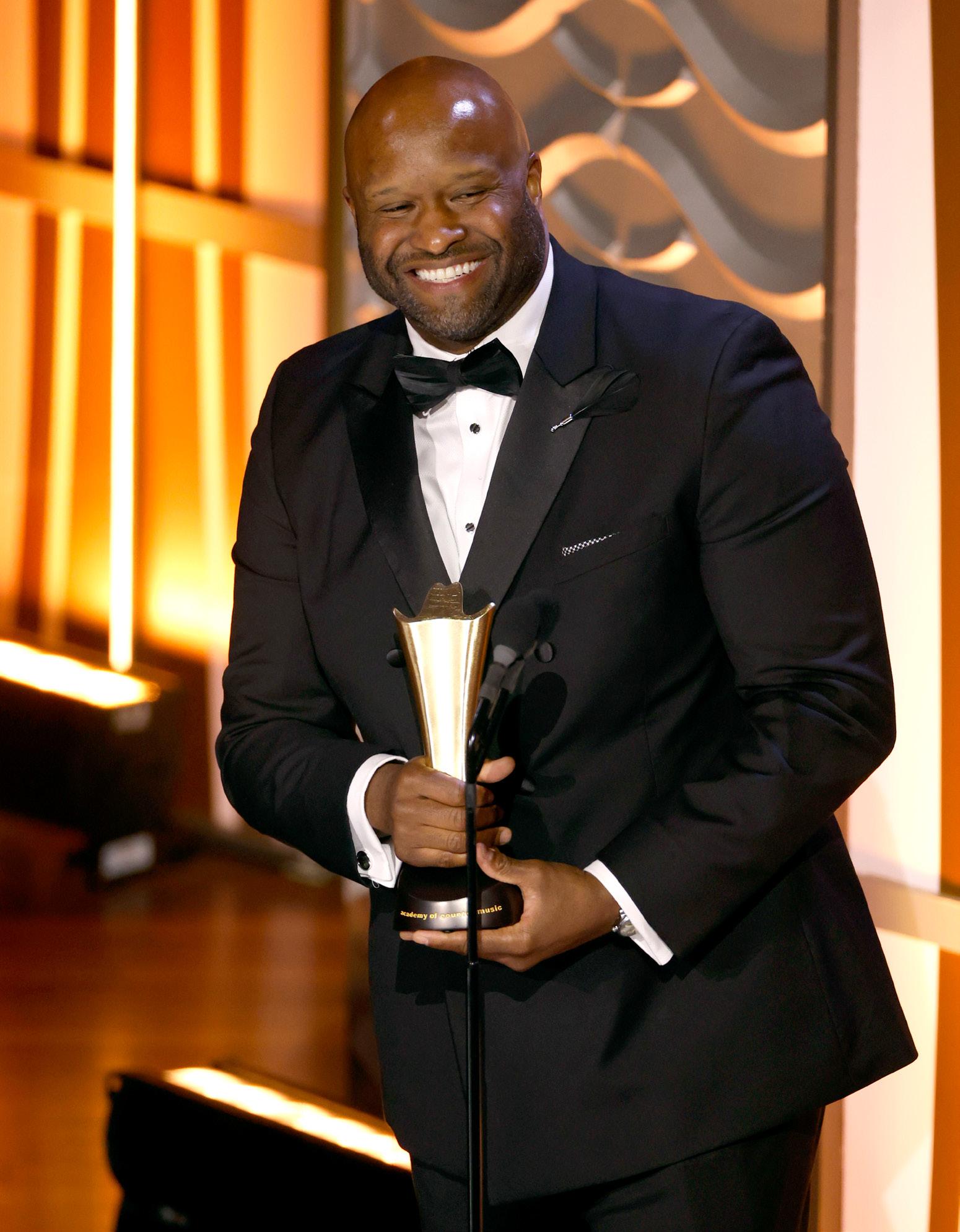
Shannon Sanders; Jordan Davis; Carly Pearce; Jackson Dean; Lee Ann Womack
Shannon Sanders, BMI Executive Director of Creative in Nashville, accepted the ACM Lift Every Voice Award, presented to an industry member who plays a pivotal role in elevating underrepresented voices throughout the Country Music genre, transcending demographics and geography. Sanders accepted the award following a dynamic performance of “Home” by Lee Ann Womack and the Fisk Jubilee Singers. The song, co-written by Sanders, was originally recorded by Marc Broussard in 2004.
In addition, new artist Jackson Dean sang “Strong” in tribute to Glen Campbell for a segment drawing attention to the grant cycle of ACM Lifting Lives, the Academy’s philanthropic partner. Scott and Sandi Borchetta’s Music Has Value Fund pledged $100,000 to ACM Lifting Lives to support the role of music in memory care. Campbell died of Alzheimer’s disease in 2017.



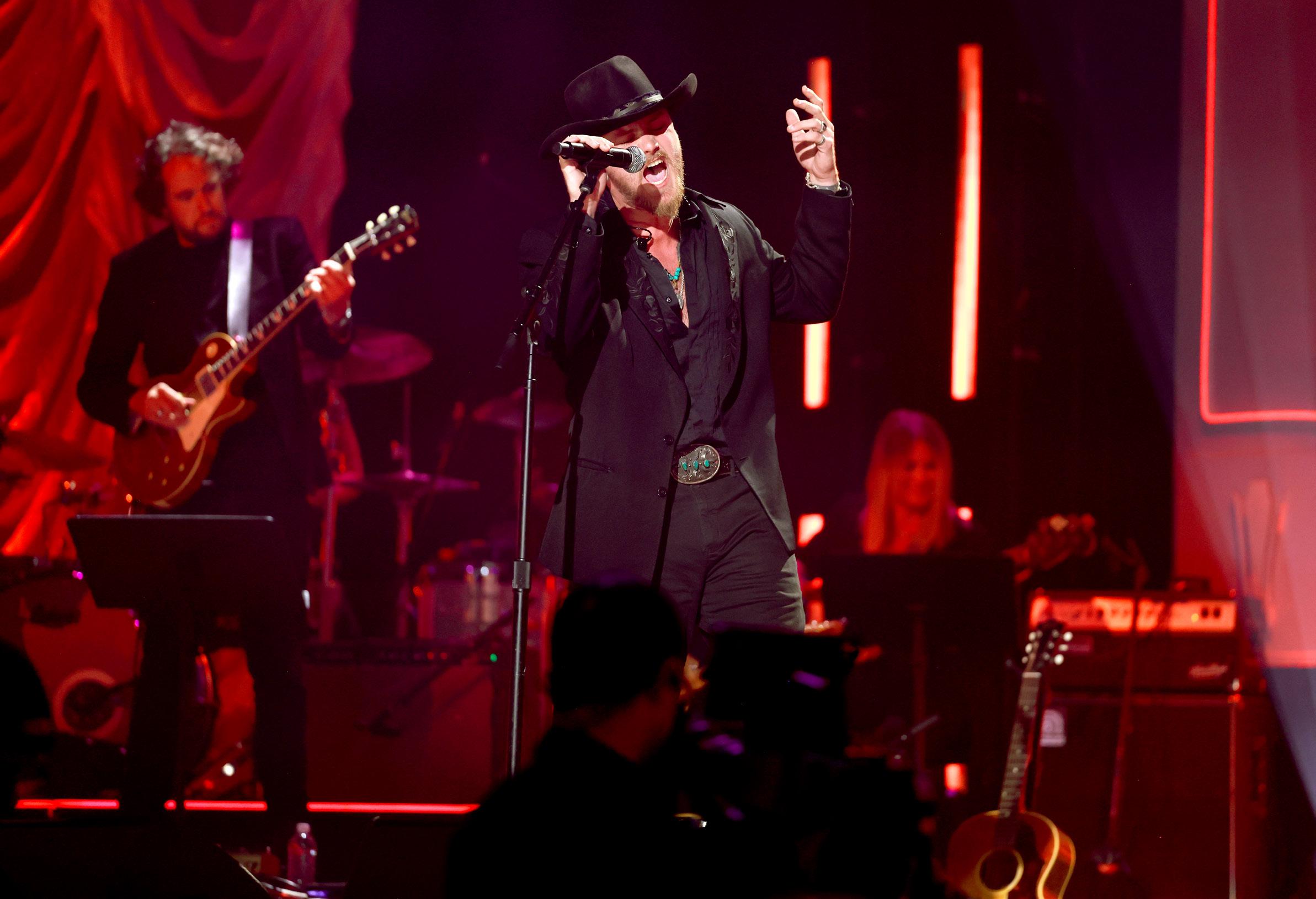

Presented earlier in the evening by Tyler Hubbard, the ACM Industry Awards recognize venues and talent buyers/promoters who have bought or promoted a predetermined number of Country Music concerts and helped promote Country Music ticket sales. Industry Award winners included Choctaw Grand Theater (Casino of the Year – Theater), Mohegan Sun Arena (Casino of the Year – Arena), Tortuga Music Festival (Festival of the Year), and San Antonio Stock Show & Rodeo (Fair/Rodeo of the Year). In addition, trophies were presented to Joe’s Live (Club of the Year), Ryman Auditorium (Theater of the Year), Red Rocks Amphitheater (Outdoor Venue of the Year), and Bridgestone Arena (Arena of the Year), as well as Ed Warm (Don Romeo Talent Buyer of the Year) and Adam Weiser (Promoter of the Year).
The Academy’s Studio Recording Awards recognize the creators behind the music. The Studio Recording Awards were presented to Jimmie Lee Sloas (Bass Player of the Year), Jerry Roe (Drummer of the Year), Charlie Worsham (Acoustic Guitar Player of the Year), Rob McNelley (Electric Guitar Player of the Year), Jim “Moose” Brown and David Dorn (TIE, Piano/Keyboards Player of the Year), steel guitarist Paul Franklin (Specialty Instrument(s) Player of the Year), Jim Cooley (Audio Engineer of the Year), and Dann Huff (Producer of the Year). ●
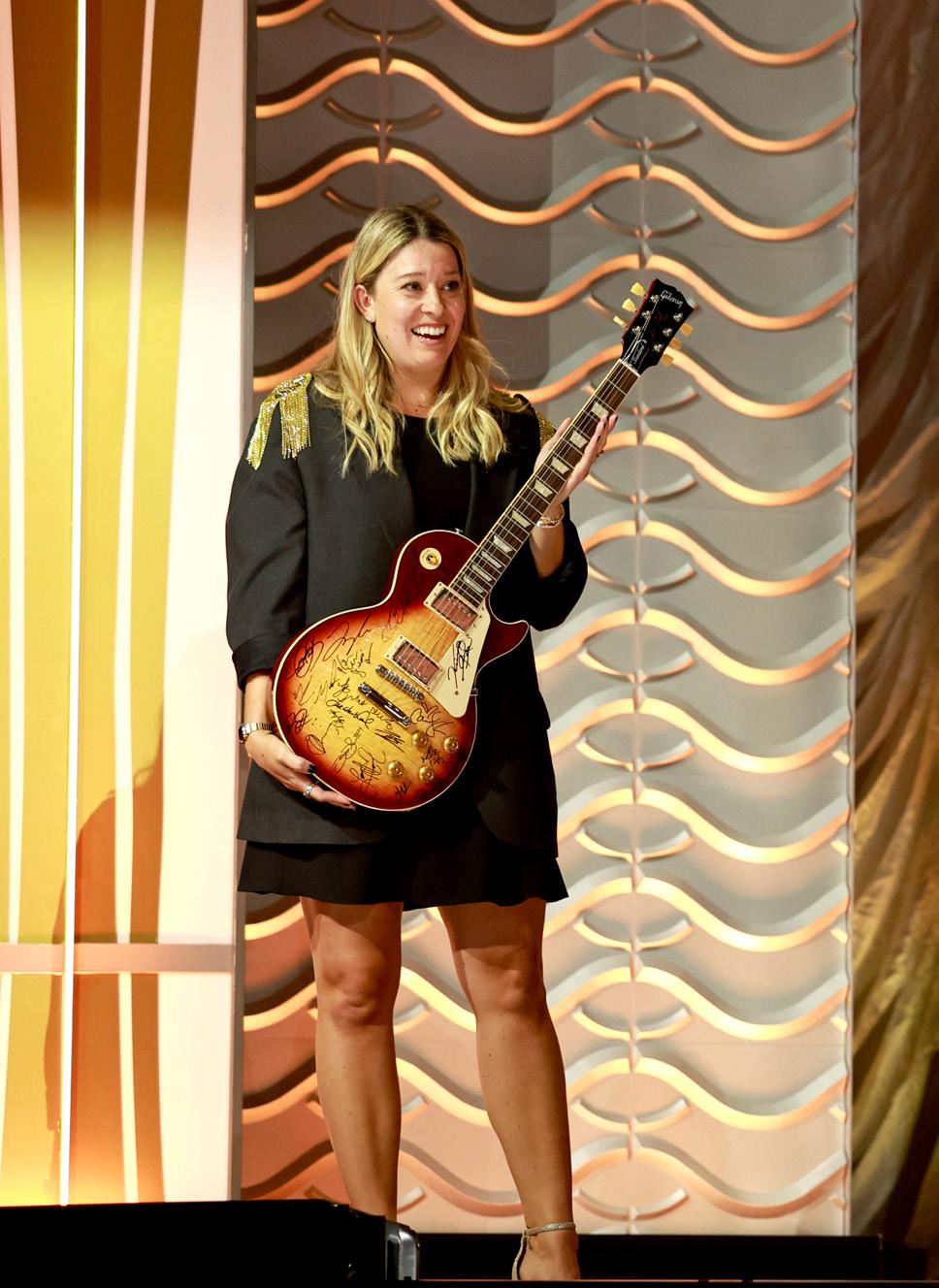
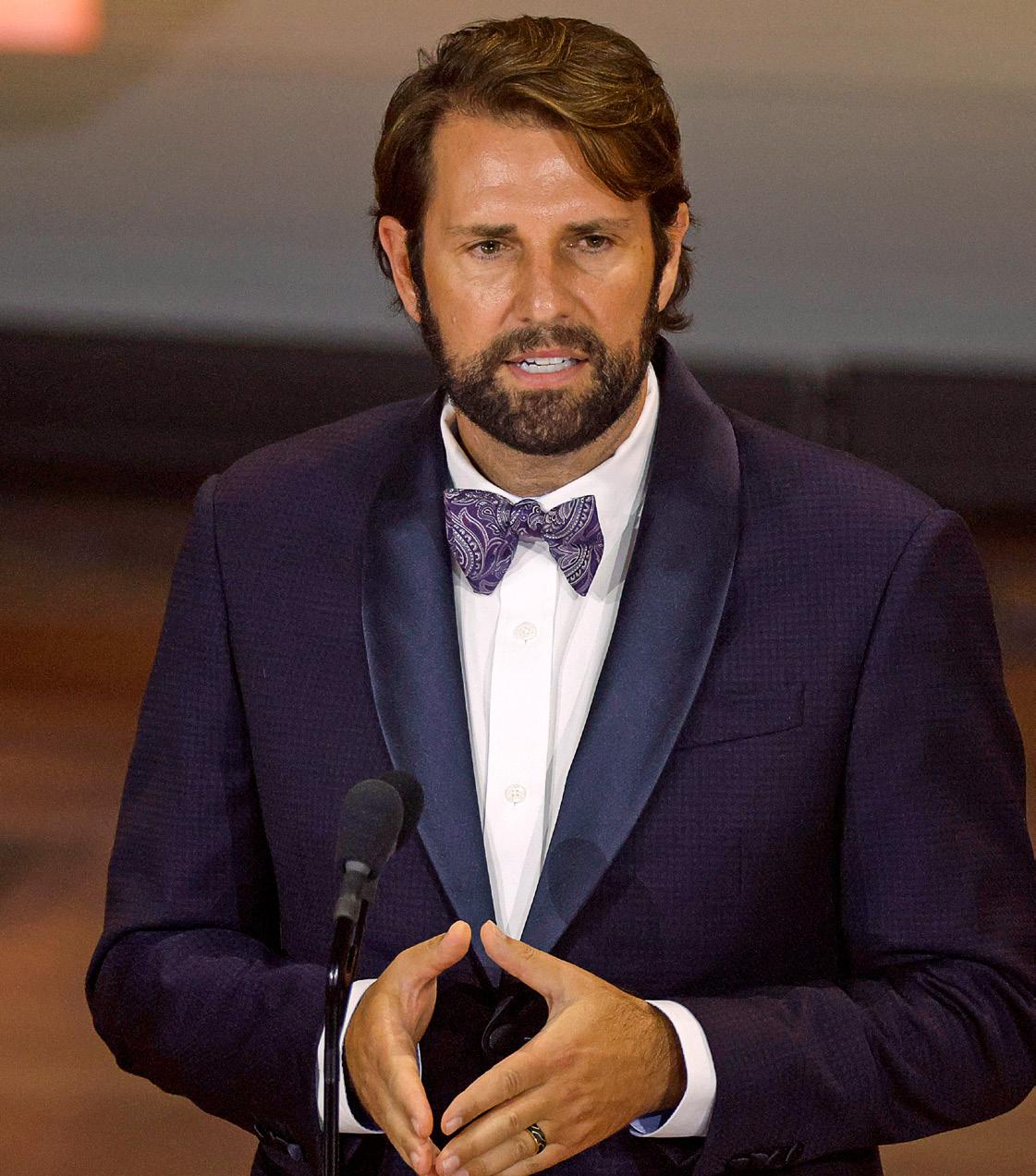
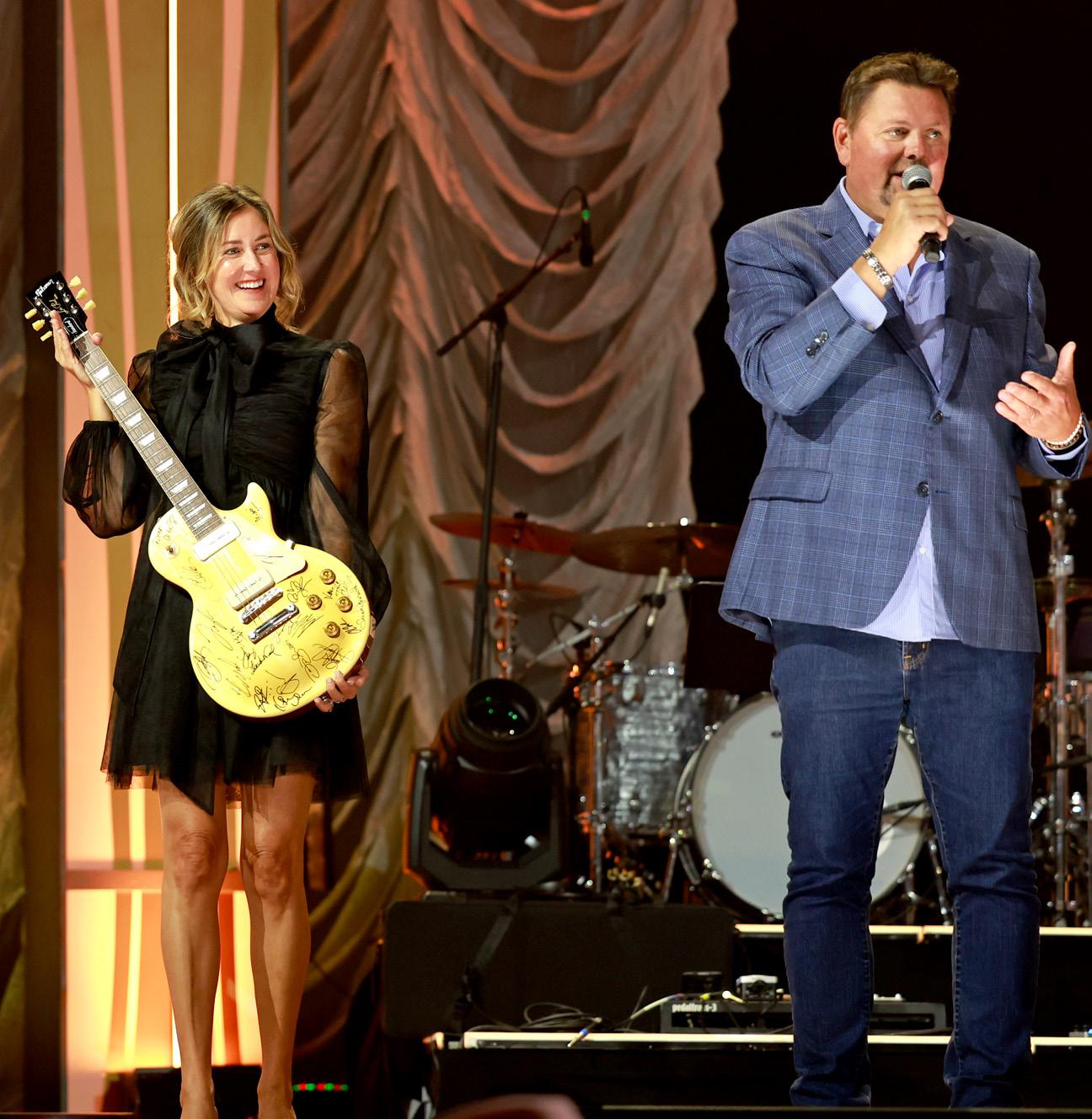


This past August, the 17th ACM Honors celebrated the 59th ACM Industry and Studio Recording Award Winners.
The winners (voted on by membership) include:
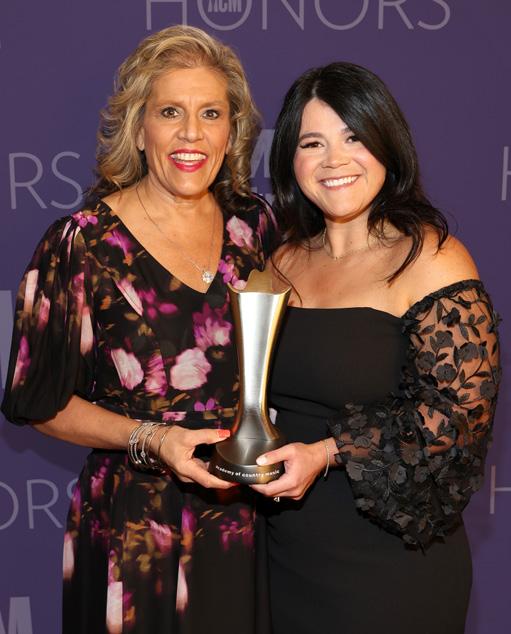
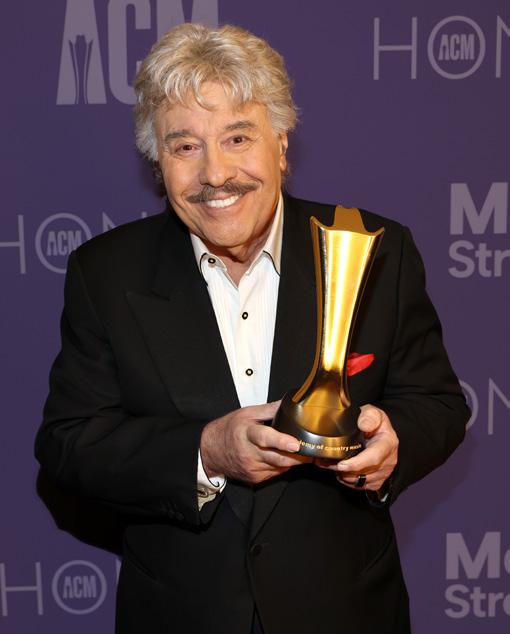
Durant, Oklahoma
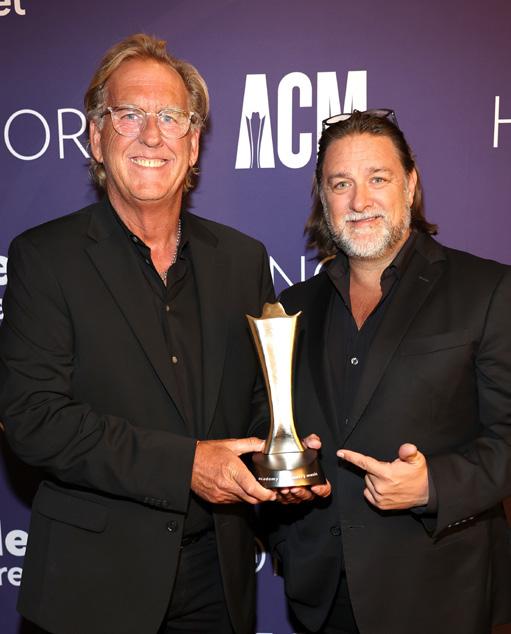
FESTIVAL
Fort Lauderdale, Florida
Uncasville, Connecticut
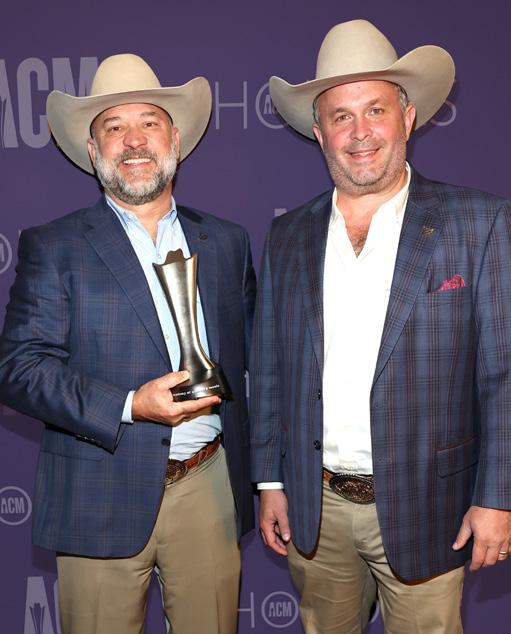
San Antonio, Texas

CLUB OF THE YEAR
Illinois
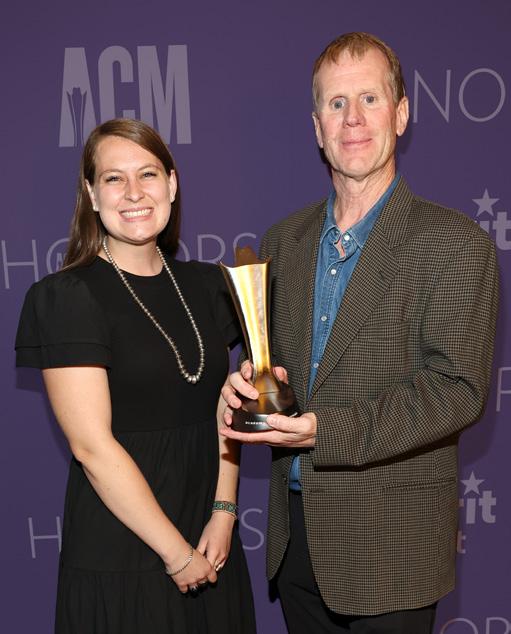
OUTDOOR VENUE OF THE YEAR
Morrison, Colorado

THEATER OF THE YEAR
Ryman Auditorium
Nashville, Tennessee
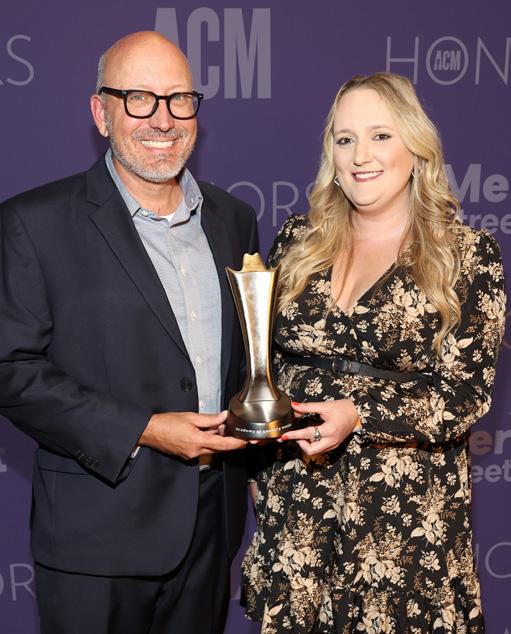
Nashville, Tennessee

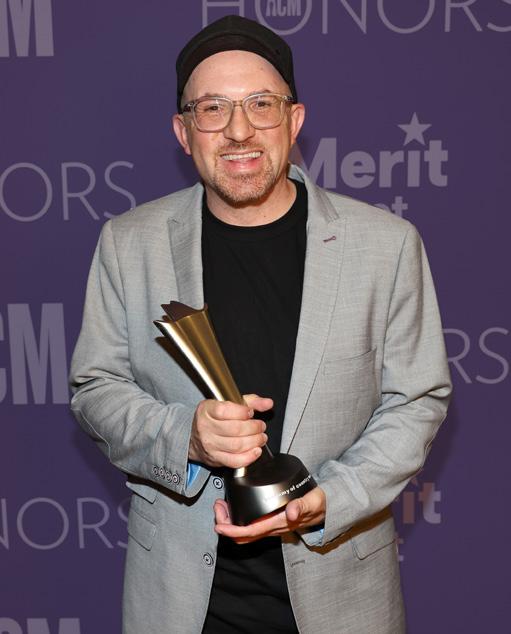
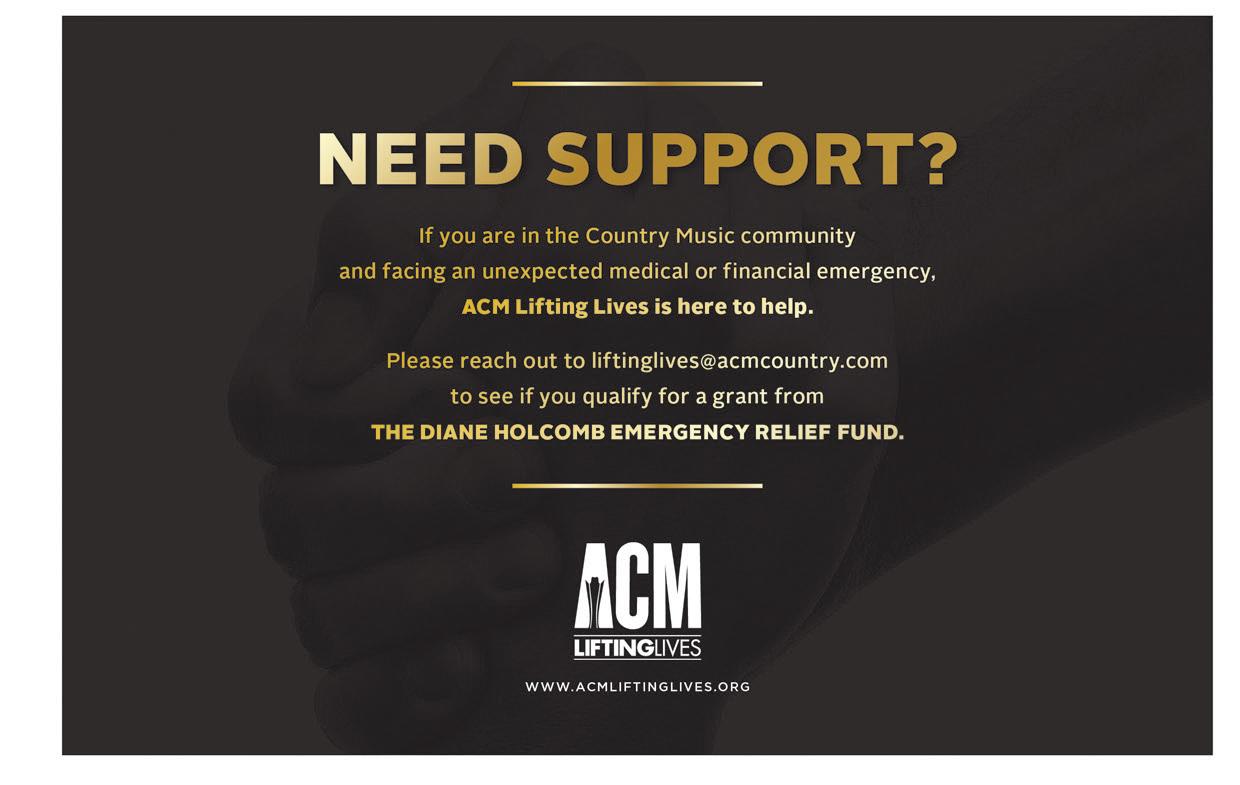
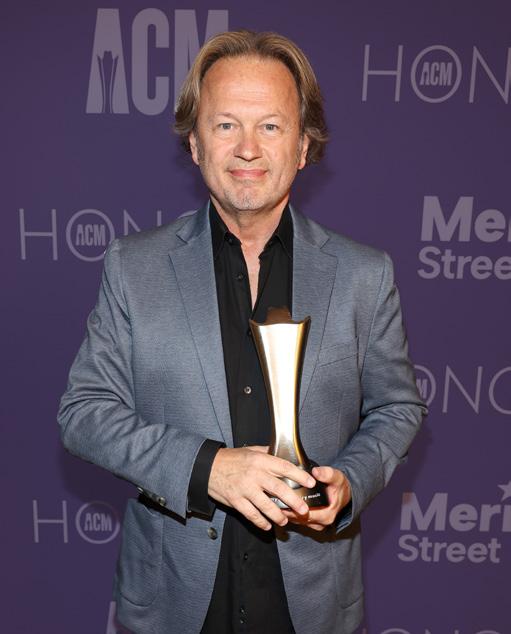

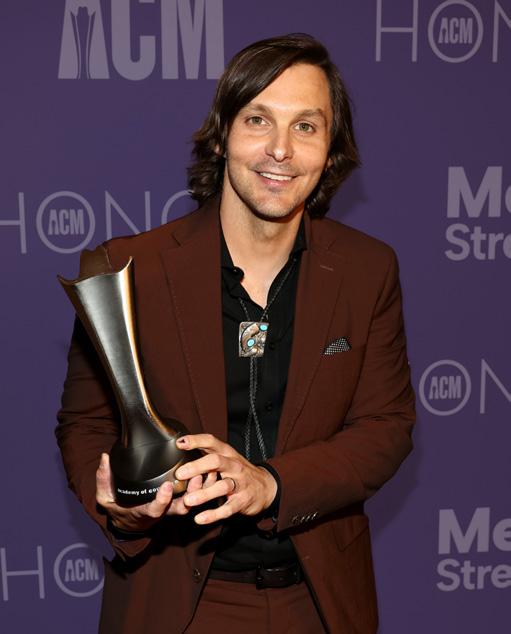
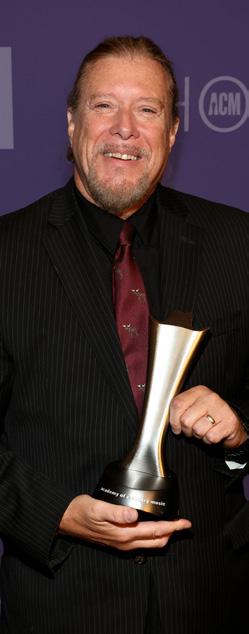

SPECIALTY INSTRUMENT(S) PLAYER OF THE YEAR
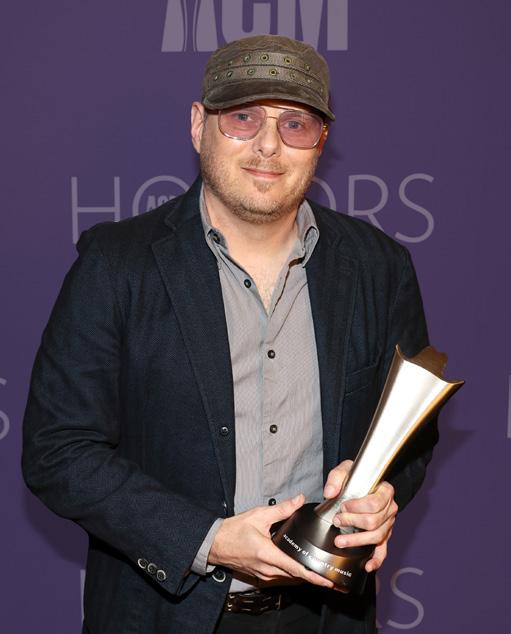
SPECIALTY INSTRUMENT(S) PLAYER OF THE YEAR
Paul Franklin
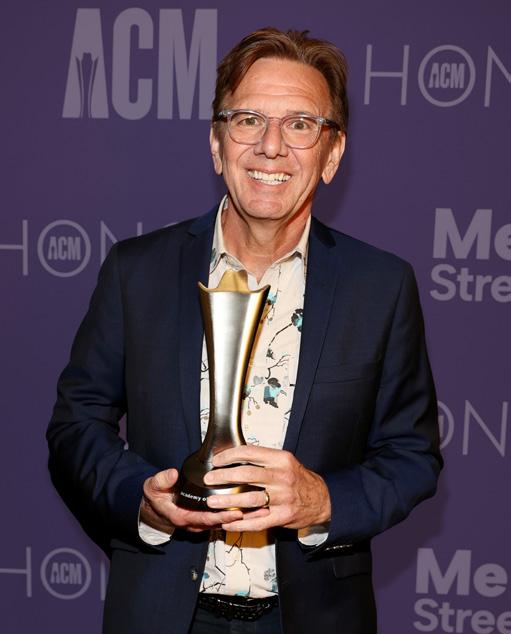
PRODUCER OF THE YEAR
ELECTRIC GUITAR PLAYER OF THE YEAR
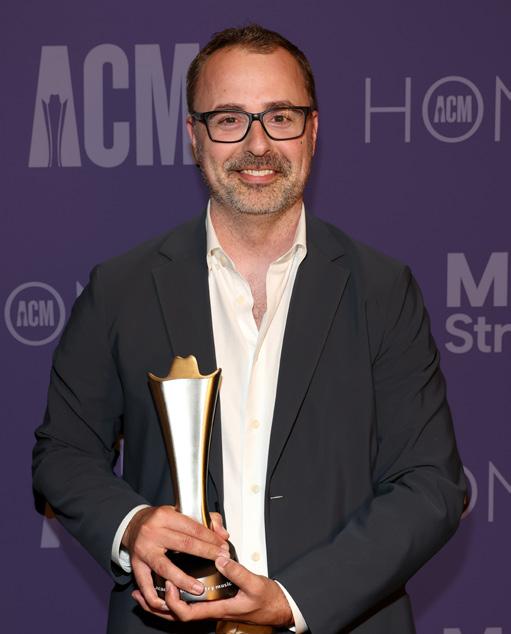
AUDIO ENGINEER OF THE YEAR
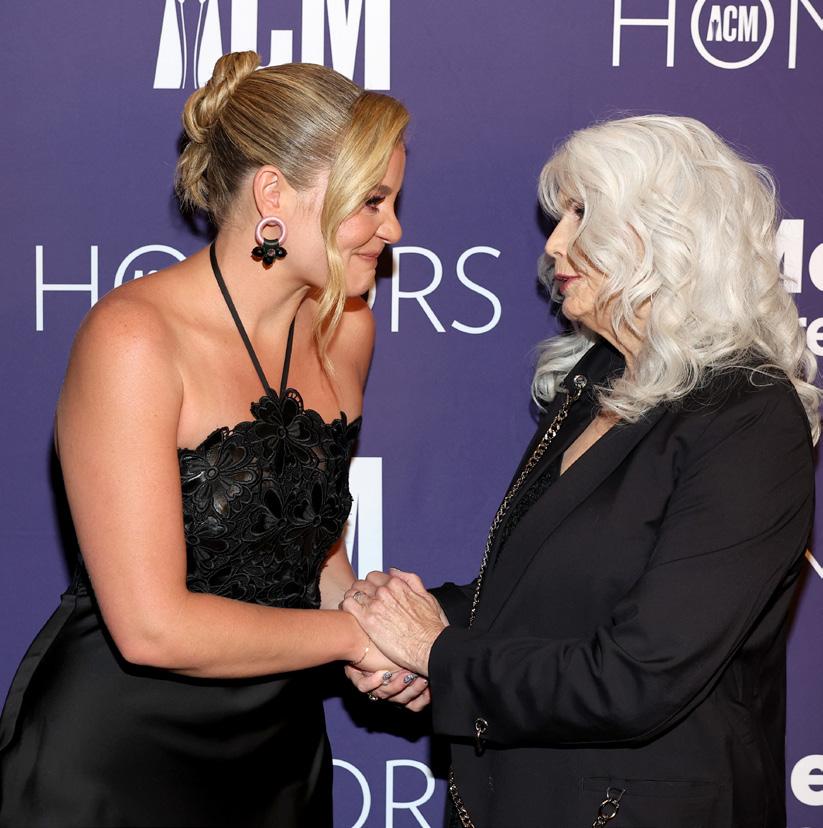
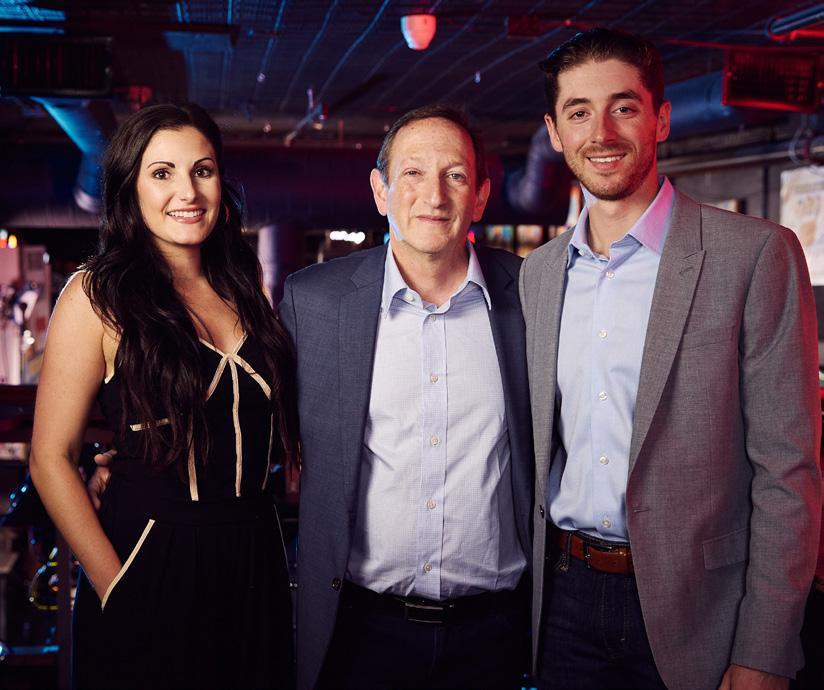
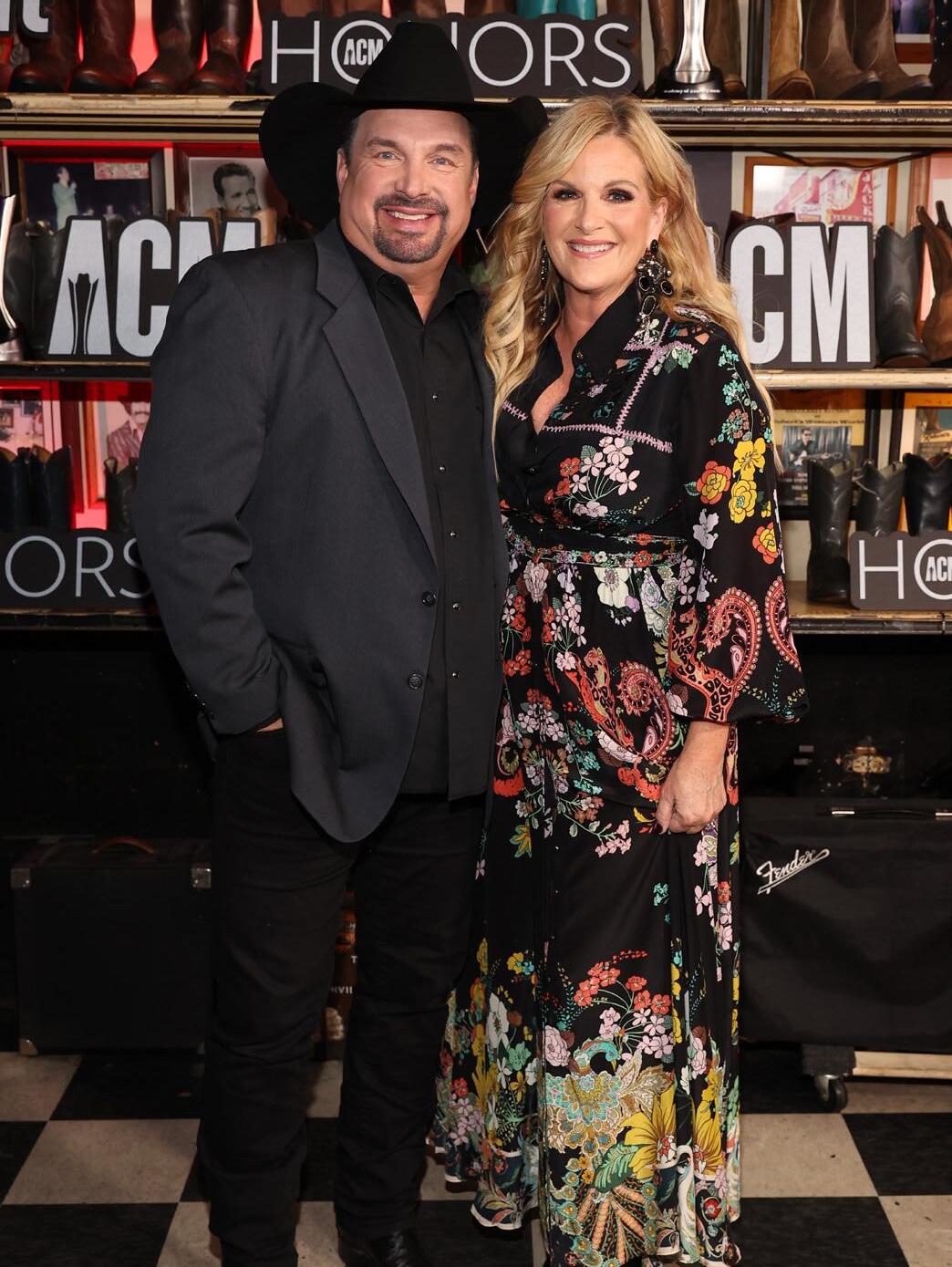

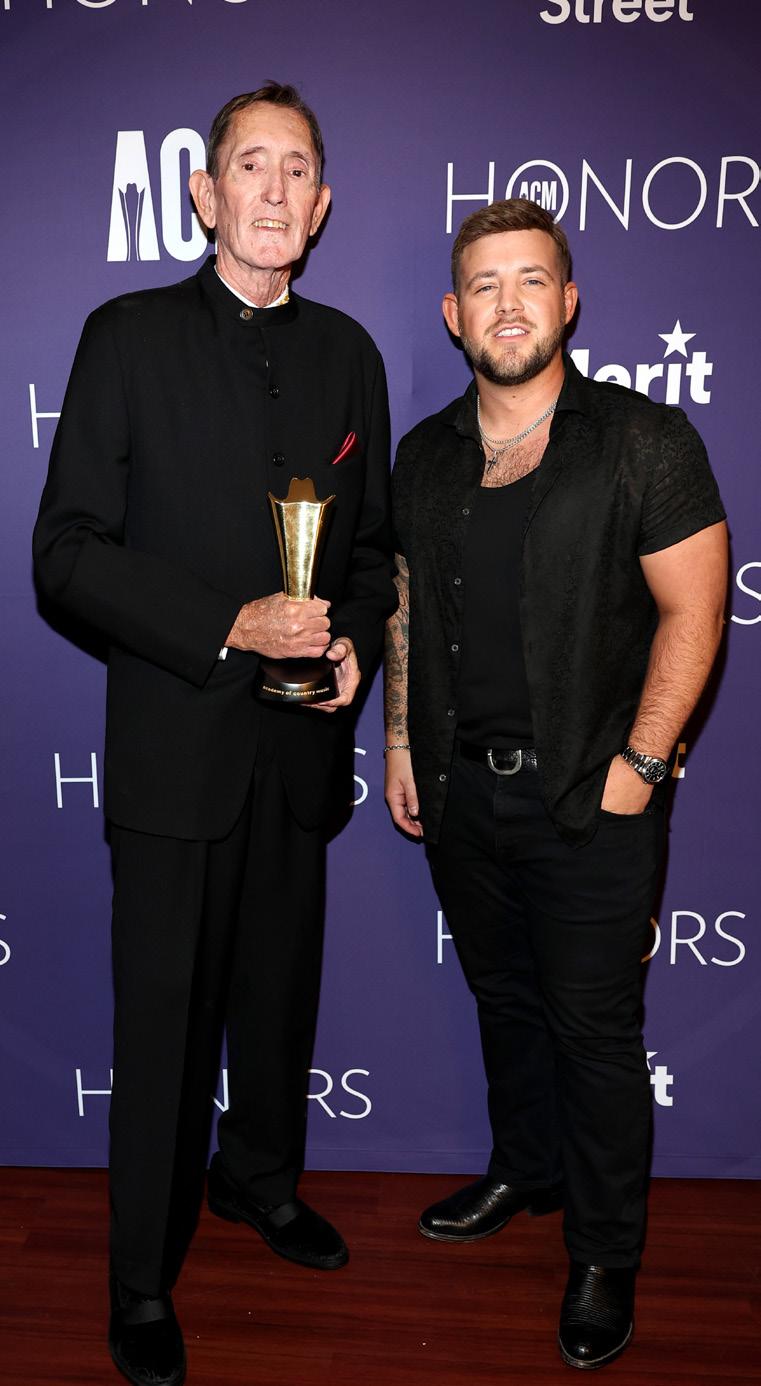

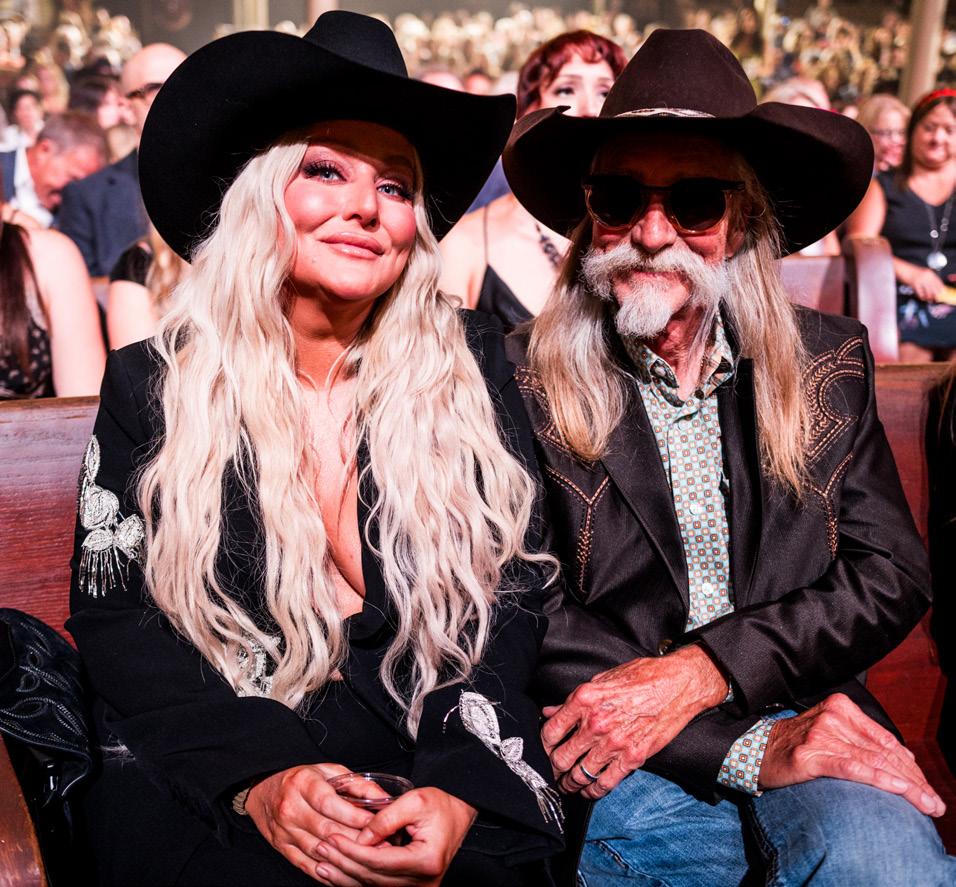
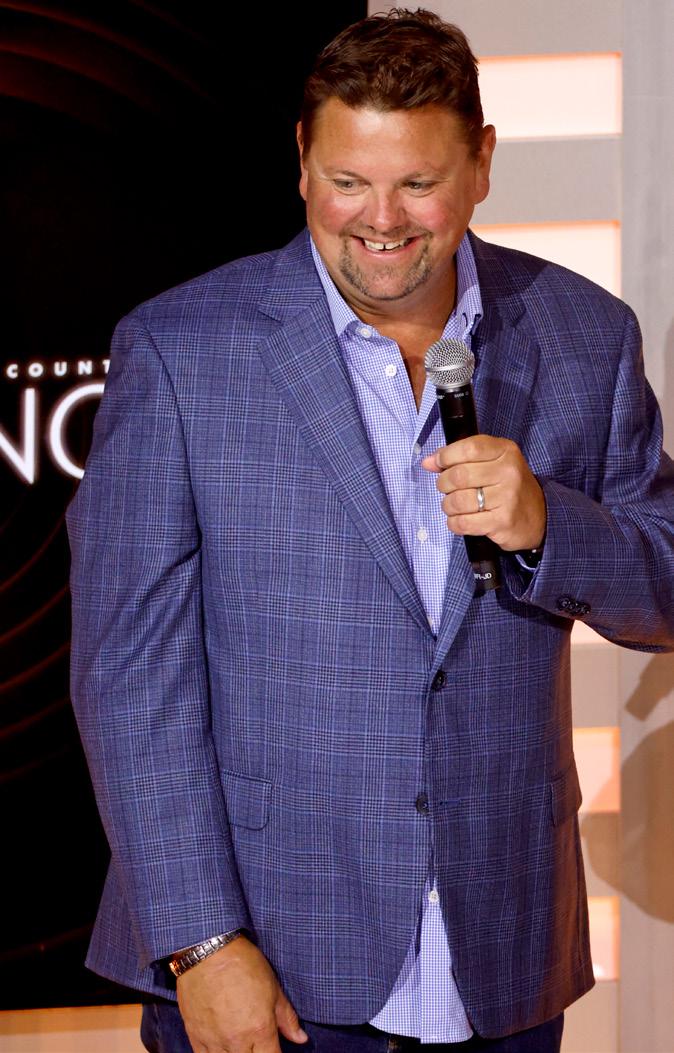

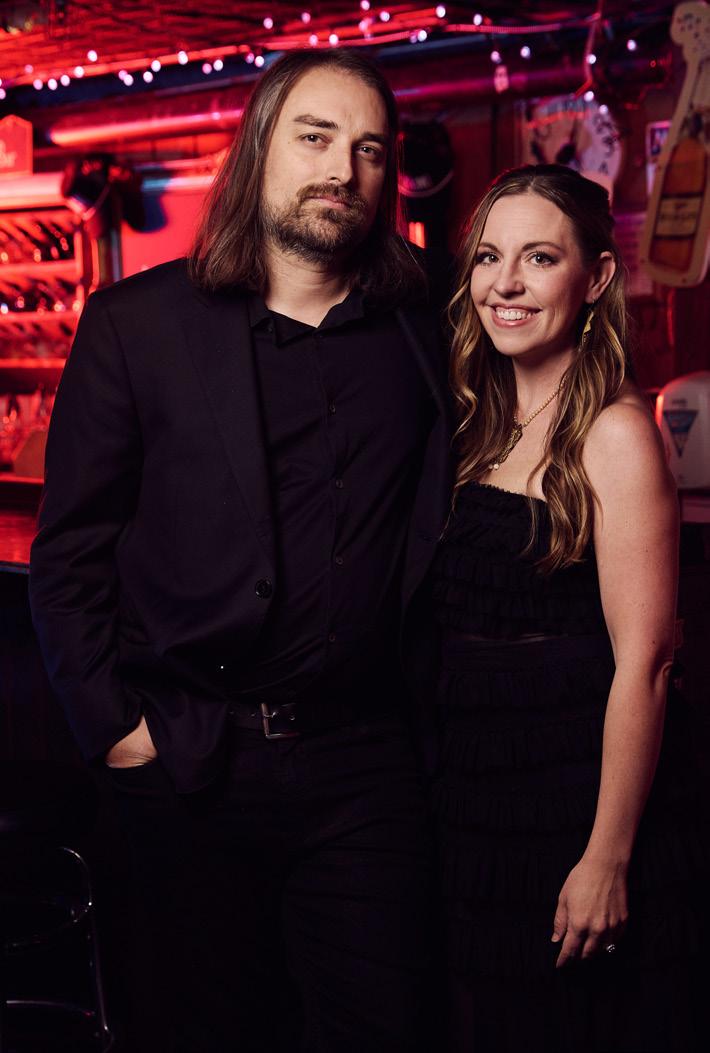

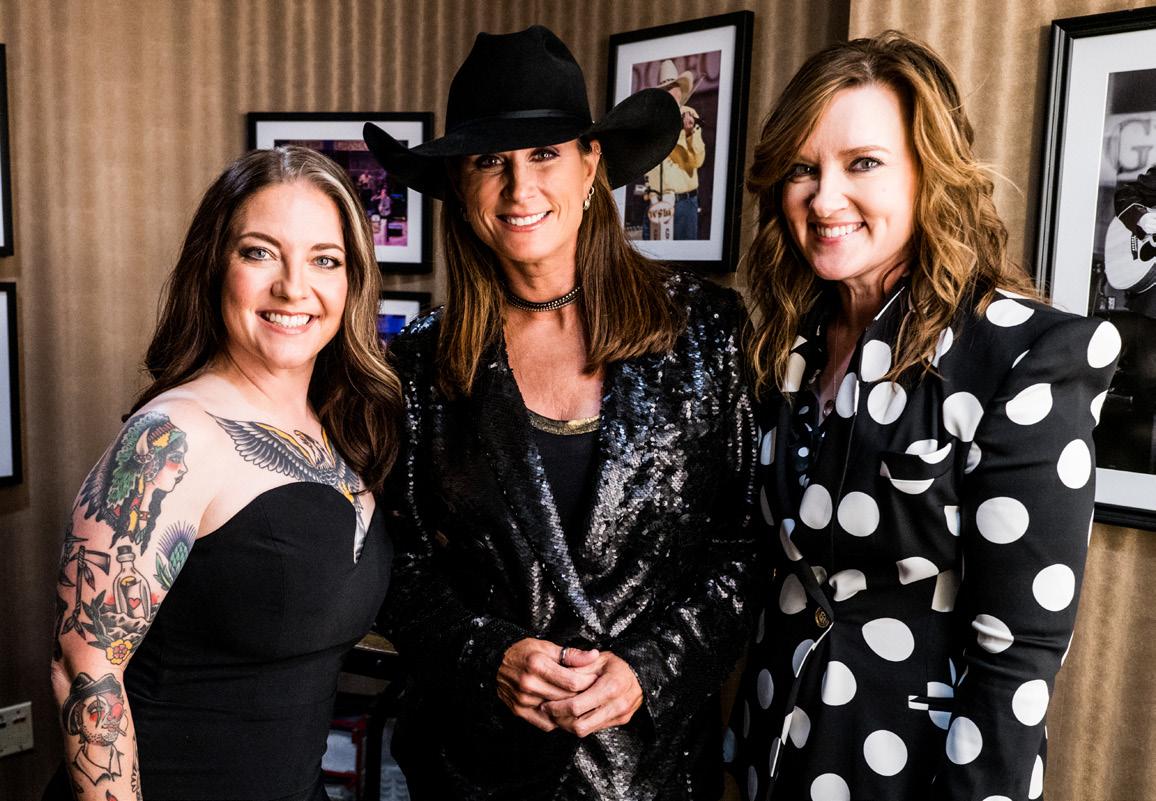

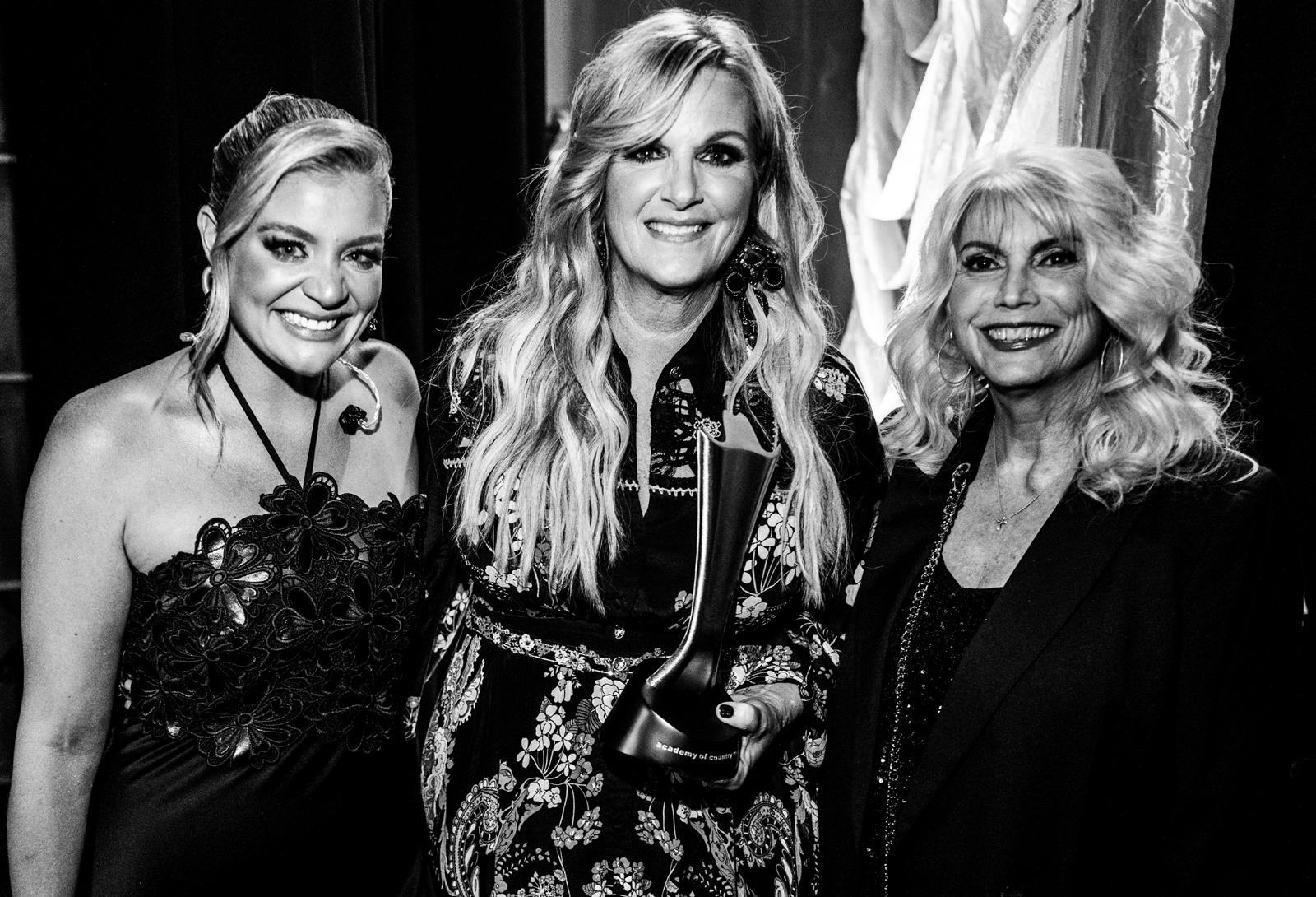
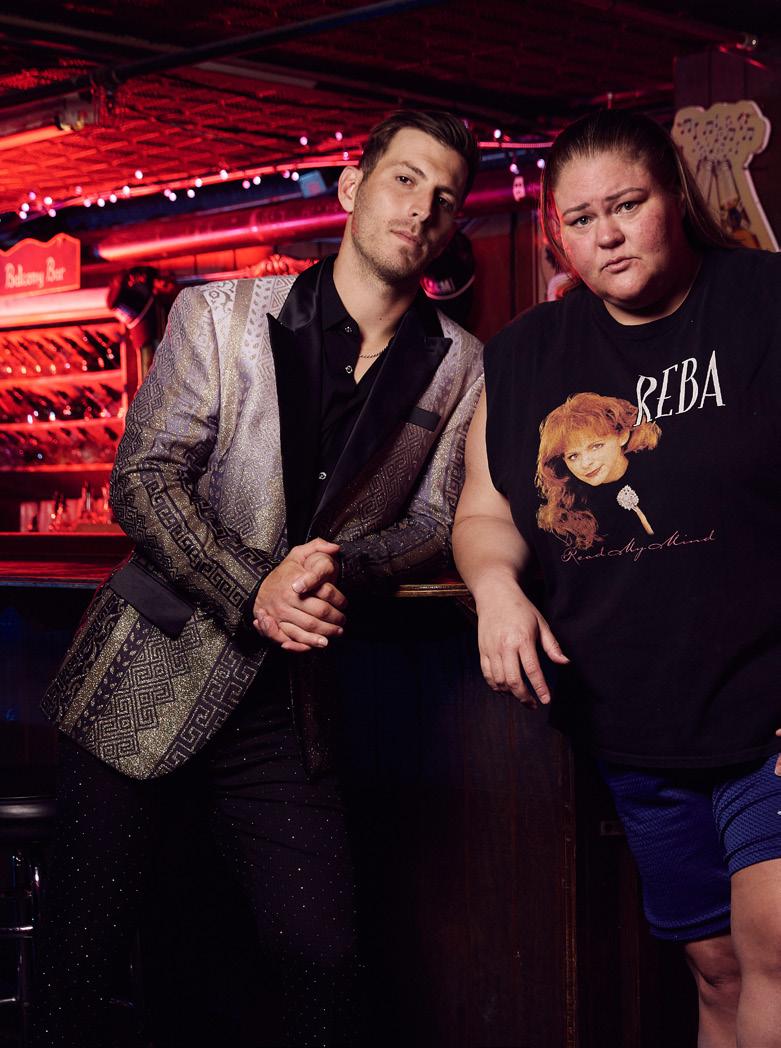
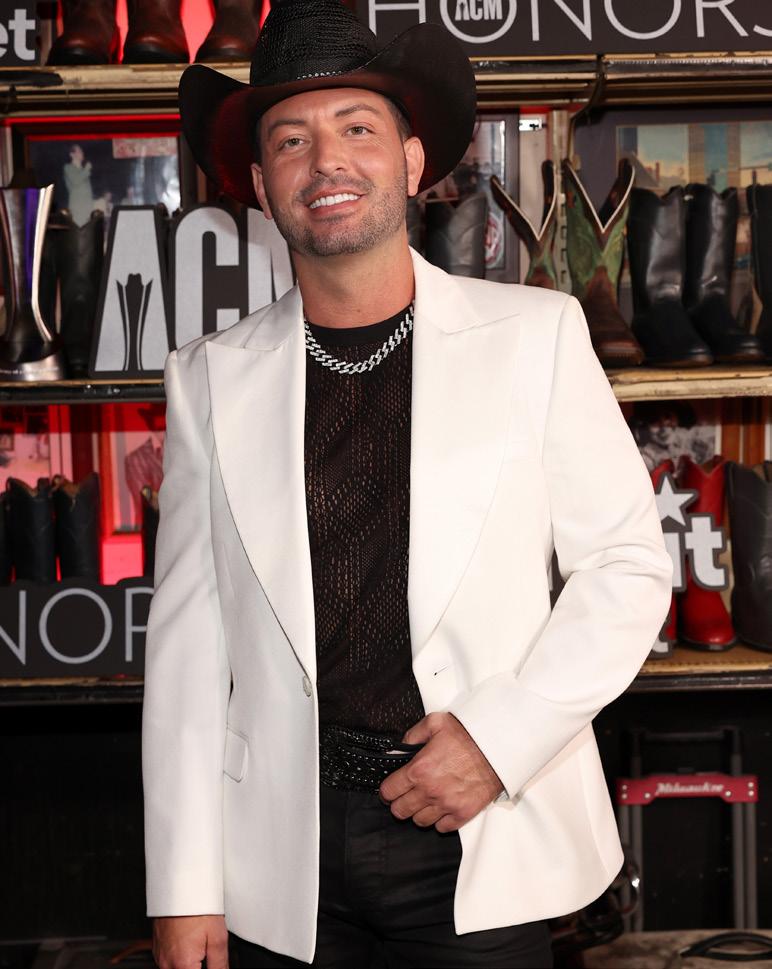
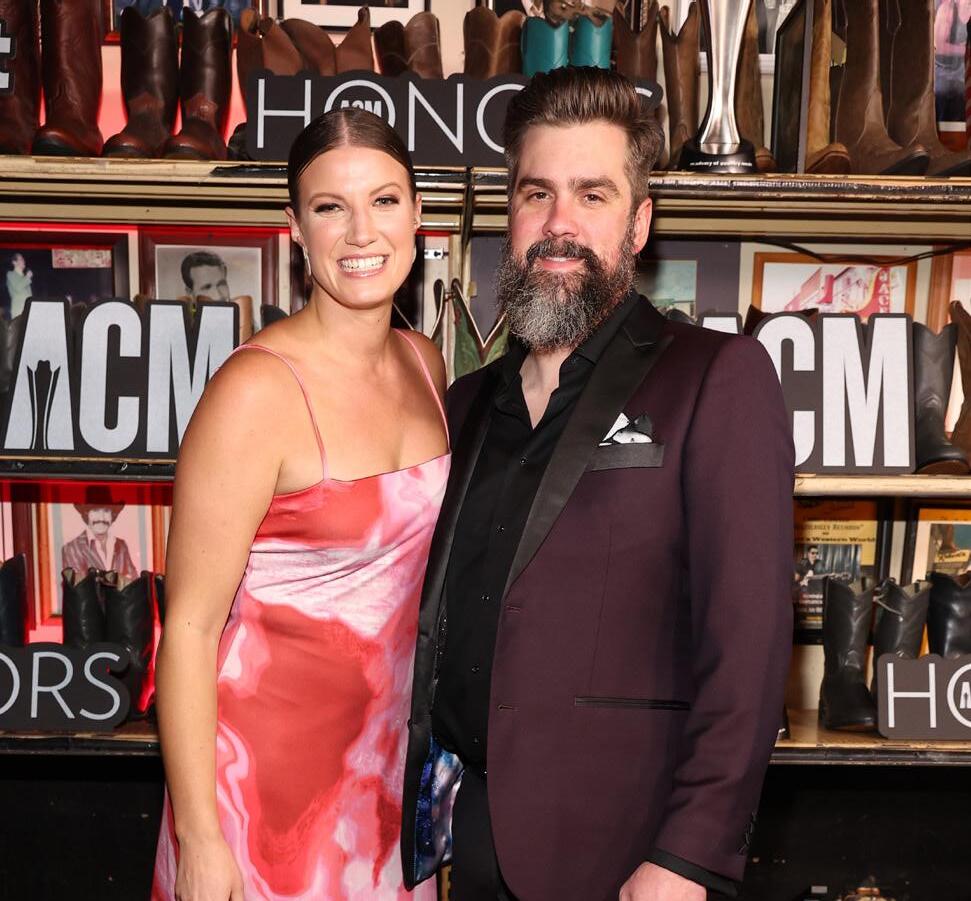


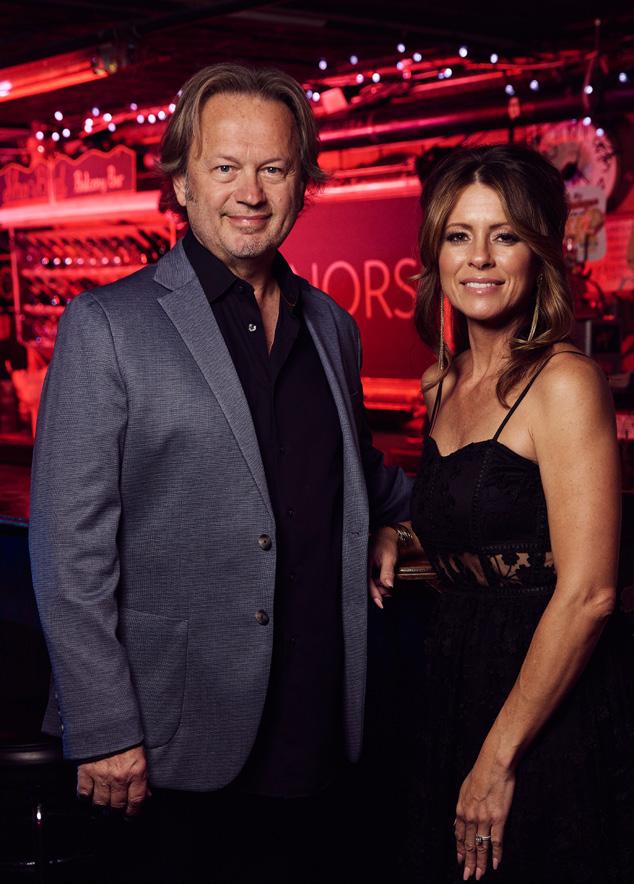


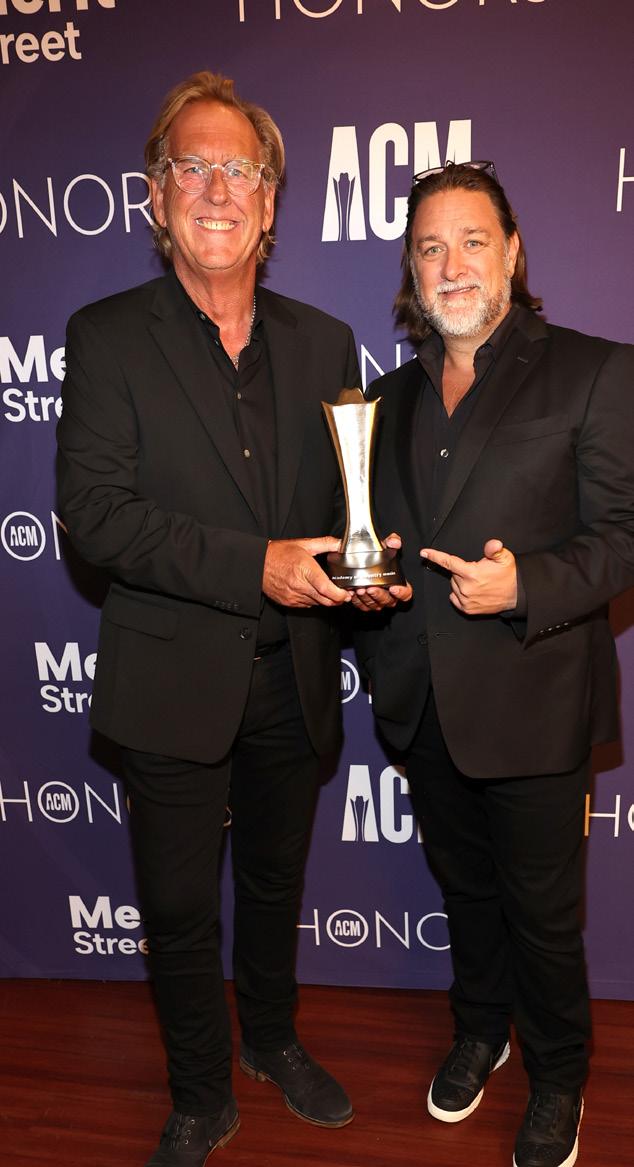

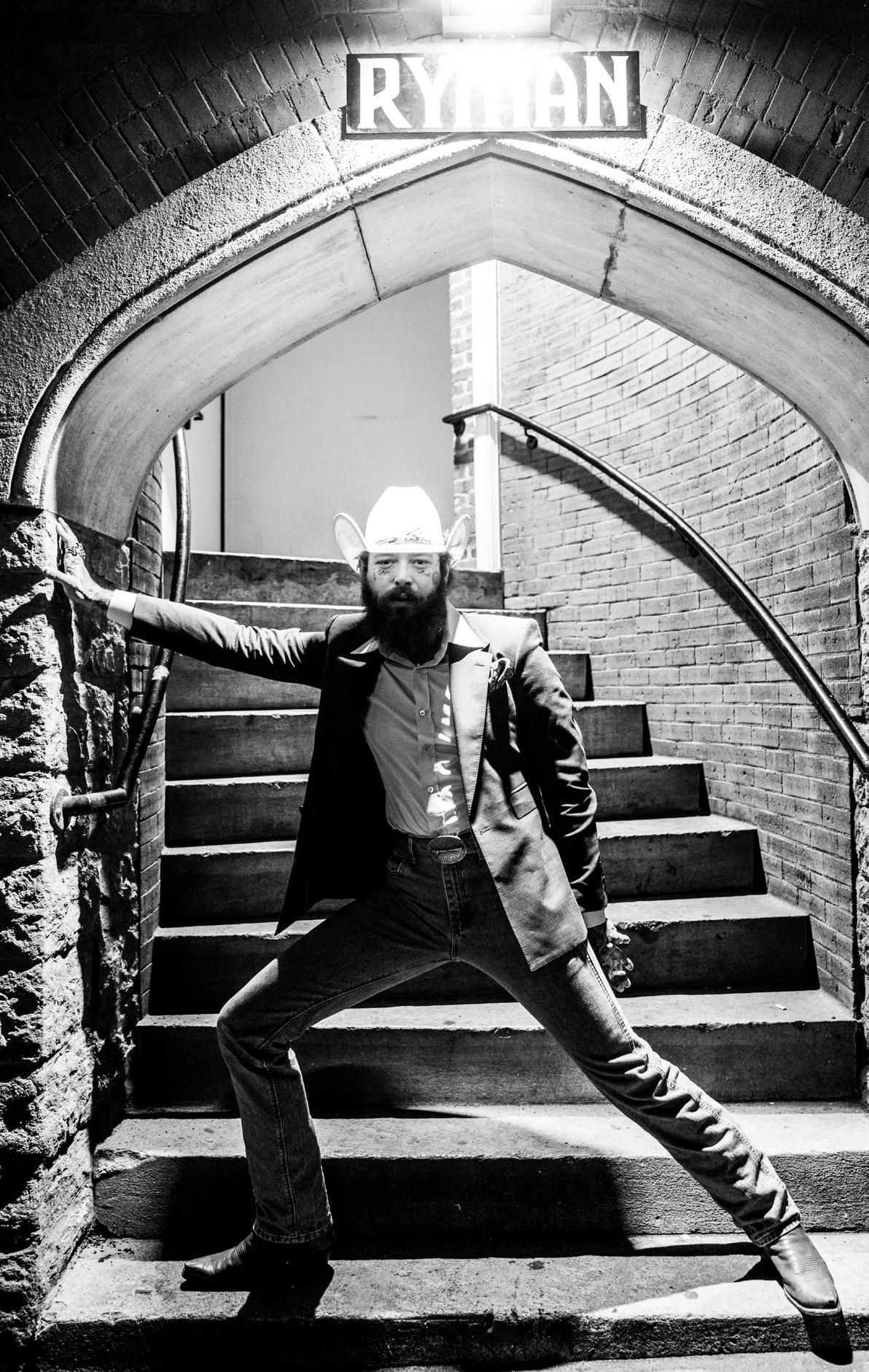




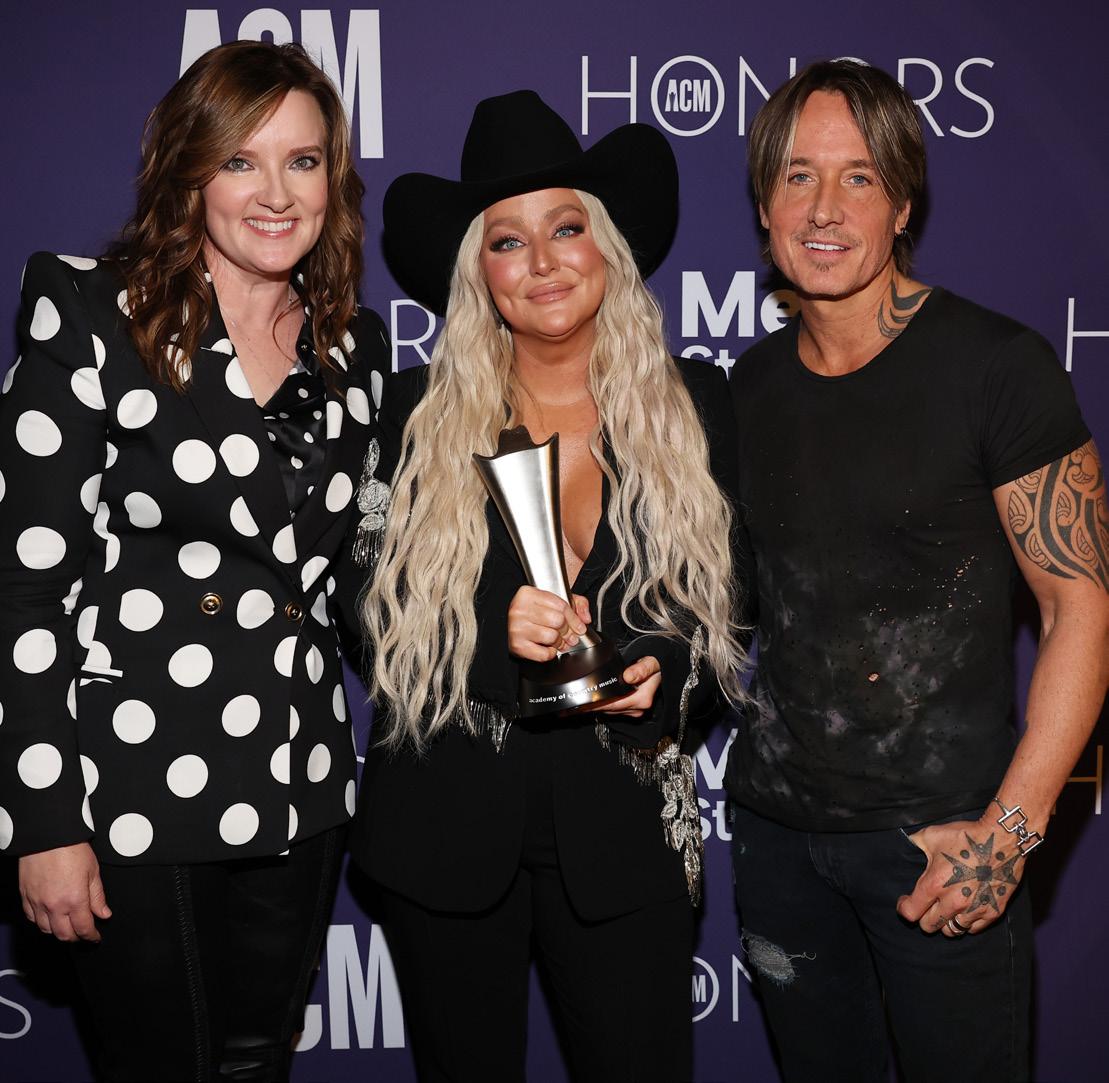
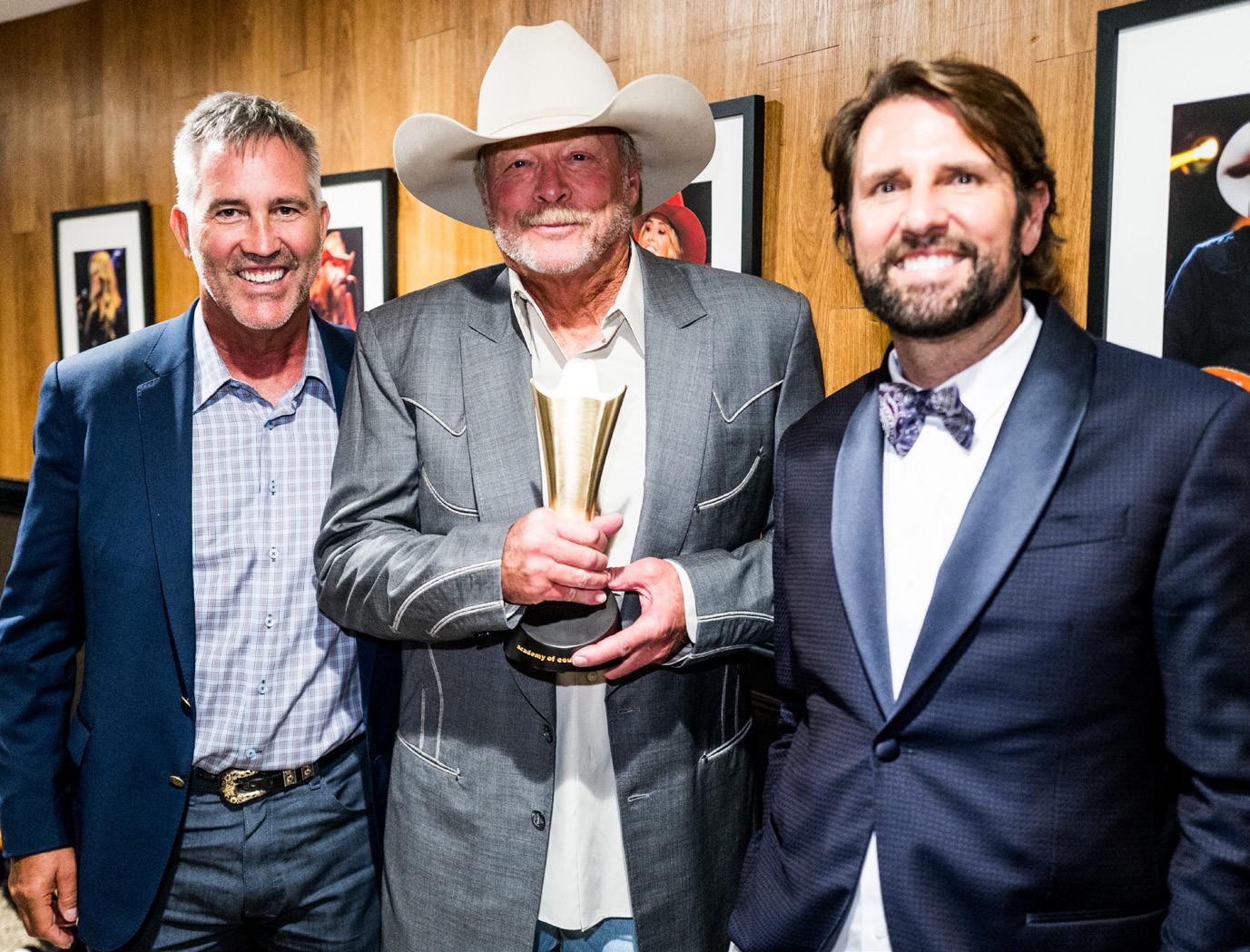
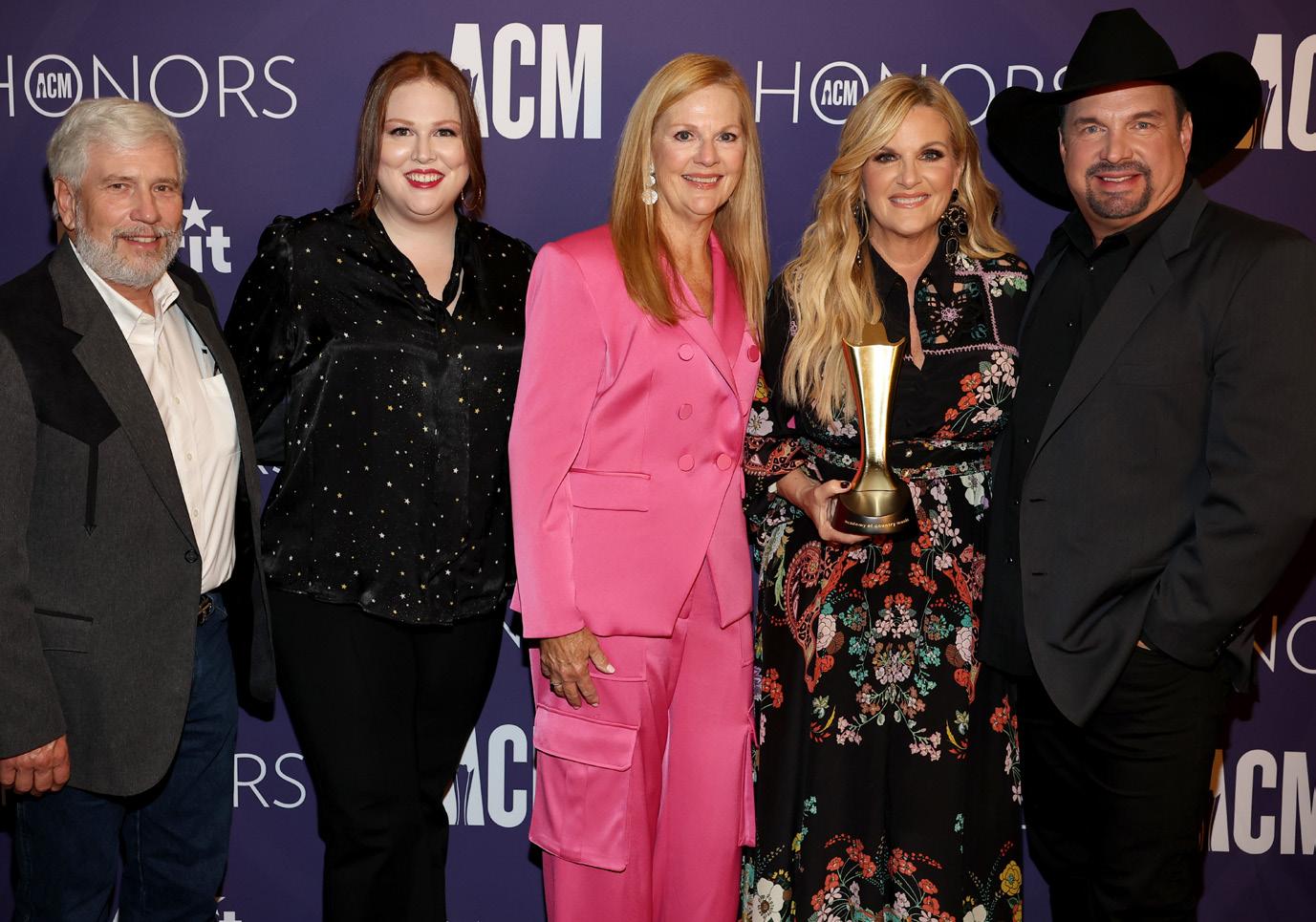

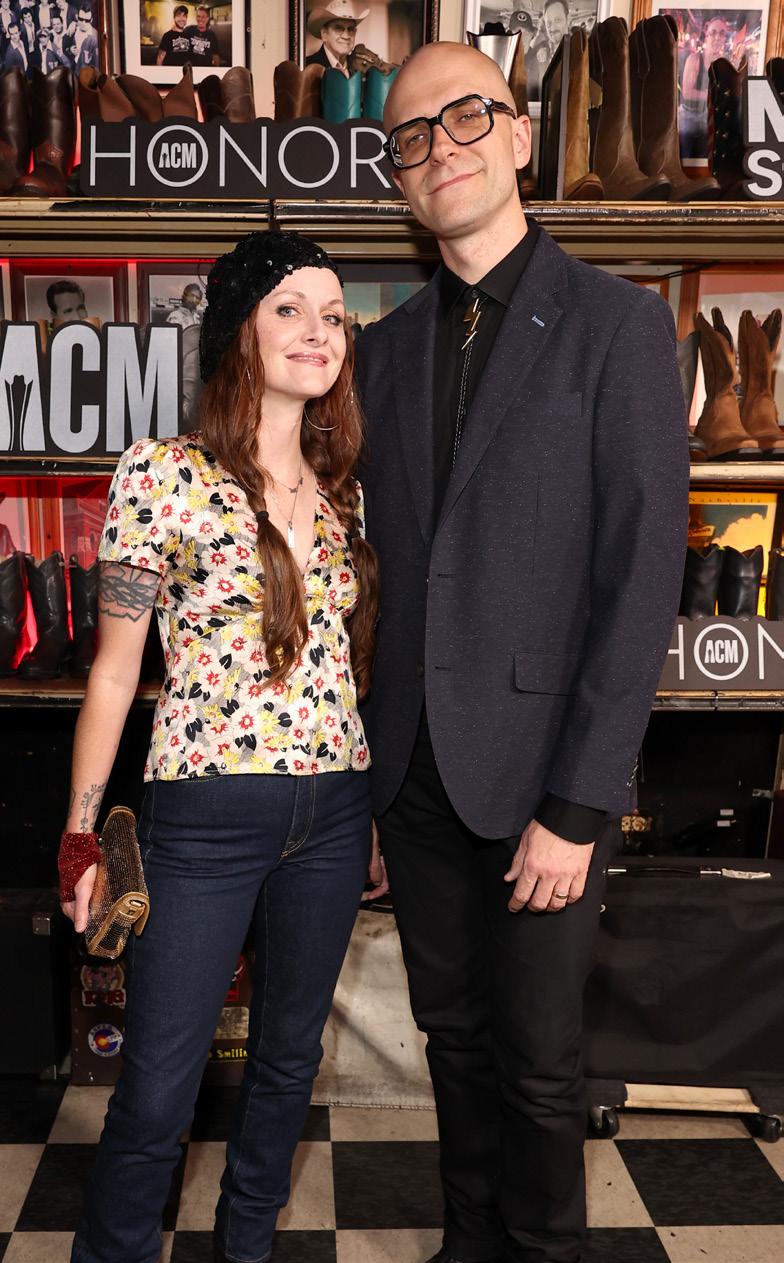
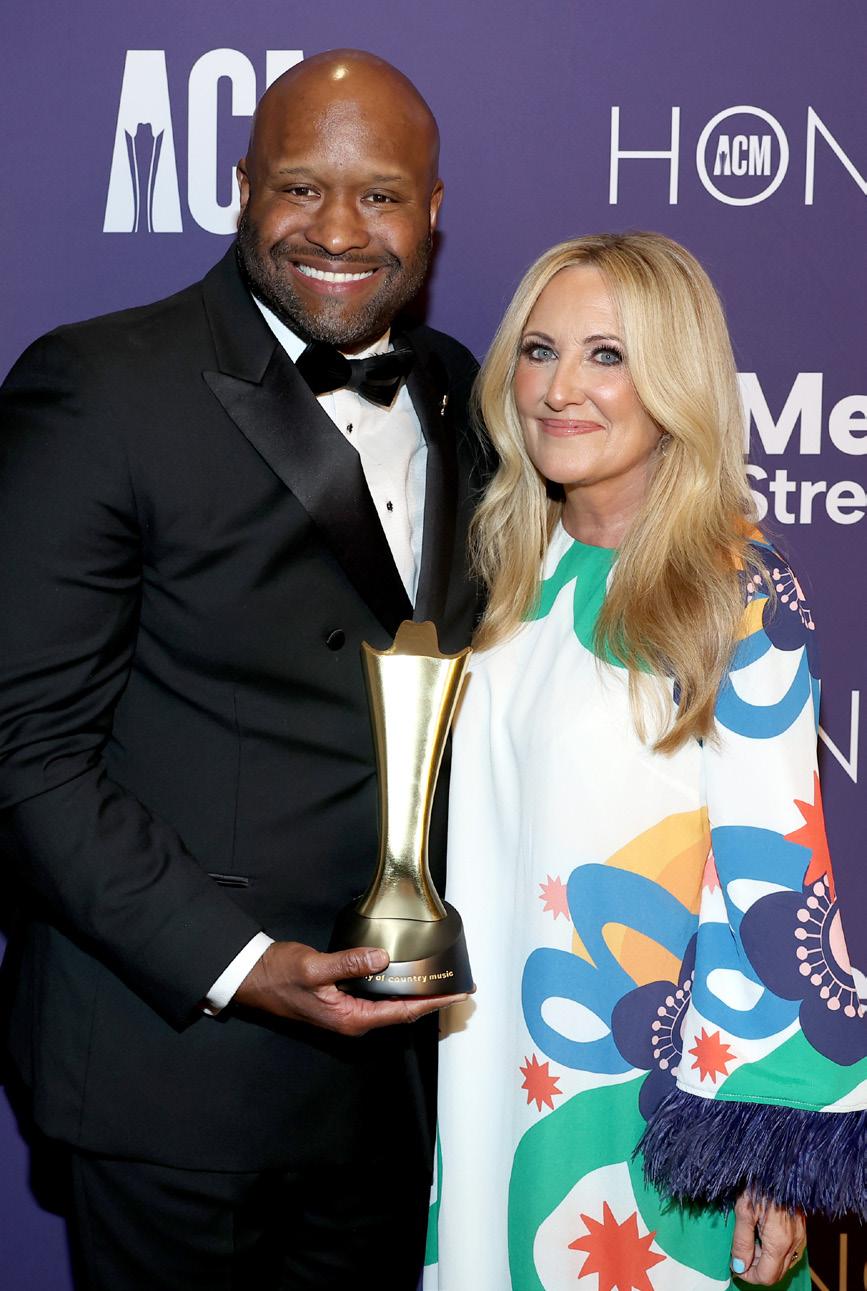
THE RIGHT place. THE RIGHT people. THE RIGHT pl .


winner
reflects on their new music, evolution as a band, and the future
BY LIBBY GARDNER

TEMPO: Your new album Barley Blue was released recently. How did that project come to be?
CAMERON DUDDY: Well, this is our fifth release for Big Machine, and this is an album that we’ve been writing toward for the last year and a half. We’re always on the road. So, you do some of your writing out there in transit, some at home. It was a labor of love, if not a painful one, to get the songs together. Our standard is pretty high for ourselves, and we didn’t want to go into the studio without anything that we knew that we wanted to play for the rest of our lives. At the first step of the process, the production of it all was a unique experience for us, and one that we found very rewarding. We got to travel together and live out in Savannah at Dave Cobb’s studio ... We were there for two weeks, cutting the record, and when we left, the record was done, as opposed to leaving and kind of piecemealing the rest of it together with overdubs and all that. It was kind of a live record in a way.
TEMPO: I’m curious about the songs specifically on this record. How did it come together?
JESS CARSON: We just try to choose the best songs. That being said, I think that there were some really great songs that we wrote for this album that we didn’t cut because they were a little more playful, and we’re serious guys now if you haven’t noticed. We have gotten older. We’re taking a little more serious approach to the material these days. We still try to party like we’re 23 ... This was the first album where we ever cut an outside song written by somebody else. Other than that, it’s material that is very personal to us.
TEMPO: It sounds like, as a band, you need consensus when you’re picking out a song for the record.
JESS: Someone called it a republic actually the other day. It’s not a democracy. It’s a republic, and [that was] the expectation of this record in working with Dave. We brought him into that process of selection, and we all found that was a perspective that we needed going into this process to vet through the songs, because we went in with a bunch of material. We landed on eight.
TEMPO: The record sounds very nostalgic, very retro. You touched upon it a little bit earlier. You guys have grown as a band. You’ve matured maybe a little bit. It’s your 10th anniversary as a band, so how have you seen that growth play out in your music?
MARK WYSTRACH: I’m not necessarily sure that any of this was intentional. It’s just where we arrived. I think as to what you’re inquiring about is, yeah, it’s

our 10-year anniversary being a band together. And in 10 years, we’ve logged many miles together, and we’ve lived a lot of life. I guess somewhere within those two factors is probably the answer to the question. You go through this much stuff [together], and it’s going to change you as songwriters. As guys that record music and perform it like that, that’s going to inform, and I think, change your perspective, and probably what you’re writing about, also the way you record it. All that stuff is going to evolve in one way or another. We’re really fortunate enough that 10 years in, we’re finding kind of new ways to fall in love with music, because you kind of have to do that. And when it becomes, at some point, your job, then, as a musician, I think you’re kind of screwed. But if the music still moves you, then I think you’re in a good place. I think that’s where the three
of us have found ourselves, so we’re really excited to share that with the world.
Like you’re asking from the songwriting to the sonic landscape, it’s an evolution, for sure. And I do think that’s important as an artist. You can’t stay in the same town too long, just like if you’re a touring musician, then you’re gonna be out of a job. You got to keep moving along.
TEMPO: Your tour kicks off tonight, right?
JESS: It does. Yeah.
TEMPO: What’s this tour looking like?
JESS: We’ve been kind of going nonstop, and then just did two days rehearsals ... for the Get Lucky tour. And God, we probably did five hours the day before, and yesterday

We’re really fortunate enough that 10 years in, we’re finding kind of new ways to fall in love with music, because you kind of have to do that.
was another five hours. We played the Grand Ole Opry, and we did another VIP show for the Opry after that. We have probably been performing music — this is not an exaggeration, by the way — probably like 14 hours of the last 48 hours. Guitars in hands playing music. So, everybody’s pretty dang tired right now. But I will say this, it was probably the most fun that we and our amazing band had.
TEMPO: When you think about bands, it’s sometimes a revolving door, but you guys have stayed together. What is it that’s kept you guys together?
JESS: Well, no, I mean, we replaced — a lot of people don’t realize we replaced Mark with a guy that looks pretty similar to him. (Laughs). And we use this AI filter to make all the photos look even more like him. But no. I guess even in our road band, it really has been pretty steady and at least, there’s four of us guys, me, Mark, Cam, and Luke have played with us since the beginning. We just made it together. We went from nothing to making it. I guess plenty of bands break up with that recipe, but I think we were friends [at] first. So, the band wasn’t what brought us together. We were already friends. So, we already had a lot of interests in common. [I’m] trying to think of other bands, like Weezer or something, where it is like a bunch of buddies who started a band. It’s kind of more like that.
TEMPO: It seems like you all believe in the music too. And so, I think that also says something about your strength as a band. We talked a little bit about your growth and your sound and changing that, but the genre is also clearly changing a lot. So where do you guys see the genre heading?
JESS: Yeah, when we first put out “Drinkin’ Problem,” all the time we were on radio tour. We would go to radio stations and program directors and all these people were like, “Oh, my goodness. I can’t believe you’ve gotten a song like that on the radio, and there’s gonna be this big pendulum swing.” Everyone was saying that. And, here we are, 10 years later, and it really finally has happened, with the sound, with the clothes, even. You see people wearing cowboy hats that you wouldn’t have thought would wear a cowboy hat before. Country-sounding songs are everywhere. That’s like the movement, right? I think it’s going to continue to go that way. You got people like Zach Bryan ... Morgan Wallen cuts Country-sounding songs ... I’ve noticed, because we don’t live in Nashville, women artists are some of the biggest torch bearers of that sound. There’s a lot of girls doing very Country stuff, writing Country songs in Nashville. Maybe not necessarily breaking through yet, but I feel like you’ll see the door opening for a lot of female artists.
Don’t leave out the part about Mark being replaced, because it’s important that the fans know that.
TEMPO: Yeah, I’ll make sure to give them the truth. I know they want that.
JESS: His name’s Gary. ●

Independent artist Drew Baldridge dives into the journey of his first No. 1 hit and the unconventional path he took to get there
BY LIBBY GARDNER

TEMPO: How did you get into Country Music, and what’s the journey been like for you so far?
DREW: I played in a cover band in high school from when I was 17 to 19, and then moved to Nashville and started playing downtown, Tootsie’s, Rippy’s ... It’s crazy to think it took me 13 years of being in Nashville before I had a hit. I was so lucky when I got here, things just happened so fast for me. I played downtown. I got a publishing deal, I got a booking agent, and then I got a record deal. [I] had it all by 2015, my first four years in town, and then, it just didn’t work out ... I think we had four songs die in the 40s [on the charts]. The record company I was on closed its doors in 2019 ... So here I was in 2020 without almost anything ... I didn’t really know what to do. I just posted on TikTok [saying] “I’ll play in anybody’s backyard.” And I thought we’d get like five or 10 requests. I ended up getting thousands. I went around the country for three years, played [in] over 300 people’s backyards. It was the coolest tour ever, because it changed everything for me. If I’m being honest. I ain’t making music for Nashville — as much as I love Nashville. And I ain’t making music for radio — as much as I love being on [the] radio. I just want to make a living and make music for people that need it.
TEMPO: I want to go back a little bit to what you were talking about when it was 2019, 2020. You tried all these things, and you were so close to making it happen, and it just wasn’t happening.
DREW: We were so close. We played all the festivals. We were on tour with some big artists. 2020 came, I had this song called “Senior Year,” and that’s kind of what kept me going ... [Students] started using my song in TikToks. So, I just posted [from] my sofa and said, “Hey, Class of 2020, I’ll do Zoom concerts for whoever wants one.” And that turned into seven to eight Zoom concerts a day playing for kids all around the country, singing this song, giving commencement speeches. That turned into some of them [saying], “Would you fly down here and play my drive-through graduation?” ... It wasn’t by any means fancy ... but it was super cool because we got to connect with kids and give them hope in this song. And you know that song was where the radio game began for me, because I sent it to radio friends ... and all these radio stations started playing it. I had a Top 50 song on Billboard, but no label, no promo staff. My wife was like, “Maybe take it to the people and play their backyards.” That’s how the backyard tour came about.
But that was a dark time. There are so many artists in Nashville that can relate to that, of being so close, having it all, you know. You’re going out and playing all these shows, your team is making all this money off you, and you’re like, “Man, I hope it hits.” And it just doesn’t, and you feel so lonely. You feel like you let everybody down that’s on your team. We go through this weird headspace as artists of like, my value is how many tickets I’m worth as a person, my value is worth how many songs I have on the radio, or my value is how many hits that I’ve provided other songwriters. And it’s a really bad headspace to get into as a person, because you’re like, “I’m trying to find who I am as a person, and it’s really just hard, because all I know is who I am as an artist.”
TEMPO: What has kept you going, especially in those darker moments?
DREW: There were two things. I had an awesome wife that was very supportive. At that time, she was just my fiancé ... But my wife believed in me when I didn’t. I think, two [was] having social media. And all my people that listen to my music back home kept me going ... The biggest thing for me was the backyard tour, going out there, removing all the glam from artistry ... kind of removing that and just being like, “You know what? I’m a person. I’m not worth any more than these hardworking people that are the backbone of America.” Like, all I do is sing, play guitar, and go into their backyard. I remember so many people being like, “I can’t believe you’re here.” And, on the reverse, I felt like it meant more to me that, “Wow, these people believe in my music...” And I think that’s what really kept me going … to realize maybe this music thing ain’t about me, it’s more about people that need the songs that we’re making.
TEMPO: It sounds like you really put a lot of value on the fan-artist connection. And I think there are a lot of artists who would agree with you, that their favorite part of being an artist is the ability to have an intimate relationship with your fans through your music. You’d said earlier about how you write music for people. But do you ever write music just for you?
DREW: What I found is if I write something that’s therapeutic for me, it’s therapeutic for somebody else. I’m a very simple man. I come from a town of 500 people. I graduated high school with 22 kids. I grew up on a farm, and most of the time when I write something for me, it’s something for that small-town kid. Like “She’s Somebody’s Daughter” was for me, it was a song for my wife, 100% for her and our relationship ... And I got a song on my album called “Legacy” that I just wrote about losing my grandpa. The day that we wrote that song, my co-writer, Jeff Gibson, his grandpa died that morning. And we were just talking about it, and I was like, “Well, I got this idea about our grandpas. Let’s write it about our grandpas.” Now, I get to play that song every night and think of my grandpa and how much legacy he left on my life. And then it’s amazing how many people come up through the meetand-greet line and say, “Man, that song you wrote about your grandpa. I played that at my dad’s funeral” or “That song means a lot to me, because I lost my grandpa last month.”

I went into this with nobody on my team, and when we rang the bell at No. 1, I had the whole community cheering us on …
TEMPO: I do want to talk about “She’s Somebody’s Daughter” a little bit more, because I know that’s your first No. 1 at Country radio, and you’re also the first artist to ever do it independently, which I think is huge. That says a lot about you as a person and an artist, but also maybe speaks a little bit about where the music industry is headed. So, what’s that experience been like for you and how did you do it?
DREW: It’s been such a crazy but also so rewarding of a journey ... Recording it in 2021 and getting 100 million streams on it over the course of a year and [with] no label. I had meetings, but everybody was like, “What else you got?” I just feel like nobody really believed in it like I did.
It’s such an amazing time for artists, because when I first moved here, there was no money to make. iTunes was just kind of coming around, and there were no streaming services. The only way to be discovered was radio or play shows. I was playing almost 200 shows a year, trying to be discovered, hoping to get radio play, and then with TikTok and Facebook and Reels, people could discover your music. I remember posting my first Reel at the end of 2020, coming into 2021 and reaching millions of people, and being like, “Wow, my music does resonate. My music does have a voice.” Suddenly people start streaming it, and you’re like, “Oh, my gosh, I can make money.” And I was like, “OK, well, I can sit back, and I can collect this money and just say this is what “[She’s Somebody’s] Daughter” is going to do, or I can find a way to get it to radio.” So, in 2023, I just started calling radio friends that I’ve had relationships with for years and played shows for them ... It took weeks. I hired a great staff. I went for ads in August of last year and set up the single, called radio stations myself. ... Lots of prayers at night, but [I] didn’t stop believing in the song ... People listening to the song every day were sharing it and were posting videos, and I was just sharing that with radio. I would tell radio, “Just test it, and I bet it tests better than half the stuff you’re playing.”
And that’s how we won.

“What I found is if I write something that’s therapeutic for me, it’s therapeutic for somebody else.”
One of the coolest things about this was how it helps to change the landscape for Country Music, and for how people get songs to radio. And I think radio loves that too, because at the end of the day, they just want to play songs that people like ... I went into this with nobody on my team, and when we rang the bell at No. 1, I had the whole community cheering us on ... It was a No. 1 for all of Nashville. And it felt like a big win for the artists too.
TEMPO: I was going to ask if there are other artists who felt inspired by your journey, and it sounds like that’s the case, but I also think there’s something to your tenacity. Being forced to be an independent artist at the time, you had to believe in yourself. And I think that authenticity, then, in turn, had other people believing in you, like the listeners.
DREW: We [artists] have a hard time believing in ourselves, until we get a manager, where we get a team around us that also believes. It’s a lonely island, where you’re the only person that believes in what you’re doing. Luckily, I had my wife, and I saw the songs reacting, but I had a handful of people in Nashville that believed, I’m not saying everybody didn’t believe. Rusty Gaston was my No. 1 believer. But when you’re out on that island and you’re like, “Man, I had all these people that were with me, and now they’re all gone.” You start thinking, “Maybe I should stop believing, maybe I’m the stupid one.” ... And I think a lot of artists go through that, and not many people talk about it ... For a manager or for a record label, it’s like, “Oh, this artist ain’t working. We can move on to another one, right?” Artists, you can’t move on to another one. You’re the only one, and this is your only career ... But I think the cool thing now is where we’re at in our industry where you can see in real
time, your fans or your listeners really are the ones that can keep you going because at the end of the day you’re making music for them. That’s all that matters.
TEMPO: Now that you have your first No. 1 on Country radio, I’m sure that adds a little bit of pressure to not necessarily top it, but to keep the success going. What do you have planned for the rest of the year? Any new music?
DREW: It was so stressful when I was [in the] Top 10 because everybody’s asking, “What’s next?” And I’m like, “Oh, my goodness, I don’t know. I’m doing this by myself. I hope I can get to No. 1. Just let me enjoy this moment.” We have this song, it’s called “Tough People.” It’s going to be our brand new single and I am releasing it in partnership with BBR Music Group/ BMG Nashville. This new single will be out in October and going for radio ads in November via Stoney Creek Records. I’m trying to do it all over again. Luke Combs recorded it back in January, and I had to call him and be like, “Hey, man, what are you doing with this? I wrote this song. I really love it. I would take it back in a heartbeat.” He was like, “I’m going to root you on all the way to No. 1 with it.” ... And we’re going to be hitting the road at the start of the year with Cody Johnson, which is super exciting. It’s my first ever big tour with arenas.
We have many more tours coming up. And hopefully, this new single will be out in October and going for radio ads and trying to do it all over again. I’m so excited. I believe in this song so much. It’s special, especially at a time when I feel like we need it. There’s a lot of tough people fighting a lot of tough times right now ... so I think this song can be a good light and a good message for people. ●

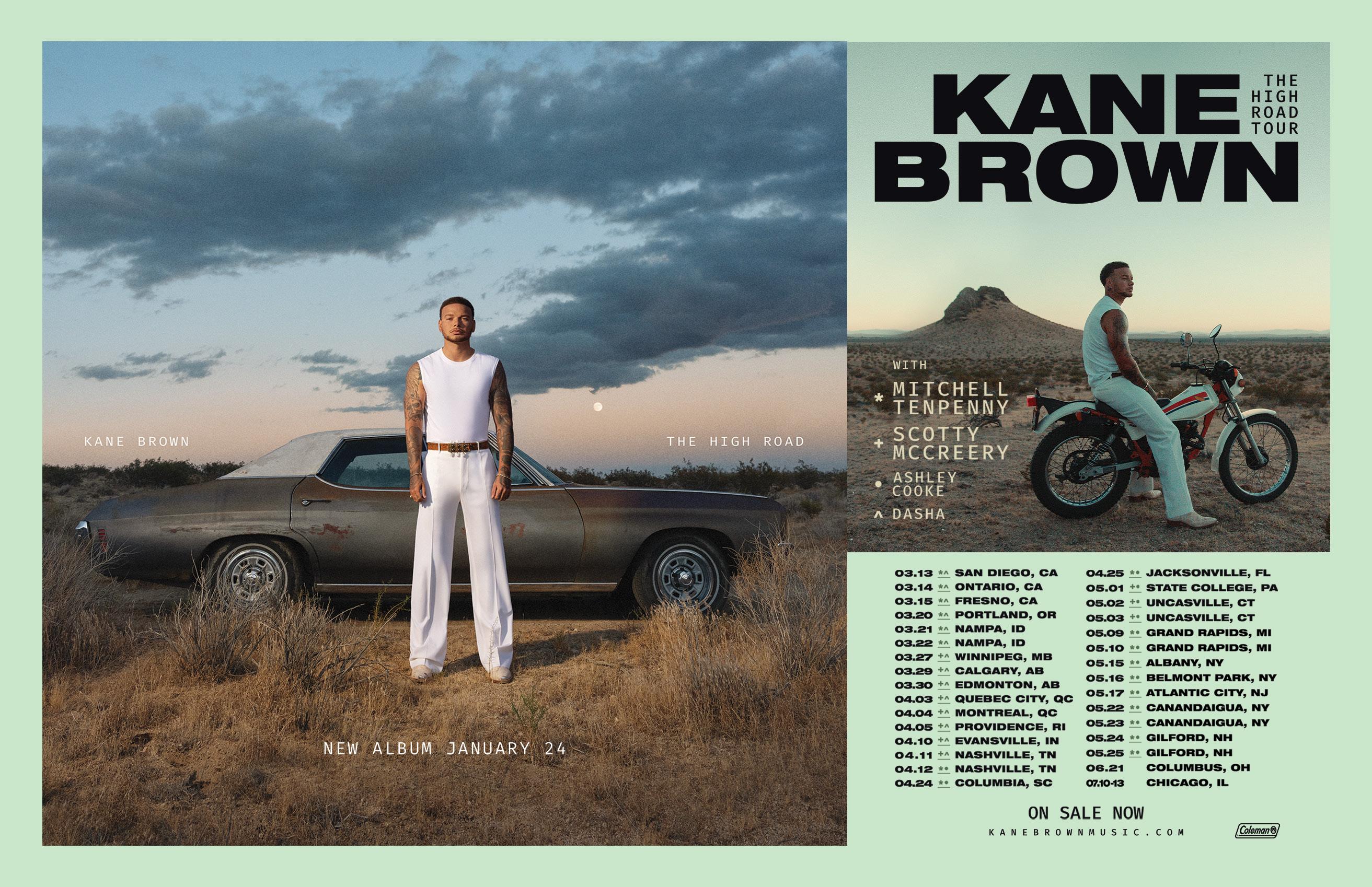
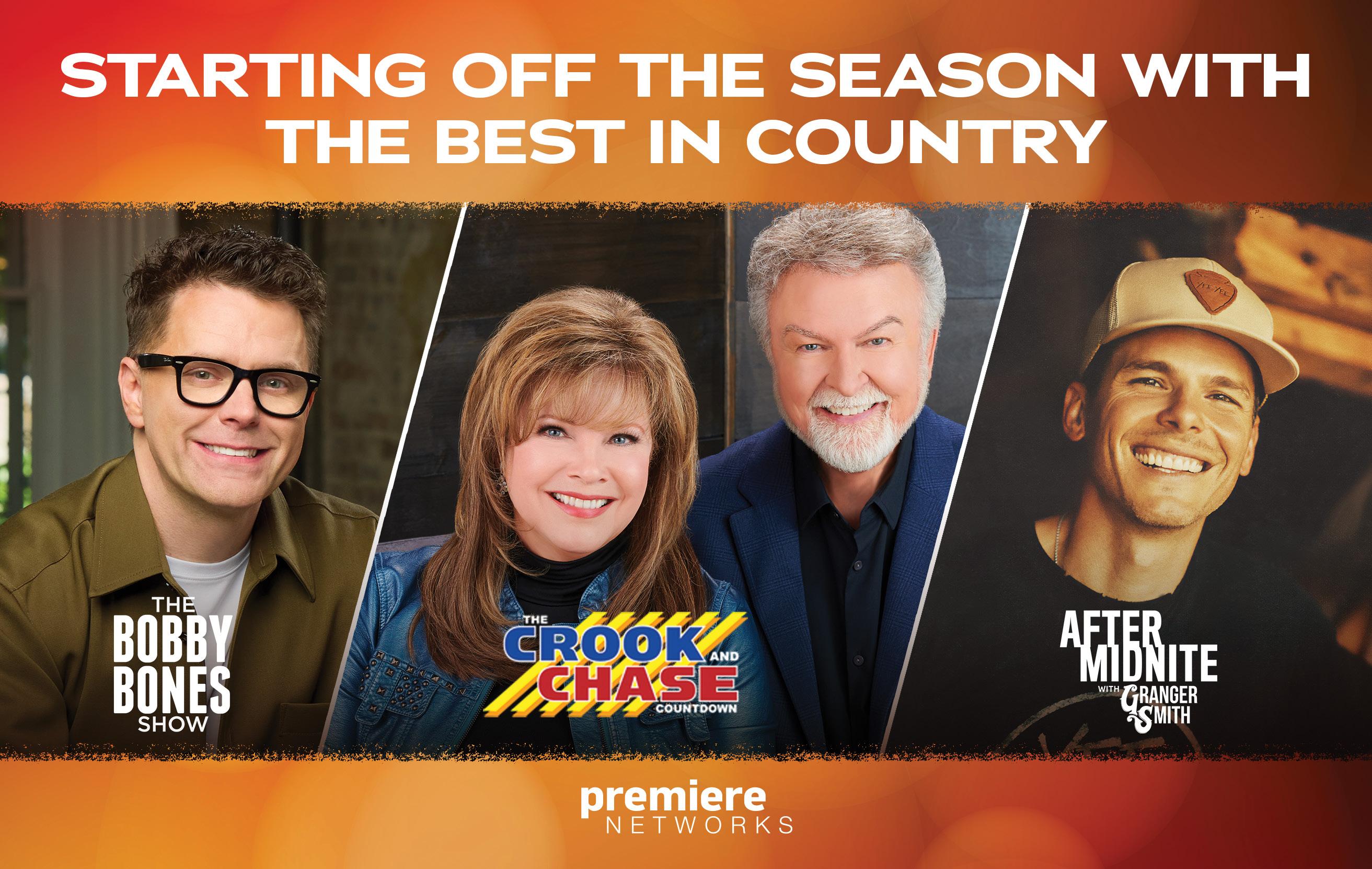

’90s icon Tracy Lawrence proves he has staying power, harnessing his passion for the Country Music industry through his own music, supporting rising stars, and giving back to the community
BY LIBBY GARDNER
TEMPO: You’re a Country Music icon. You gained a lot of momentum in the ’90s, and you’ve maintained that longevity, which many artists have trouble doing. So, how have you done it?
TRACY: I think targeted perseverance, definitely with a career going on 35 years, there’s been some highs and lows. But when you get asked those questions — a lot [of times by] young artists — I think the best advice you can give anybody is just to always continue to be determined. You don’t get into this business for the money or the fame, you get into it because you have a tremendous amount of passion for what you do. And I think as long as you hold on to that, no matter what it throws at you, if you truly love it down in your soul, you’re going to continue to do it.
TEMPO: You have a new EP that came out this summer — Out Here In It. How has your music evolved, and how do you shape it to fit the mainstream?
TRACY: I think I’m still on a musical journey. Since I’m at a place in my career where I’m not actively working radio anymore, all the things that we do are typically around social media and streaming platforms and getting that kind of visibility. When I look at creating a new project, I try really hard to find things that I haven’t done before, and that revolves largely around how I weave those new things into the show because, obviously, I’ve got a body of work that takes priority over a lot of the new stuff. I don’t focus too much on new material in my show. I do play some album cuts from past records, but I focus a lot on the hits. So, I’m looking for things that have a little bit of a different groove or a little bit of a different message, something that’s gonna bend the ear of people on the first listen through ...
TEMPO: So, do you find that more fans want to hear the old stuff?
TRACY: Without a doubt, it still revolves around the big stuff. I mean, I have to play “Alibis” and “Texas Tornado” and “[Paint Me A] Birmingham” and “[Find Out Who Your] Friends [Are].” I mean, there’s just cool things that I have to play every night.
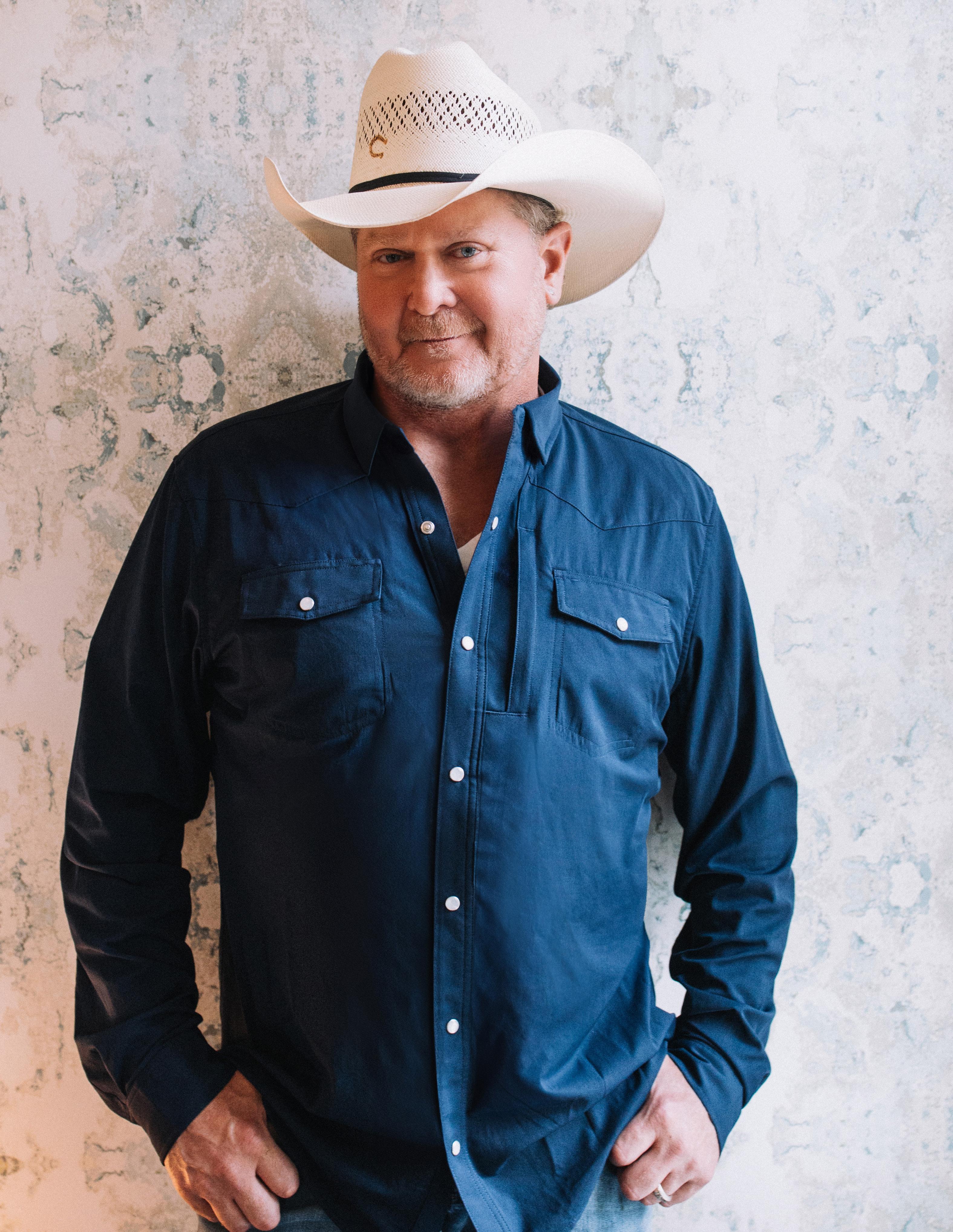
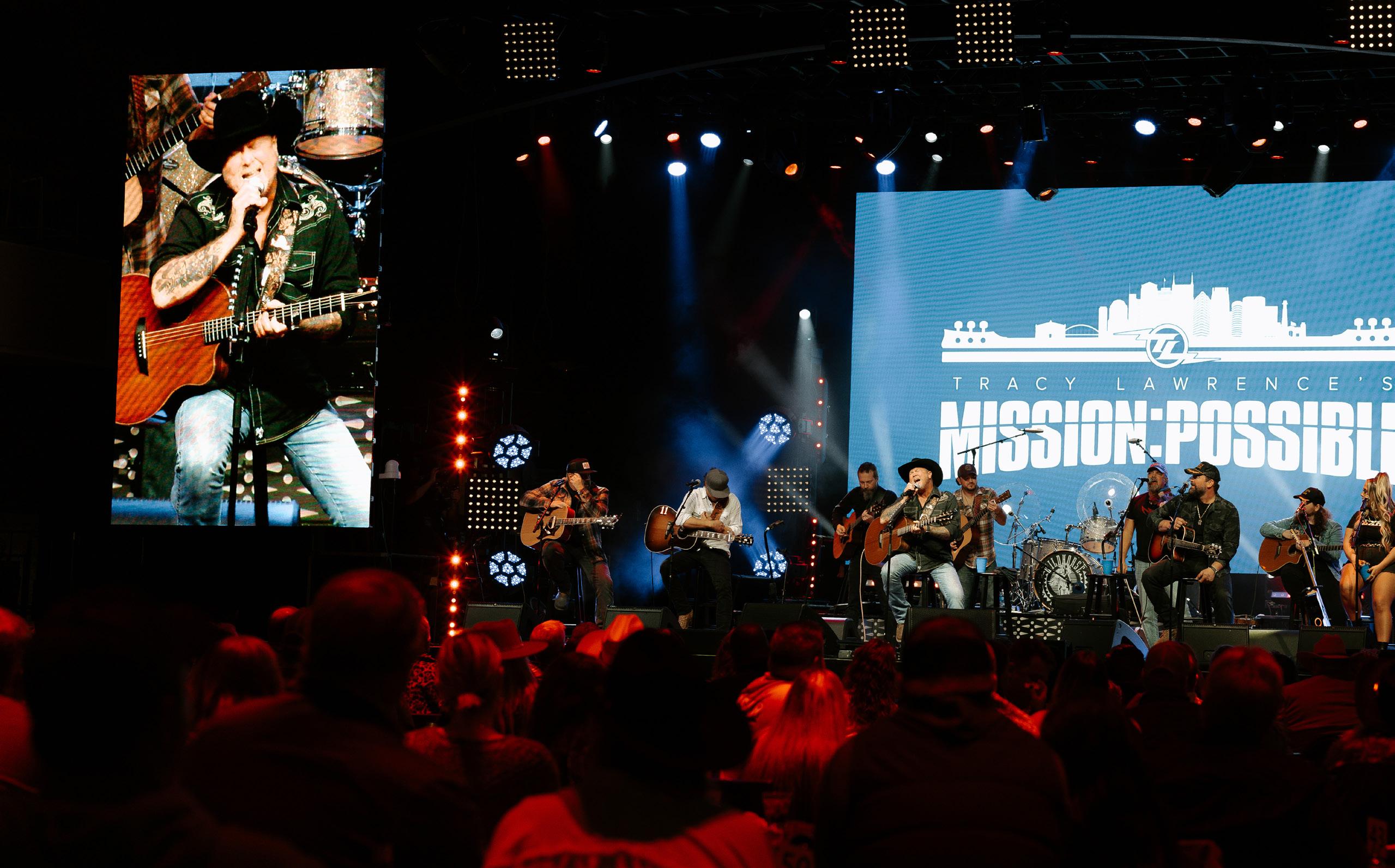
TEMPO: I want to talk a little bit more about your new EP. I’m curious, did you write any of the songs on it? Because I know you’re a big songwriter.
TRACY: I did not. Back in 2020, I released a three-volume album called Hindsight 2020, and I wrote pretty much all the new stuff. It was a 30th anniversary celebration [of my career], so there were a lot of the older hits and a ton of new stuff. I wrote pretty much all of the new stuff that we put on the record, and I literally wrote myself into a writer’s block. And I still haven’t completely come back out of it. I’ve had a few writer sessions along the way and wrote a few things, but nothing that really stood up. So, I knew that we were going out with a rally at the first of the year, and I had to get some new music and start, at least, to get some stuff out there to feed the streaming platforms. I just had to knuckle down and find some outside songs.
But there are so many great songwriters in town. Five or 10 years ago, we had swung away from the more traditional stuff, which is, I mean, that’s the bread and butter of what we did in the ’90s: traditional lyrics with a great hook line and a clever melody. All those things were the kind of music that we all liked, and I think the songwriters are coming back around to a lot of that. I found some really great stuff. I’m hearing a lot of great stuff on the radio.
TEMPO: Where do you think the genre is going since it has changed so much?
TRACY: Well, I think the format’s really healthy. Obviously, there always have been — and always will be — some things that I don’t particularly care for, but that’s been every decade. I can’t say that I liked everything that radio has played on the format the last 30 years, but I think it’s healthy. And I think we are seeing a swing back to more traditional Country. I love hearing young kids like Zach Top that are coming out. I love Corey Kent’s sound. There are some really good artists that are just waiting on that big record to break through and go ultra mainstream. And I think there are several people poised to do it. Lainey Wilson, I think she’s been a catalyst for a lot of it, because she’s very Country and she’s very good at what she does. She’s a great entertainer, and what she’s done in the last three or four years has been absolutely amazing. But she busted her tail to get there too. I think we’re becoming more of a global format than we’ve ever been.
TEMPO:You’ve been really active around this new generation of Country Music artists. You’re not only supporting them through your podcast, you’re also going on the road with them. You were with Riley Green, and you’re playing with Lainey Wilson. How has that experience been for you, and what have you learned from this new generation?
TRACY: The podcast has been very healthy for that because it’s allowed me to start developing some relationships with some of these kids that I don’t know if I would have any other way. I’m just one of the older guys, and usually I do my shows and I go home. I don’t go down to Lower Broad and hang out with everybody anymore. I’m kind of past all that in my life, but I try to find common ground. I think if the world would do that more — instead of looking for the things that divide us and find things that that unite us. That’s really my whole premise. When I sit down with these kids and do interviews and have conversations, we really miss the finer things that we share in common because at the end of the day, every journey is completely different. But at the core of it, there’s a deep passion for the music and a love for what we do. I think that supersedes everything else, and you can really see that. The most successful people in this business, we all share that in common. So, I’m hoping that the things that we’re doing are going to create some lifelong relationships.
TEMPO: I really love what your podcast does because it merges the similarities between this older generation of Country and new generation of Country, but also showcases how the genre has evolved. So, was that the plan going into this podcast? Or was it to build these relationships with these newer artists?
TRACY: A little bit of everything. I didn’t really know exactly what all of it was going to entail. I’ve studied [Joe] Rogan. I was watching a lot of podcasts. I’ve been looking in that direction. I’ve been
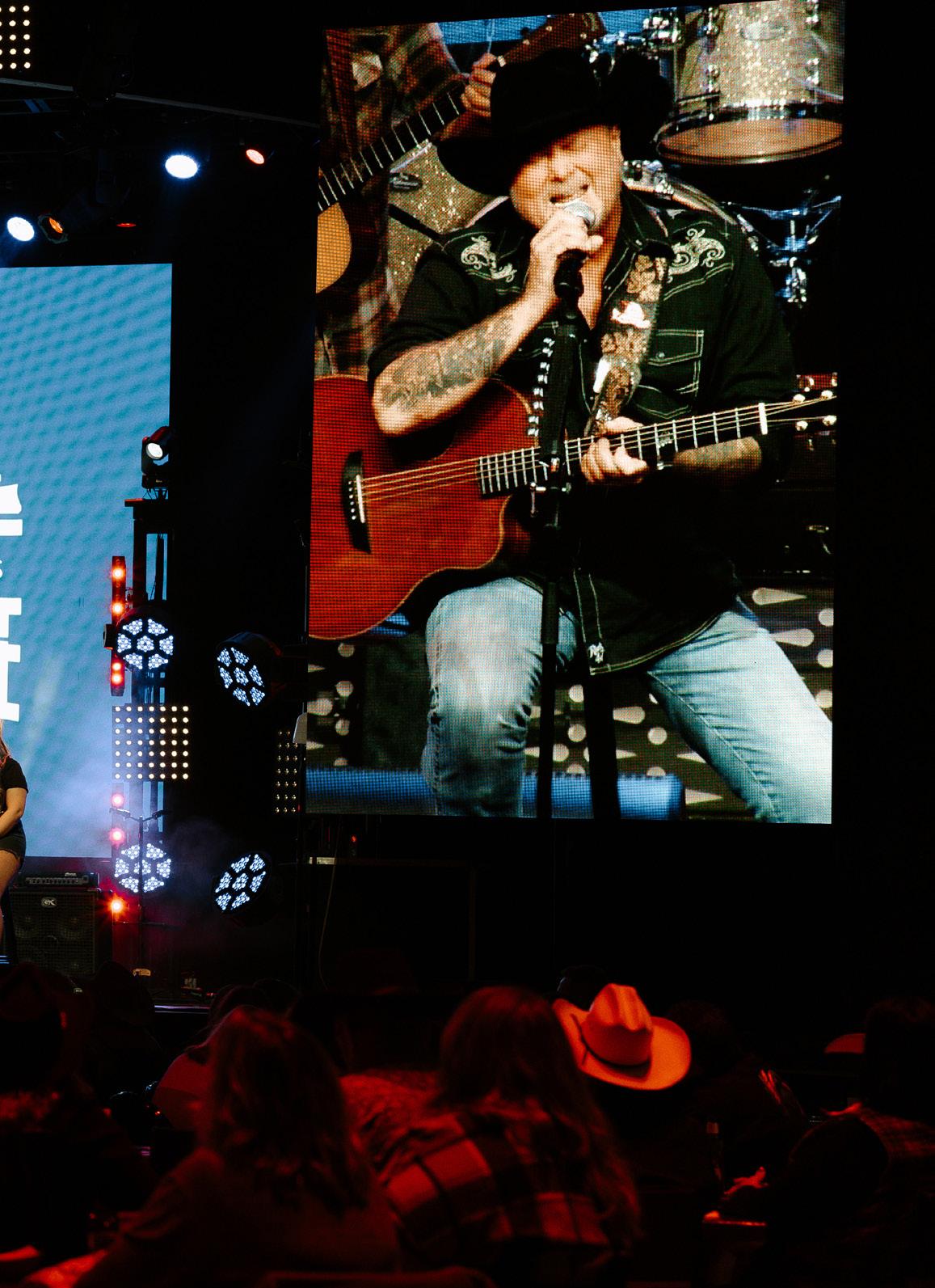
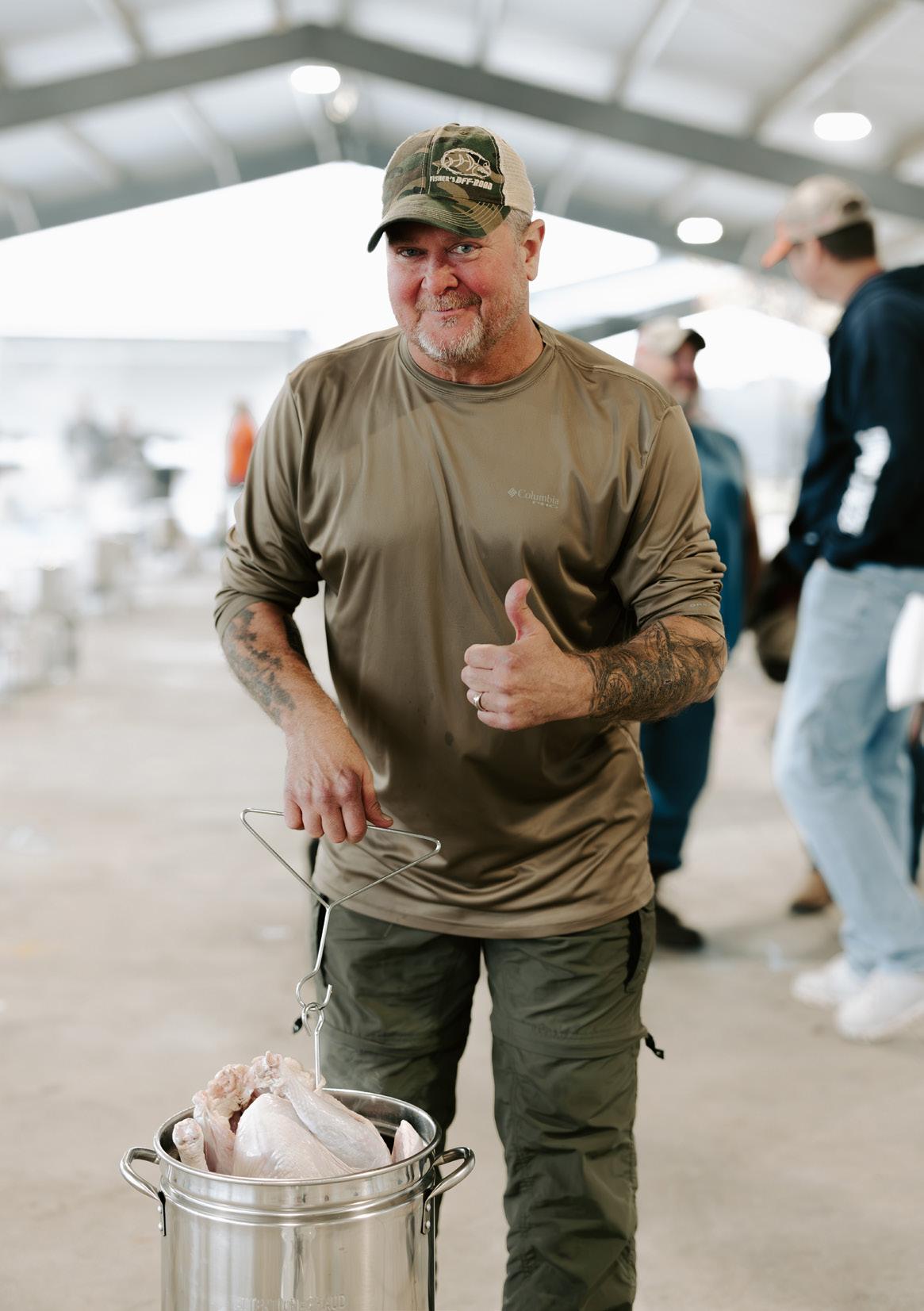
doing a radio show called “Honky Tonkin’.” We’re just finishing up our tenth year, and my frustration with it had been growing because I was kind of limited. I mean, there for the first several years to the last year, we had been pretty much doing, like, ’80s, ’90s, and early 2000s and I wasn’t allowed to bring current artists on because I couldn’t play their new music, because I had such a big panel of radios carrying 175 stations. They wouldn’t let me do that because it affected the charts too much. I wasn’t helping any of the younger artists. We’re just playing the same songs over and over again, and I really wanted to get myself in a situation where I can have more intelligent conversations with a lot of the other artists that I couldn’t have [on the] radio show. I didn’t know how it would take off or how it was going to impact, but it’s actually done really well. I think we’re just now starting to get legs underneath us. Hopefully, it’s going to be able to continue for a long time, because I really do enjoy it, and it’s broadened me as an artist.
TEMPO: You have your 19th Annual Mission: Possible Turkey Fry and Benefit Concert coming up. How did that come to be?
TRACY: I had a couple of buddies of mine, and we would all get together at Thanksgiving ... I’d take orders from a few folks down the street or that were afraid of the deep fryers. And I was like, “This will be a great thing to do for the mission. I’ve never heard of anybody doing anything like this.” We borrowed propane tanks from the church. We used our own fryers. We bought our own turkeys, and I think we cooked a couple of hundred that first year, just setting up in the parking lot of the rescue mission. It was originally just supposed to be an awareness campaign that wasn’t designed to raise money. All we were doing was cooking turkeys to bring some media in to focus on the rescue mission, and, from there, it grew to this thing. As sponsors came on board, we got structured and we got a 501(c) (3), and now we’ve grown from where the first year we did a couple hundred [turkeys], and then the next several years we did 500 to 600. Now, the last two years, the year before, we did 1,200, and last year, we thought we were doing 1,200 but actually did 1,400. We had almost 3,000 turkeys sitting at the Second Harvest Food Bank in the freezer. So, we have all 3,000 turkeys to give away. There’s a lot that goes into this. We’re looking at hundreds of volunteers and networks to be able to take and deliver meals, with people that are going to take 100 at a time and take them to schools and churches during the holidays. It’s grown to this thing that’s just unbelievable. I had no idea or even envisioned what it was going to be and what we’ve done with it. I’m very proud of what we’ve accomplished.
TEMPO: I know that’s one of the many things you do within this community. Why is it important to you to give back to not just the Nashville community but the Country Music community?
TRACY: The simple thing is, I think early on, I carried a lot of guilt … guilt for success, and I’ve always felt like you have to try to balance all that stuff out. I’ve been very blessed in my life. I just feel like I’ve not appreciated it at certain steps of the way, and I do find a great appreciation for it as I’ve gotten older. I believe that we’re supposed to give back to our fellow man … Hopefully, not only will what we do help people that are needy, but it’ll also inspire other people to do the same things. ●
For ACM
Shannon Sanders, the work doesn’t stop here
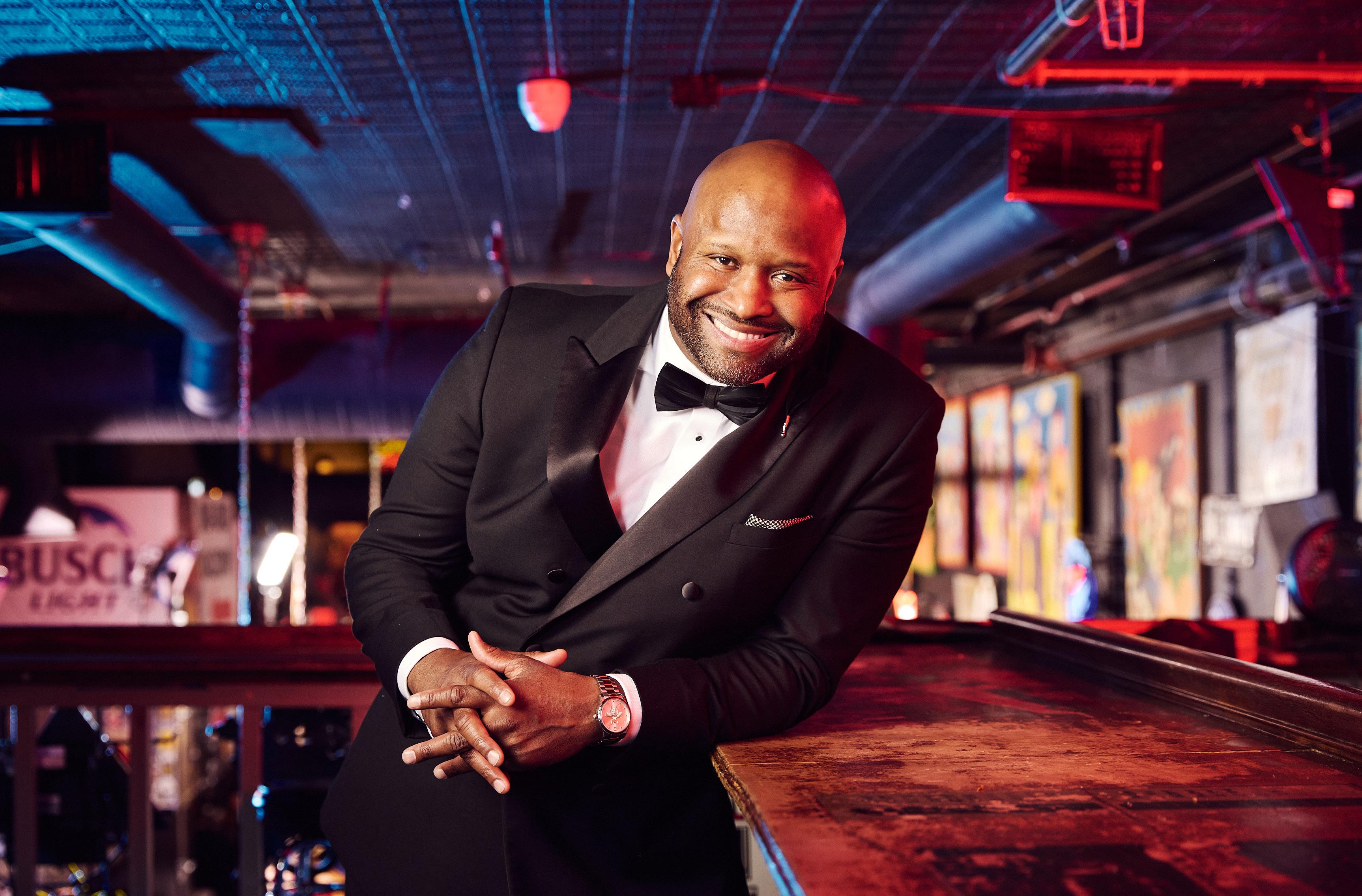
BY LIBBY GARDNER
TEMPO: Throughout your career, you have been an advocate for creators and are known for fostering an equitable community for all musicians. You were honored with the ACM Lift Every Voice Award in August. What does it mean to be recognized for all of your work and advocacy?
SHANNON: It means a lot. It’s interesting because there are so many people I can think of who are doing this work. But it’s humbling, and I accept this award on behalf of all those folks, everyone in the trenches. There are so many people I know who are working hard to make Country Music a more equitable place. It’s an exciting time, and that’s what it means to me.
TEMPO: How do artists like Beyoncé, Shaboozey, Jelly Roll, and Post Malone, who are contributing to and joining the Country Music space, reflect the progress being made in the genre?
SHANNON: I always say, every generation has the right to define the music for themselves. And that’s really what we’re seeing. It’s amazing to watch this generation discover Country Music, make it their own, and build on the past while expressing their unique perspectives. You know, their three chords and their truth.
TEMPO: You’ve accomplished a lot in your career, both for yourself and in helping pave the way for others. What has been your proudest accomplishment?
SHANNON: My proudest accomplishment has been seeing the impact of my advocacy work. Helping others find their voices, particularly those from underrepresented backgrounds, and seeing them thrive in this industry — that’s what I’m most proud of.
TEMPO: What keeps you motivated?
SHANNON: What keeps me motivated is knowing that there’s always more work to be done. I’m driven by the passion of the next generation of artists and the desire to continue creating spaces where all voices are heard and valued.
TEMPO: Why do you continue to stay involved with the Academy of Country Music?
SHANNON: The Academy of Country Music plays a critical role in shaping the future of the genre. I stay involved because I believe in the power of music to bring people together, and the ACM provides a platform to uplift diverse voices, pushing the genre forward while honoring its roots. ●

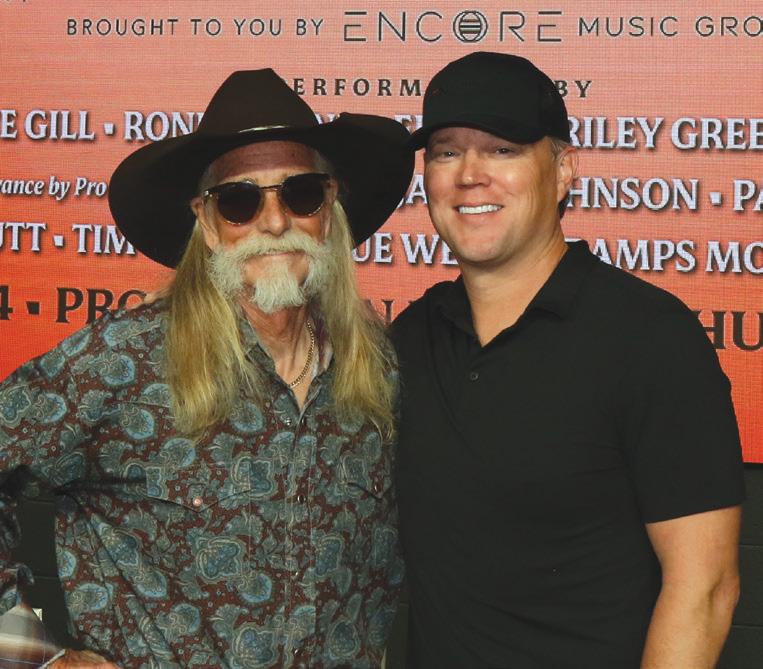


BY TRICIA DESPRES
Born on June 22, 1936, in Brownsville, Texas, Kris Kristofferson made a career as perhaps one of the greatest songwriters in the history of American music on songs such as “Help Me Make It Through the Night,” “Me and Bobby McGee,” and “Sunday Mornin’ Comin’ Down.”
However, Kristofferson’s work as a solo artist was also recognized for signature songs such as “Lovin’ Her Was Easier (Than Anything I’ll Ever Do Again)” and “The Pilgrim, Chapter 33.” But it wasn’t until 1985 that the spotlight shone brightly on him and his vocal talents when he joined with Country Music legends Waylon Jennings, Willie Nelson, and Johnny Cash as part of the Country supergroup The Highwaymen. His work as an actor was also worthy of praise in roles such as Blade and Heaven’s Gate and A Star is Born, for which he won a Golden Globe for Best Performance by an Actor in a Motion Picture – Musical or Comedy. In 2004, Kristofferson was inducted into the Country Music Hall of Fame and in 2013, the Country Music storyteller released
his last album of all-new material Feeling Mortal. At the beginning of 2021, the music legend announced his ultimate retirement from the spotlight.
Kristofferson was recognized by the Academy of Country Music multiple times throughout his career, including the ACM Poet’s Award in 2013, the ACM Cliffie Stone Pioneer Award in 2005, and ACM Single Record of the Year in 1985 for his work with The Highwaymen.
“Kris Kristofferson was an incredible songwriter and performer and represented the Country Music genre to the entire world both through his music and through his acting career,” said Damon Whiteside, CEO of the Academy. “His solo work along with the music of The Highwaymen set a standard for all of Country Music, and his acting in films including A Star Is Born and Songwriter made him beloved by the world at large. Kris Kristofferson was known for telling it like it is as a songwriter, and I’m so thankful we were able to honor him with the ACM Poet’s Award in 2013, which was one of his three ACM Awards. Our thoughts and prayers go out to Kris’ family, along with all of his friends and fans.”
Alan Jackson @officialalanjackson
Thanks for all the inspiration. Rest in Peace @Kristofferson. — AJ
Reba @Reba
What a gentleman, kind soul, and a lover of words. I am so glad I got to meet him and be around him. One of my favorite people. Rest in peace, Kris.

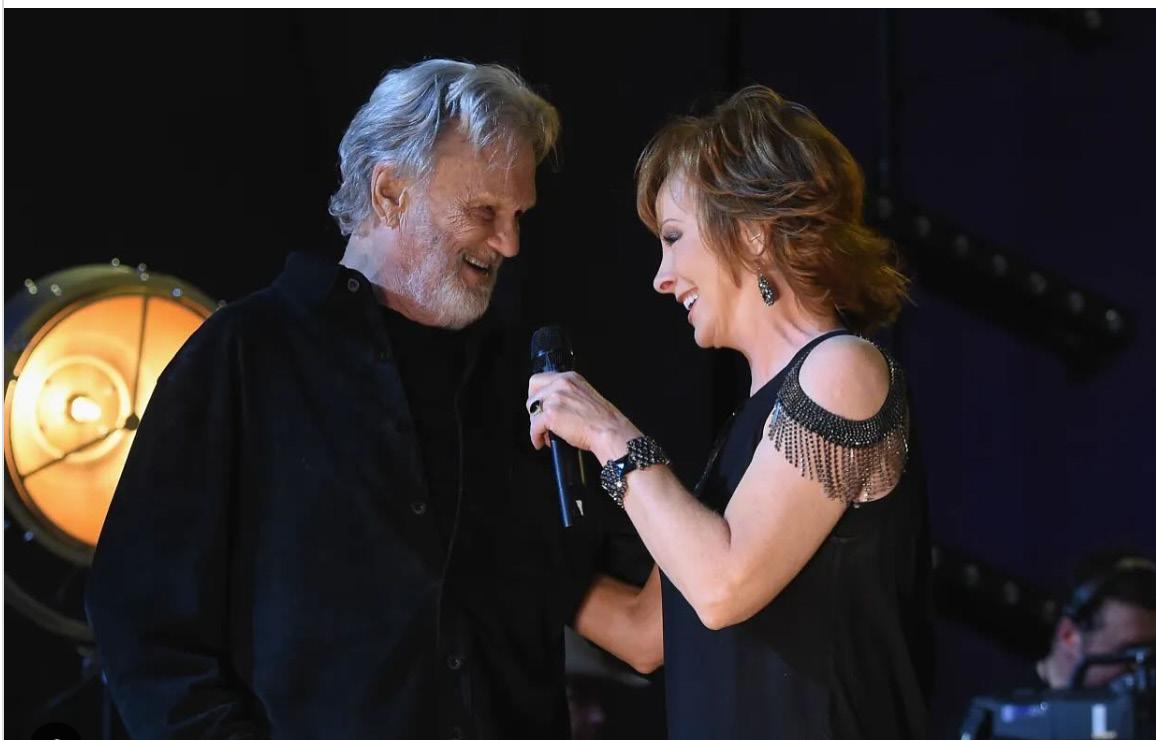

Tim McGraw @thetimmcgraw
Another legend lost … Honored to have witnessed the great @Kristofferson


Sheryl Crow @sherylycrow
It is hard to imagine a world without Kris Kristofferson in it. Knowing and singing with him has been one of the greatest blessings of my life. I feel certain he will be holding court in heaven. RIP Kris. You will be missed.
Miranda Lambert
@mirandalambert
@Kristofferson, thank you for everything. Forever a hero. Your songs will live forever. So thankful I got to share the stage with you. Rest easy.
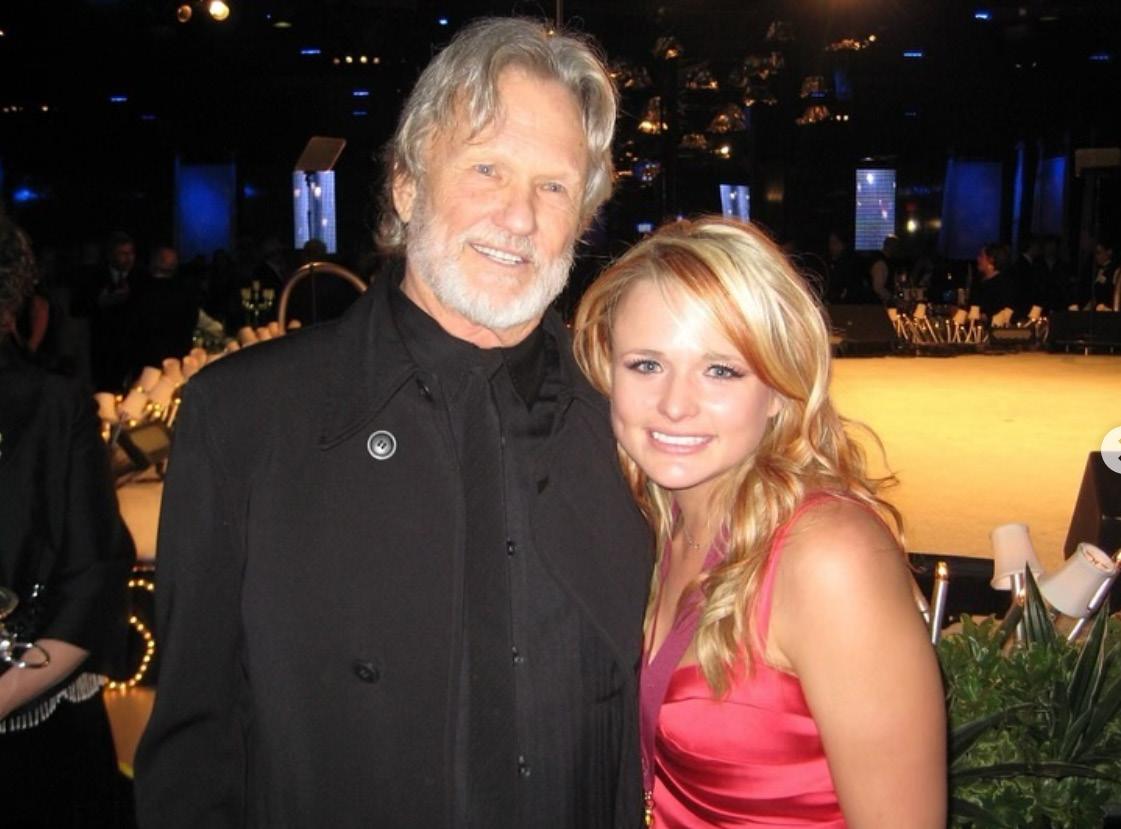

Ashley McBryde
@Ashley McBryde
Thank you for teaching us to write. And for teaching me how to beat the devil. Rest now, Mr. Kristofferson.
Randy Travis
@therandytravis
Some people are just masters in all they do. Kris Kristofferson was head of the class in that department. Behind that boyish smile and gentle demeanor was a genius legend at work. I remained fascinated with his courage, charisma, talent, and kindness all my life. When I recorded “Walk Our Own Road,” with Kris, and “Road to Surrender,” with Kris and @WillieNelsonOfficial, I remember being so captivated that I could hardly sing my parts. Kris was a hero that became a cherished friend to me.
Kris taught by example, lived with purpose, and loved in poetry form. It is a kinder world because Kris walked the roads on this earth. We send our love and gratitude to Lisa and the family for sharing Kris with us; and, we send our prayers for peace as you rest in the reassurance of God’s promise in these days of sadness. The world weeps with you.
And, Kris, go ahead and take those boots you walked all those roads in, to heaven—no one here will ever be able to fill’em! We love you always and will miss you forever... Randy Travis
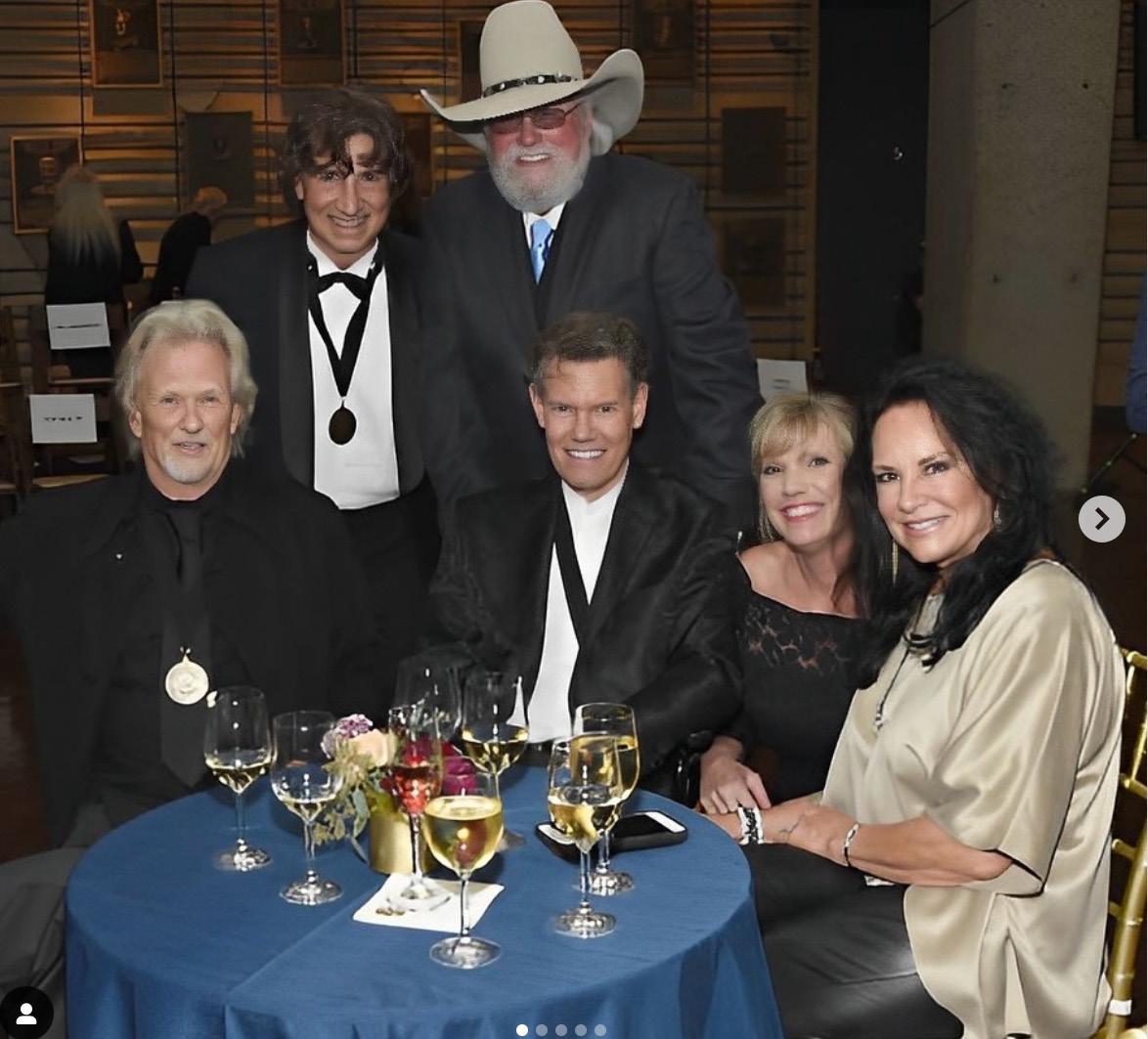
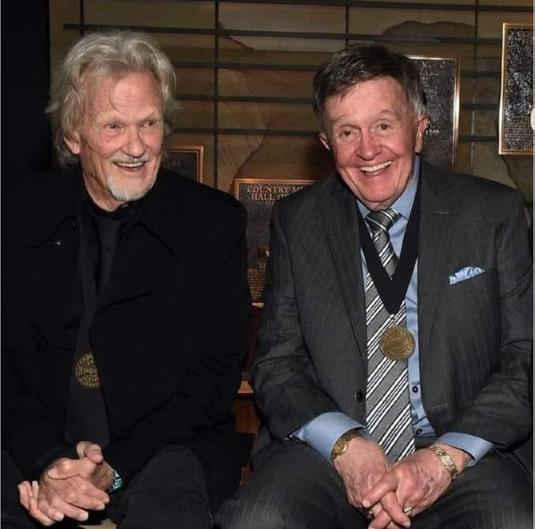
Bill Anderson
@whisperinbillanderson
@Kristofferson was the songwriter’s songwriter. We all looked up to him and wished we could have written with such “elegant simplicity.” His music will live forever, and I will forever treasure the times I got to spend with him. Rest in peace, my friend, knowing that you were the best.
BY CRAIG SHELBURNE
1940–2024
Ken Biddy, a co-founder of Copperfield Music Group, died on August 21, 2024. He was 84.
Biddy grew up in Woodstock, Georgia, and started managing a rockabilly group, The Rock-A-Tones, when he was 18. Biddy later managed singer Ken Springer and moved to Nashville in 1983. He and his business partners launched Copperfield Music Group to support the Chuck Wagon Gang, a popular Southern gospel group that also appealed to Country audiences. Copperfield Music Group’s expansion into publishing proved successful as the company placed a cut on LeAnn Rimes’ 1996 multiplatinum debut album, Blue In addition, Montgomery Gentry charted a Top 20 hit in 1999 with another song in the company’s catalog, “Daddy Won’t Sell the Farm.” Other artists who recorded songs from the Copperfield Music Group canon include Jeff Carson, Craig Morgan, Kenny Rogers, and Lee Ann Womack.
1940–2024
Tommy Cash, a songwriter and recording artist with multiple hits on Epic Records between 1969 and 1973, died on September 13, 2024. He was 84.
Cash was born in Dyess, Arkansas, and found musical inspiration in his older brother, Johnny Cash. Tommy Cash enlisted in the U.S. Army and worked as a D.J. for Armed Forces Radio Network from 1959 to 1961. He struggled to catch on as a recording artist until “Six White Horses,” a 1969 single dedicated to John F. Kennedy, Robert F. Kennedy, and Martin Luther King Jr. was released. Cash maintained his chart presence with two more Top 10 singles, “Rise and Shine” and “One Song Away.” He later released music on Elektra, Monument, and various smaller labels. His songs were recorded by Johnny Cash, Conway Twitty and Loretta Lynn, Kitty Wells, and Faron Young. In later years, he became an avid supporter of the Johnny Cash Museum.
1940–2024
Jimmy Gilmer, a one-time pop star who became a leading music publisher and industry figure, died on September 7, 2024. He was 83.
Gilmer was born in Chicago and raised in Amarillo, Texas. As a performer, he is best known for the 1963 radio smash, “Sugar Shack,” credited to Jimmy Gilmer and The Fireballs. Before that breakout hit, Gilmer was working as a session vocalist in Norman Petty’s studio in Clovis, New Mexico, where Buddy Holly frequently recorded. When The Fireballs flamed out, Gilmer moved to Nashville in 1970 and established himself in music publishing at United Artists Music. In the following years, he held executive roles with CBS Songs, EMI, and SBK, and managed the early career of Brad Paisley. In addition, Gilmer held the position of president of the Nashville chapter of The Recording Academy from 1989 to 1991. He graduated from the Leadership Music program in 1992.
1944–2024
Will Jennings, the accomplished lyricist who received ACM nominations for Single and Song of the Year for Tim McGraw’s “Please Remember Me,” died on September 6, 2024. He was 80.
Jennings wrote “Please Remember Me” with Rodney Crowell, who released his version in 1995. McGraw earned a five-week No. 1 hit in 1999 with his soaring rendition. Faith Hill included Jennings’ “Where Are You Christmas?” on her 2000 holiday album. An East Texas native, Jennings landed his first No. 1 Country hit in 1975 with “Feelins’” by Conway Twitty and Loretta Lynn. He was inducted into the Nashville Songwriters Hall of Fame in 2013. His incredible pop catalog includes Eric Clapton’s “Tears in Heaven,” Joe Cocker and Jennifer Warnes’ “Up Where We Belong,” Celine Dion’s “My Heart Will Go On,” Whitney Houston’s “Didn’t We Almost Have It All,” Barry Manilow’s “Looks Like We Made It,” and Steve Winwood’s “Higher Love.”
1947-2024
Owsley Manier, most notably known as one of the co-founders of Nashville nightclub, the Exit/In, passed away on October 1, 2024. He was 77.
Alongside co-founder and business partner, Brugh Reynolds, Mainer opened the doors of the storied music venue in 1971 after a stint serving in the US Army. The initial idea for the venue was to be a listening room for rising Nashville songwriters, yet in just a couple of years, it expanded to a 500-person capacity rock club that has since served as a central part of the city’s musical DNA. Welcoming countless acts across its five-decades-long tenure, the Exit/In stage has been graced by The Allman Brothers, Jimmy Buffett, Johnny Cash, Charlie Daniels, Emmylou Harris, Billy Joel, Willie Nelson, John Prine, Linda Ronstadt, Hank Williams Jr., and so many others.
While Manier and Reynolds’ partnership only lasted until 1975, the venue has remained an enduring fixture over the past 53 years, being listed on the National Register of Historic Places in 2023. —LYDIA FARTHING
1949–2024
Mark Moffatt, an early champion for Keith Urban and a leader in the Americana music community, died on September 6, 2024. He was 74.
Moffatt grew up in a small town in Queensland, Australia, fascinated by The Beatles. After four years of developing his producing skills in a London studio, Moffatt returned to Australia, where he encountered an unknown band called The Saints and recorded their 1976 punk smash, “(I’m) Stranded.” He produced many of Australia’s top rock artists in the 1980s, then moved to Nashville in 1996 after a call from Barry Coburn, an Australian who had established himself on Music Row. Moffatt was tasked with guiding the early career of Keith Urban, who had signed a publishing deal with Coburn’s Ten Ten Music Group. Around the same time, Moffatt took an interest in the fledgling Americana Music Association and remained actively involved with the organization throughout his career.
1942–2024
Hugh Prestwood, the songwriter who captured the enduring power of music in “The Song Remembers When,” died on September 22, 2024. He was 82.
Born and raised in El Paso, Texas, Prestwood graduated from the University of Texas with an English degree and later moved to New York City to establish a music career. After earning cuts with Jackie DeShannon and Judy Collins in the late 1970s, Prestwood delivered a 1984 chart-topping Country hit, Crystal Gayle’s “The Sound of Goodbye.” In 1987, Michael Johnson reached No. 1 with Prestwood’s “The Moon Is Still Over Her Shoulder.” Throughout the 1990s, his songs captured the interest of Country radio: Shenandoah’s “Ghost in This House” and Randy Travis’ “Hard Rock Bottom of Your Heart” in 1990, Trisha Yearwood’s “The Song Remembers When” in 1993, and Collin Raye’s “On the Verge” in 1997. Prestwood was inducted into the Nashville Songwriters Hall of Fame in 2006.
1947–2024
Billy Sherrill, an audio engineer who worked with Kenny Chesney, Kenny Rogers, and the Grand Ole Opry, died on September 10, 2024. He was 77.
Sherrill grew up in Paducah, Kentucky, and recording an album with his band in Benton, Kentucky, led to an interest in studio work. Upon moving to Nashville after college, Sherrill worked with engineer Thomas Wayne to open the SoundShop recording studio, where he met producer Larry Butler. After teaming up for Jean Shepard’s 1973 hit, “Slippin’ Away,” Sherrill and Butler maintained a close working relationship, particularly on Kenny Rogers’ biggest hits. Working independently in the 1990s, Sherrill engineered the Dixie Chicks’ Fly album and Kenny Chesney’s “She Thinks My Tractor’s Sexy.” He also mixed sound at the Grand Ole Opry for several years. In 2019, Sherrill was inducted into the Musicians Hall of Fame and accepted the Lifetime Achievement Award from the Audio Engineering Society.
1945–2024
JD Souther, who wrote numerous classic songs for the Eagles and Linda Ronstadt, died on September 17, 2024. He was 78.
Souther grew up in Amarillo, Texas, and moved to Los Angeles in the late 1960s. He soon became part of a core group of singers and songwriters that redefined the pop sound of Southern California. Linda Ronstadt’s rendition of Souther’s “Faithless Love” helped her win her first ACM Award for 1974 Most Promising Female Vocalist. In 1980, he and Ronstadt placed “Hearts Against the Wind” on the Urban Cowboy soundtrack, which was named the 1980 ACM Album of the Year. Souther’s compositions for the Eagles include “Best of My Love,” “New Kid in Town,” “Heartache Tonight” and “The Sad Café.” Souther’s songwriting also appears on George Strait’s Pure Country, Common Thread: The Songs of the Eagles and Dixie Chicks’ Wide Open Spaces, the 1998 ACM Album of the Year.
1934–2024
Pete Wade, a versatile electric guitarist whose studio work spanned decades, died on August 27, 2024. He was 89.
Wade started playing guitar at a young age and befriended several touring musicians when his band opened their concerts in his hometown of Norfolk, Virginia. Encouraged by Don Helms and Jerry Rivers, formerly of Hank Williams’ Drifting Cowboys, Wade moved to Nashville at 19 years old and landed a job with Ray Price within two weeks. Wade’s electric tic-tac guitar work on Price’s 1956 hit “Crazy Arms,” complemented by the smooth steel guitar, helped define the style known as the Ray Price shuffle. In 1967, after making ends meet by backing artists on the road, pitching songs for Starday, and playing in the Grand Ole Opry band, Wade focused on studio work. His countless studio credits include Tanya Tucker’s “Delta Dawn” and Reba McEntire’s “Can’t Even Get the Blues.”
1932–2024
Billy Edd Wheeler, best remembered for writing “Jackson” and “Coward of the County,” died on September 16, 2024. He was 91.
Wheeler developed his career with appearances on the “WWVA Jamboree” radio show, broadcast from his home state of West Virginia, and on television programs such as “Today” and “The Merv Griffin Show.” Pat Boone and the Kingston Trio were among the first artists to record his songs, though he also found brief popularity as a solo act with the 1963 Country single, “Ode to the Little Brown Shack Out Back.”
Johnny Cash and June Carter released “Jackson” in 1967 and won a Grammy for their recording. Other notable cuts include Elvis Presley’s “It’s Midnight,” a Top 10 Country hit in 1975, and Kenny Rogers’ “Coward of the County,” a nominee for 1979 ACM Single Record of the Year. Wheeler was inducted into the Nashville Songwriters Hall of Fame in 2000.
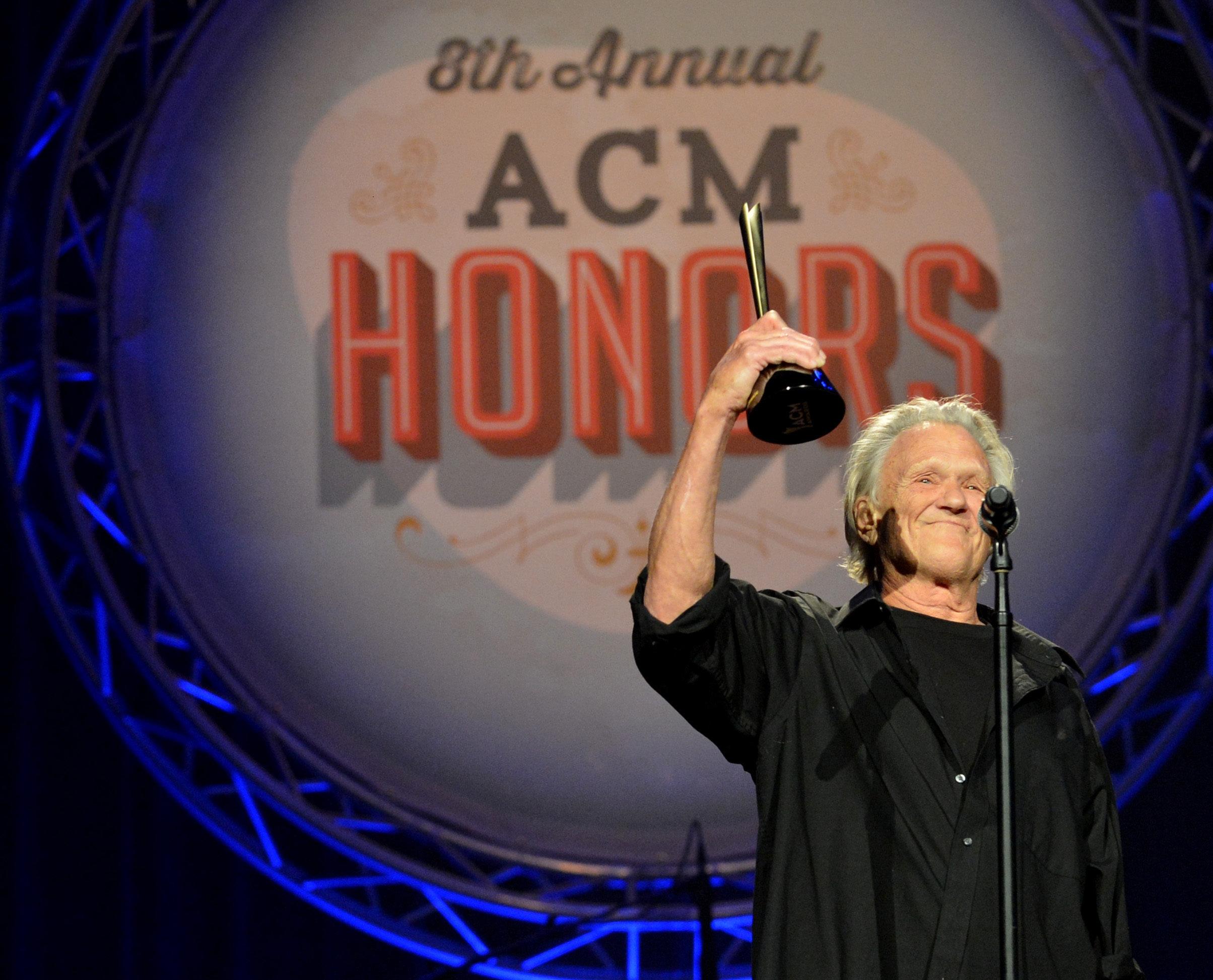
8th ACM Honors
Ryman Auditorium | September 9, 2014
Kris Kristofferson accepts the ACM Poet’s Award at the 8th ACM Honors at the Ryman Auditorium in Nashville, Tennessee.

